Welcome To The General RV Blog!
Because RVing Is Awesome…

First Time RV Buying Guide: Advice to Know Before you Buy an RV
Last Updated on July 26, 2022 by Christina
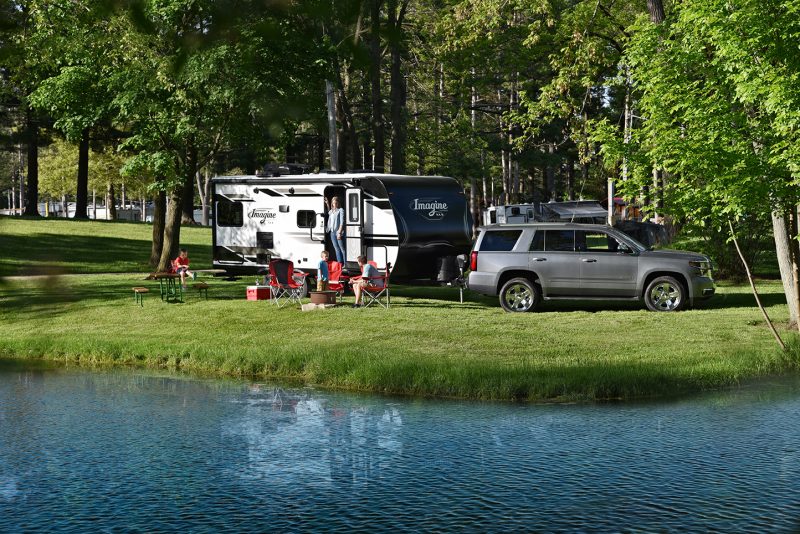
Campfire coffee in the morning and sleeping under the stars at night. The freedom to go wherever, whenever. Adventure-filled RV getaways. Families living full time on the road. Images like these shared widely on social media make RV ownership seem like a dream come true. But they leave out many of the realities of RVing: mapping out campgrounds, emptying tanks, and regular maintenance. Of course RVing is an incredible way to make new memories, but there are several things to consider before you buy an RV.
Thinking about buying an RV? Read this advice first.
If you’re just beginning your RV adventure, you’re not alone. More than 72 million Americans plan on taking an RV trip in the next year. There’s no right or wrong way to go RVing but the majority of people buy an RV to explore and travel in comfort.
Traveling near or far, to national parks or RV resorts, there are many options for you to have fun. Your RV can take you to new places for hiking, kayaking, fishing, or other outdoor activities. Or simply relax in the great outdoors and get away from the city. The possibilities are endless, you just have to first decide if RV ownership is right for you. To help you do that, we’ve compiled this list of all the most important questions to ask yourself before you buy an RV.
How will I use my RV? How often will I go RVing?
When you consider purchasing an RV , you need to understand how much you will realistically use your RV. Things like work, school schedules, or other family commitments may affect how often you can get away.
Many RV owners use their RV primarily for summer vacations with family. Avid RVers may camp more consistently throughout the season (or extend their travels into fall) while more causal campers plan mainly weekend getaways and short trips.
On the other hand, a lot of people who are called “snowbirds” use their RV to escape the winter months. These RVers “migrate” away from the cold by staying in the warmer southern states. Their RVs serve as a secondary home and they may stay in the same location for weeks or even months at a time.
RV owners can also be categorized as adventure seekers. These RVers want to explore the world every chance they can and they use their RV to do just that. These individuals take every moment they can to plan trips filled with outdoor activities.
You might even be considering full-time RV living . Full-time RVers work on the road and embrace the nomad style of living 365 days a year. These RVers may stay in one area for a couple weeks or months, but they never truly settle down in one place.
Who will I go RVing with?
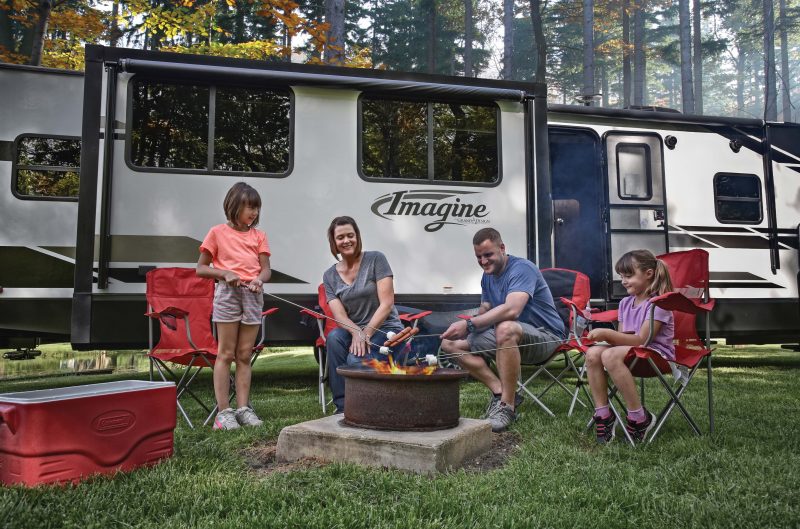
Who you are traveling with will also greatly impact your decisions when it comes to choosing an RV type and floorplan. If you plan to travel solo, there are many great small RVs for single person camping. If you want to camp with your family, you’ll need a family-sized RV. Consider how many beds and how much room you’ll need to be comfortable. Cramped camping wears on a family. Pets are also very important members of your family to consider when choosing an RV. Big dogs need room to stretch, so a popup camper or teardrop trailer may not the best RV choice in that case.
What’s my camping style? Where do I want to camp?
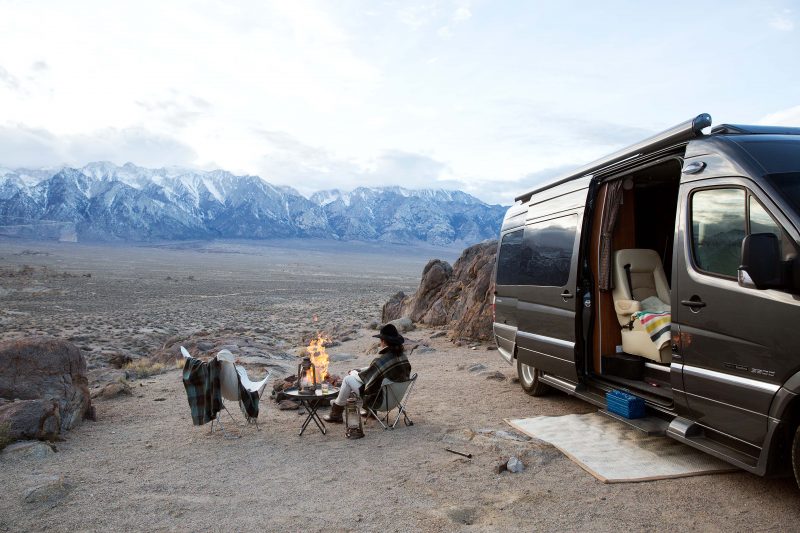
After you have an idea of how often you will be camping and who you might be camping with, ask yourself how you want to be camping. This will help you figure out what features or amenities are must-haves vs. nice to have in your RV.
Are you a rustic camper who wants to take the road less traveled? Boondocking is best done with an RV that offers more maneuverability to reach remote destinations. You might also consider adventure-ready RVs equipped for off-road roaming. RVs with solar power options and larger water tanks can help you stay off grid longer, too.
Perhaps you’d rather feel like you’re staying at a world-class hotel during your RV travels. Luxury Class A diesel RVs might be perfect for you, and you’ll want to park yours at an RV resort. RV resorts offer full amenities and plenty of activities to do throughout your stay. They are equipped with modern conveniences and everything you need to enjoy a glamping vacation.
Would you like to experience more of the outdoors while still having access to basic amenities? Many public campgrounds and parks offer a variety of amenities including hookups for electricity and water so you can go camping without completely roughing it.
The bottom line is this: There are a lot of camping styles and even more RVs to choose from, so being conscious of where you could be camping can help you choose which RV is right for you.
What activities will I be doing while RVing?
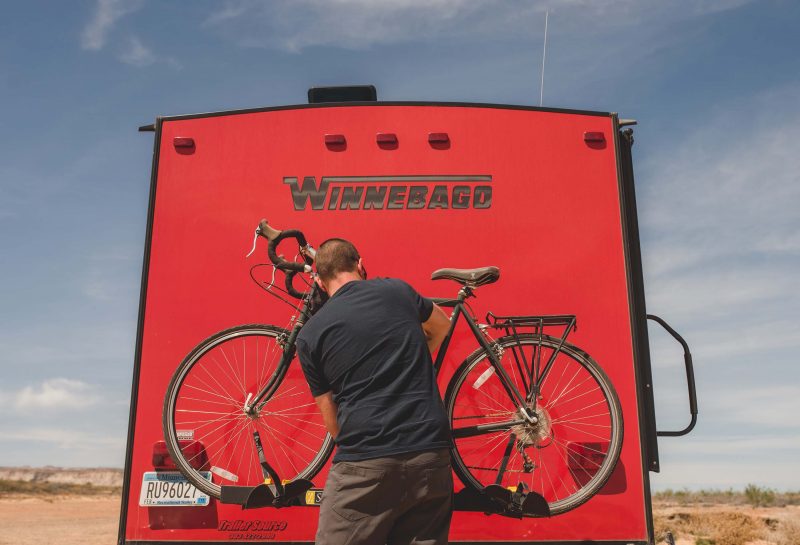
Relaxing getaways and sightseeing are great activities that don’t require much storage space or equipment, but if you plan to go kayaking, fishing, or take your favorite 4x4s or dirt bikes on the trail, storage is key to camping comfortably. Understanding what you want to do while you RV will help determine your needs – whether that’s a toyhauler RV with a garage or a motorhome with towing capacity.
Another thing to ask yourself is if you will be working from your RV while you are on the road. Many RVs have floorplans with convertible office space areas. It’s also important to set clear expectations with yourself and your RV style because if the sole purpose of buying your RV is to get away from work life, working while on the road can quickly diminish your enjoyment of camping and RVing.
Which RV is the best RV for me?
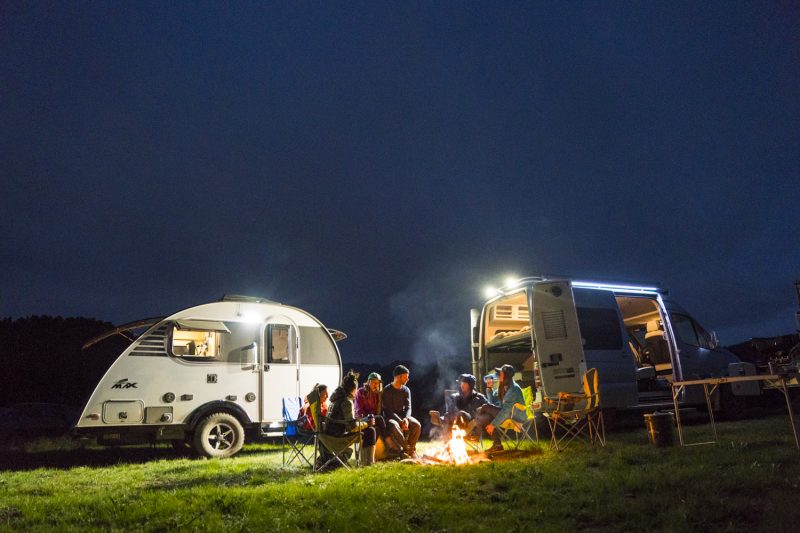
Types of RVs
Once you understand your style of camping, the next step is to figure out what type of RV you want to camp with. It may seem like there are a million different options and types of RVs, but the first thing to ask yourself is if you want to tow your RV or drive your RV.
- Towable RVs are towed behind your vehicle. This type includes pop-up campers , teardrop trailers , travel trailers , fifth wheels , and toy haulers .
- Motorhomes are RVs with a cab and engine. Class A RV , Class B RV , and Class C RV are different types of RV motorhomes. Motorhomes can be gas or diesel powered depending on the brand and model. They can also feature a garage area for off road vehicles, golf carts, and other gear.
You can learn more about RV types and some of the best uses for each type in our RV Guide articles .
To help you further narrow down your search for the best RV, you should also ask yourself what you’ll physically be able to set up. Some people breeze through setting up pop-up campers, but they require some assembly and strength. Height and storage is also a big factor in some taller RVs. Fifth wheels have sprawling storage, but for shorter people, some storage is just too high without a step ladder. These things are often overlooked, but understanding what you might struggle with in an RV will help determine what RV you don’t want and the headaches that could potentially come with it later.
Which RV brand is the best?
After familiarizing yourself with the types of RVs and which ones best suit you, it’s time to research RV brands and floorplans. Learning about special features and benefits some RV brands offer over others will help narrow down your RV search. For instance, NeXus RV specializes in Class C , Super C – Diesel and Class B+ motorhomes . On the other end of the RV brands, Xtreme Outdoors specializes in the compact teardrop trailers. A lot of RV brands offer a huge variety of floorplan options with features unique to them.
Attending an RV show is a great way to learn about RVs and brands. You’ll be able to see RVs in person and walk through the floorplans to understand if the RV fits your needs. RV shows are inexpensive to go to (in fact, many are free!) and offer great learning opportunities. There are RV dealers , campgrounds, and experienced RVers there to chat with and ask questions. If you’re thinking about attending an RV show, check out how to make the most of a show and tips that will help you prepare for an RV show with confidence!
Looking at online forums and blogs about the RVs you are interested in is a good way to get honest reviews. A ton of bloggers and forums offer input on the things they love and hate about their RVs which can help guide your decision on if that RV is best for you, what you want to do and where you want to go. The RV community is full of wonderfully helpful and honest individuals.
Additionally, joining a Facebook group will let you connect with other RVers who are knowledgeable about the lifestyle. Groups will oftentimes post discussions about RVs and even how to buy or sell an RV . There are a variety of groups for specific kinds of RVers like snowbirds or specific types of RVs. This is a great way to learn more and make friends.
Budgeting for Buying an RV
How much does an rv cost.
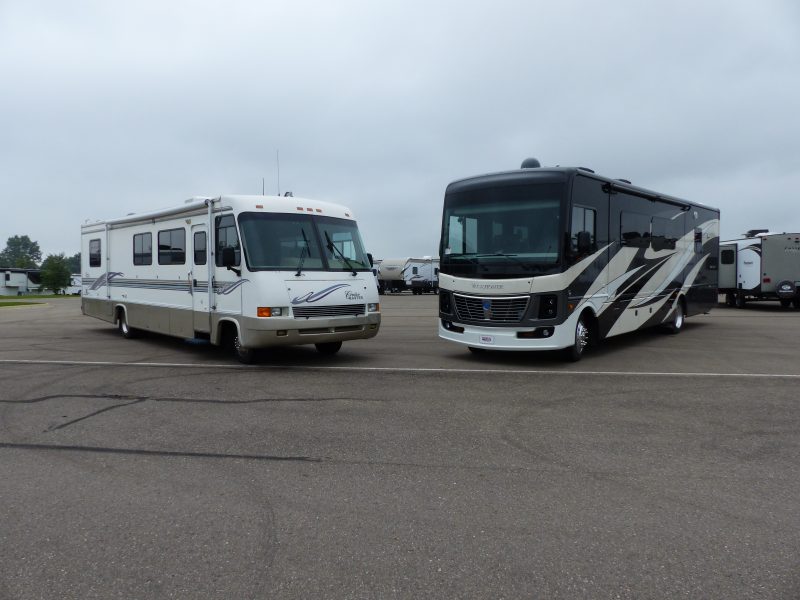
Figuring out how much you want to spend and a monthly payment you’re comfortable with will determine which RVs you can afford. Once you understand your budget, it will be easier to narrow down your choices and what features are most important to have.
New RVs can cost anywhere from $10,000 to over $200,000 for modestly priced towables and motorhomes. Diesel motorhomes can cost upwards of $300,000 for a high-end coach with residential features. Generally speaking, the upfront costs and maintenance expenses of motorhomes are more expensive than travel trailers, so budget accordingly.
If you are considering a towable RV, understanding your vehicle’s towing capacity will narrow down your search in an RV. Towing an RV that is too heavy can cause:
- Heavy strain on your vehicle’s engine and transmission
- Accelerated wear on your brakes
- Less control of the RV which can lead to fish tailing and trouble steering
- Tires can overheat and wear quickly, causing blown tires
Finding an RV that your vehicle can handle will help prevent accidents on the road. It will also keep your vehicle out of the shop and on the road for more RV adventures. If your vehicle cannot tow an RV that you have in mind, be conscious of upgrading your vehicle and how that will affect your RV budget.
Used RV prices vary. The year, make, and condition of the RV greatly impacts the price. One of the risks of purchasing a used RV is that there may be damage that’s not easily visible. Asking how often the RV was used, cared for, and stored are telltale signs of a good or bad RV. Before buying a used RV: make sure everything works, thoroughly check for signs of damage like water spots inside and outside, and ask for a test drive if you’re considering a used motorhome. These are good things to double check whether you are purchasing from a private seller or even from an RV dealership to make sure you are getting a reliable RV.
How will I pay for my RV?
Some people pay for their RV in cash but many others finance their RV purchase. If you fall into the latter group, you’ll want to understand your financing options to stay within your budget. Many RV dealerships work with national and regional banks as well as credit unions to provide financing options. It is important to do your research to make sure you are getting the best deal possible. Putting a down payment on an RV can help lower your monthly payments, too.
How will I insure my RV?
Having RV insurance is a must for RV owners. After all, your RV is your home away from home and disasters can happen. Similar to homeowners insurance, RV insurance helps protect you against the unexpected. However, it is important to note that RV insurance is more specialized than standard home or vehicle policies. Choose a reputable insurance agency and licensed insurance agent to help you create a policy that’s tailored to meet your needs.
What should I expect when it comes to RV maintenance?
RV maintenance is another cost that you must factor into your budget when buying an RV. Just like a house, RVs require regular preventative maintenance as well as occasional repairs. RV brands provide a schedule for recommended preventative maintenance services; this is typically found in the owner’s manual.
Additionally, there are other factors to consider. If you are only using your RV during the warmer months, you’ll have to add in costs of winterization for the off season. If you need service on your motorhome and must leave the RV at a shop for repairs, you’ll need a place to sleep or game plan if it is going to take a few days if you are living in your RV full time or far away from home. These are just a few examples to help you plan and budget.
How will I store my RV?
Investing in proper RV storage is also crucial if you’re not using your RV for long periods of time or for the winter months. Proper storage prevents wear and tear on your RV, extending its lifespan. Storing your RV can get pricey, especially if you want a temperature controlled, covered storage area for it. If that’s out of your budget, it is best to store your RV under an RV cover or covered parking spot. RV covers can prevent harsh Mother Nature from damaging your RV with sun, rain, snow, and other natural events. You may also want to invest in a hitch lock or wheel lock for protection against theft if you are storing it in a storage lot.
Where will I buy my RV?
Dealerships are a great way to purchase an RV. RV dealerships have greater inventory options compared to private sellers. Most dealerships carry new and used models, but dealerships will not carry every brand of RV. You’ll want to do some research before you visit the dealership lot to make sure they carry the brands you’re looking for. Additionally, an RV dealership can provide a comprehensive demonstration of how to use your RV before you take it home. This is a great opportunity to learn your RV and how to troubleshoot problems you might encounter while camping. Plus, RV dealerships often offer RV parts and accessories for sale and service facilities so you can bring your RV back for preventative maintenance and repairs. This can be very convenient for RV owners.
Private sellers are another option for purchasing a used RV. While you can save a significant amount of money, there is some risk involved. Consider it a red flag if the seller does not have records of their maintenance or provides little information. There may also be damage that’s are not readily visible and can be costly later on. The RV market is very hot right now and keeping an eye out for the perfect listing can be challenging. Patience is key to finding a quality RV from a private seller.
RV shows are a great way to find the perfect floorplan on the newest RVs. An RV show is a great opportunity to get the newest models at special prices. You might feel pressured to buy at an RV show because everything is so fast moving and fun, but if you are not 100% certain about the RV then don’t buy it. The prices are great, but if it’s not the right RV for you there are always other opportunities.
Ready to begin your RV adventure?
Once you’ve asked yourself all these questions and are certain the RV lifestyle is right for you, it’s time to begin your adventure! Browse thousands of RVs for sale in our Virtual Showroom or visit a General RV dealership near you to explore RV options. If you have any questions, our friendly team is here to help.
Happy exploring!
- How to Tie a Tie
- Best Coffee Beans
- How to Shape a Beard
- Best Sweaters for Men
- Most Expensive Cognac
- Monos vs Away Luggage
- Best Luxury Hotel Chains
- Fastest Cars in the World
- Ernest Hemingway Books
- What Does CBD Feel Like?
- Canada Goose Alternatives
- Fastest Motorcycles in the World
The Manual may earn a commission when you buy through links on our site.
RV shopping 101: A simple, yet complete guide for first-time RV, camper, and travel trailer buyers
Shopping rvs and travel trailers isn't easy. here's everything to consider to find the right one for you.
If you’re among the majority of prospective first-time RV buyers, welcome to the not-so-secret club. For decades, that club consisted of retirees and crunchy, outdoor-loving travelers who’d rather spend their vacation time relaxing in nature than drunk on yet another Caribbean cruise . These days, however, more Americans than ever are itching to create their own Great American Road Trip , and that often begins with buying their own RV or travel trailer.
To tow or not to tow
Shopping for your first rv trailer, which type of rv trailer is right for you, how to inspect an rv or travel trailer before you buy, the bottom line.
Shopping for RVs, in general, and travel trailers, in particular, can be a challenge, especially if you’re new to the game. It’s not unlike buying a new car, so it pays to know what to look for before you head to the dealership or to meet that random seller you found on Facebook Marketplace. If you’re ready to take the plunge into trailer travel, we’re here to make the process a bit less confusing with a simple yet complete beginner’s guide to RV travel trailer buying.
Drivable motorhomes (known as “Class A” and “Class B” RVs) are one option, but these tend to be more expensive and only suitable for one purpose (e.g., you’re unlikely to take a 27-foot Winnebago on a grocery run to Target). For well-heeled and full-timing RVers, this can be the best option. These days, the living quarters of most drivable models are comparable to those of most modern, upscale apartments. For those who can afford it and plan to spend considerable time on the road, this is almost certainly the way to go.
The more versatile and less expensive alternative, however, is typically a towable RV travel trailer. This category includes everything from tent-sized teardrop trailers to slightly larger, lightweight travel trailers to full-featured, ultra luxe Airstreams. It’s a solution that allows for hitching up when you’re ready to travel and unhitching to use your SUV or truck like normal once you’re set up at camp.
- HYK Outdoors’ clever new teardrop camper trailer is made with eco-friendly cork
- Bowlus debuts the all-new 2025 Rivet travel trailer, and it’s a retro-modern stunner
- There’s a new (old) fishing spot in Oregon as a river flows again for the first time in a century
This is great when you’re at home and not traveling, but also after arriving at your destination. It’s far more convenient to detach the trailer and take just your tow vehicle into town for errands or to explore the surrounding area.
If you’re shopping for RV trailers for the first time, the process can feel intimidating. It’s not quite as difficult as buying a new house, but it’s harder than shopping for a new car. The most obvious things to consider include:
- What’s my budget?
- What style of RV travel trailer is right for me?
- What size trailer should I buy?
- Where can I store my RV when I’m not traveling?
The list of questions doesn’t — or shouldn’t — end there, though. If this is your first time towing anything, you also need to think about:
- Is my current vehicle capable of safely towing the trailer I’m considering?
- If not, should I buy a new vehicle or shop for a different trailer?
- Will I need any new equipment (like a sway bar, a weight distribution hitch, an electronic brake controller, etc.) to tow a trailer safely?
- Do I feel confident towing a trailer?
- What do I need to know to set up and break down my trailer once I get where I’m going?
The answers to many of these questions are unique to you and your situation. First, let’s explore the different types of RV trailers and the pros and cons of each. Once you zero in on the right kind of trailer, the answer to every other question will quickly fall into place.
Like most things related to travel and the outdoors, there is no “best” RV trailer. The model that works best for you depends on the size of your family, the type of camping you prefer, where you’ll be taking it, and the capabilities of you and your tow vehicle. While some defy categorization, most RV travel trailers fall into one of five categories. From the smallest and most basic to the largest and most luxurious, those are:
Pop-up and folding RV trailers
Folding trailers are generally the lightest, most compact, and most basic of all RV trailers. As the name implies, they collapse or “fold” down as short as four feet high. Coupled with sides that typically consist of a soft, tent-like material, they make for easy towing, in some cases, by a mid-sized sedan. Some brands, like , add rigid walls, so they’re better suited for more extreme climates that require heat or air conditioning.
- Inexpensive (some used models can be had for a few thousand dollars)
- Extremely lightweight and agile for easy pulling, even for first-time RVers
- Aerodynamic profile with negligible effect on your vehicle’s fuel economy
- Available hard-sided models are almost as versatile as a traditional travel trailer
- Soft-sided versions offer limited insulation from noise or extreme temperatures
- Most don’t have a private bathroom or any bathroom at all
- The tent fabric is not as durable and requires more maintenance than hard-sided alternatives
- Soft sides offer limited security from break-ins or wildlife (especially hungry bears)
Traditional , hard-sided travel trailers are the most popular RV trailers on the road. The main reason is that this category varies widely in size, versatility, and design. They range from teardrop trailers to tiny, ultra-light trailers (like the fiberglass models from and ) to middle-of-the-road general-purpose models (think Winnebago) to swanky, luxurious alternatives like those offered by Airstream and Bowlus . All but the lightest models typically require at least a larger sedan or mid-sized SUV with increased towing capacity.
- Fully enclosed living space with hard-sided walls offers better insulation from sound and outside temperatures
- More secure than traditional camping tents or pop-up trailers
- Minimal setup time (compared to pop-up RV trailers)
- Available in a wide variety of sizes, designs, and prices
- Many models offer private bathrooms with showers
- Require proper vehicle to tow
- Larger models can significantly impact fuel economy
- Safe towing practices require a learning curve for new RV owners
- The most luxurious models can cost more than a single-family home
Fifth-wheel RV trailers
One option available exclusively to pickup truck owners is to buy a fifth-wheel RV trailer. The unique design of these extends over the truck bed, making better use of the trailer’s overall space than most traditional travel trailers. They’re often larger and heavier than conventional towable RVs and require a special mount inside the truck bed to tow. Typically, this means having at least a half-ton pickup to accommodate the payload. The largest fifth-wheel RV trailers require a pickup with dual rear wheels (a.k.a. a “dually”).
- More spacious floor plans to accommodate a whole family — some offer a dedicated bedroom
- Much more closet and storage space than traditional RV trailers
- Usually more luxurious with residential fixtures, finishes, and amenities
- Fifth-wheel hitches make for more stable towing than typical travel trailers
- Requires special equipment, including a heavy-duty pickup truck with a proper towing setup
- Taller form factor can be tricky to tow under bridges and other tight spaces
- Limits the use of the truck bed with the trailer attached
Toy haulers
Toy haulers, sometimes called sport-utility trailers, are among the most unique and versatile RVs on the road. They’re essentially traditional trailers with a fold-down ramp that leads to an open, garage-like space for storing outdoor “toys” like ATVs, motorcycles , or just about anything, really. The front half houses living amenities like a kitchenette, a fold-down bed, a dining area, or a bathroom with a shower.
- More versatile, usable storage space than any other type of trailer
- Garage space can be used as a “porch” for festivals and other outdoor events
- Living space is limited when toting outdoor toys
- Heavier toys can severely affect balance and handling when towing
- Can require a special tow vehicle, depending on what you’re planning to haul
Truck campers
Though not technically RV “trailers,” modern truck campers are one alternative for buyers seeking a non-drivable RV. Because they slot neatly into the bed of a pickup truck, they’re among the most compact RV models. That smaller size, however, also makes for significantly smaller living quarters that are usually only suitable for two to three people.
- In-bed design eliminates the need for traditional “towing”
- Less of an impact on fuel economy than a towable trailer
- Allows for more extreme offroading or overlanding opportunities
- Some purpose-built models fit perfectly inside factory pickup beds, like the Toyota Tacoma
- Tight living quarters
- Height can make it difficult for children and those with mobility issues to get in
- Semi-permanent installation can be a pain to remove
- Often as expensive as a traditional travel trailer
So you’ve done your research, figured out what type of travel trailer is best for you, and found a few available models to scope out. Now what? As with any big purchase — cars and homes come to mind — it’s critical to perform a thorough inspection before making the deal. Here are the key points to pay attention to:
- Check the condition of the trailer’s overall structure, looking for any signs of damage, including cracks or leaks.
- Inspect the seams and seals around windows, doors, and other openings for noticeable deterioration or wear.
- Check the condition of the roof, paying careful attention to sagging, water damage, or loose seams.
- Examine the tires for wear and ensure they are in good condition, properly inflated, and have adequate tread depth.
- Look for signs of rust or corrosion on the frame and undercarriage.
- Inspect the cleanliness and condition of the interior for odors, stains, or signs of water damage. This is often your best indication of how well (or not) the current owner maintained the trailer.
- Test all the appliances, including the refrigerator, microwave, oven, stove, and air conditioning/heating units, to ensure they are in good working order.
- Check the plumbing system by running the faucets, flushing the toilet, and checking for leaks or water pressure issues.
- Test the electrical system by turning on lights, fans, and other electrical components.
- Examine the flooring, walls, and ceiling for signs of damage or serious wear.
Of course, the best option is to hire a professional, like an RV mechanic, to do the inspection for you. Paying a few hundred dollars for their time could save you thousands in future repairs down the road.
Most first-time RV buyers can only guess how they’ll use their first travel trailer. The only way to know for sure is to spend time traveling in and living with it, which is why your first RV probably won’t be your last. Recreational trailer owners notoriously joke about how many models they had to go through before finding “The One.”
Once you’ve narrowed your search, consider renting each RV model on your shortlist. Sites like Outdoorsy make it possible to rent the exact travel trailer you’re shopping for — right down to the size and exact model year — before committing to buy. So, you can take your significant other, family, friends, and pets along for a weekend away to be sure the trailer you’re shopping for is the right one for you.
Editors' Recommendations
- Camper van vs Class B RV: How to choose which to buy for your outdoor adventures
- SylvanSport’s multifunction GO camper trailer gets an off-grid makeover for tackling the toughest terrain
- This popular truck camper shell maker is debuting its first fully furnished overlander camper
- Westfalia just dropped a new camper — its first in over 20 years — that is perfect for van life
- Road trip tips: Travel with one of the best ultralight travel trailers

Electric vehicles and recreational vehicles have both exploded in popularity. So, it was only a matter of time before electric recreational vehicles became a thing. The best eRVs are packed with massive battery banks, rooftop solar arrays, and all the power outlets and techno-wizardry that modern digital nomads could ever need for their camping/work-from-anywhere setups. That’s exactly what the all-new Lightship L1 is all about. But this one-of-a-kind electric RV has even more clever tricks up its sleeve.
All about Lightship's all-new L1 Take one look at the stunning launch photos, and it’s clear the L1 is no ordinary RV. The sleek, glass-wrapped exterior is handsome, mysterious, and thoroughly modern. But in its collapsed “Road Mode,” it’s not immediately obvious what it actually is. It feels equal parts toy hauler, pop-up camper, and Martian space pod. That design was, of course, very intentional. Besides just looking great, it makes the L1 arguably the most aerodynamic all-electric RV on the market. Lightship spent thousands of hours refining the details, including telescoping walls, a boat-tailed rear, and a tongue box that integrates seamlessly into the overall shape of the traveler to stabilize airflow no matter what type of tow vehicle you’re driving.
If you love working with your hands, there's nothing more satisfying than a good DIY project. And if camping and overlanding are in your blood, building your own van-life-worthy camper van from scratch is the ultimate project. But, taking a (probably) used cargo van shell from bare bones to built-to-the-hilt is no easy feat. That's why Ford introduced the Transit Trail van in 2023 to serve as a jumping-off point for DIYers looking for a little help. Now, van builders, Vandoit, is showing what's possible with its ultra customizable, Transit-based Moov.
Every vehicle in the all-new Moov lineup starts life as either a Ford Transit Trail or Transit Cargo. It's already a very capable platform, but for Moov buyers, it's only the beginning. Vandoit offers a long list of customizations where the sky is the limit. The company offers "staged" options to simplify the process, but everything from the bed and the electrical system to the onboard plumbing and the vehicle roof rack and storage can all be tailored to suit.
For some reason, electric vehicles are still polarizing (pun intended) for many consumers. Make no mistake, though, EVs are the way of the future, and not just for cars, trucks, and SUVs, but for recreational vehicles, too. California-based Pebble just announced presales for its all-new, high-tech Flow travel trailer with a revolutionary design that hints at some very good things to come for future RV owners.
Travel trailers aren't typically powered, so the idea of calling one an "electric vehicle" might seem strange. But it's clear the Flow is no ordinary travel trailer. At its core is a next-generation electrical system with universal charging and a hefty rooftop-mounted solar array. All of that tech powers a dual-motor active propulsion assist system, which helps to propel the Flow down the road electrically. With an advanced streamlined design (which the company claims is 300% more aerodynamic than even the lightest travel trailers), it also helps to reduce drag on the tow vehicle and improve fuel economy.
Don't make these 5 mistakes when buying your first RV

A few weeks ago, I bought an RV in an attempt to take back travel for my family.
As a complete beginner, I had plenty of studying to do and questions to ask when I set out to buy my first recreational vehicle. Thanks to RV owner groups I found on Facebook and a plethora of great videos on YouTube , self-study is easily achievable and, with the right amount of time dedicated to research, you can quickly get yourself up to speed.
Related: Maximizing points and miles on summer road trips
I spent approximately six weeks studying, and many hours touring RVs for sale, both from private sellers and dealers. Many points and miles enthusiasts would love the RV world because, though complex, there are different approaches and ways to save money and find deals. But there are a lot of things I wish I'd known or focused on from the start.
These are the five most important things I learned when buying my first RV — but it's by no means an exhaustive list. Keep these tips in mind, and you'll avoid making these common mistakes if you're a first-time RV buyer.
For more TPG news delivered each morning to your inbox, sign up for our daily newsletter .
The RV market is hotter than ever
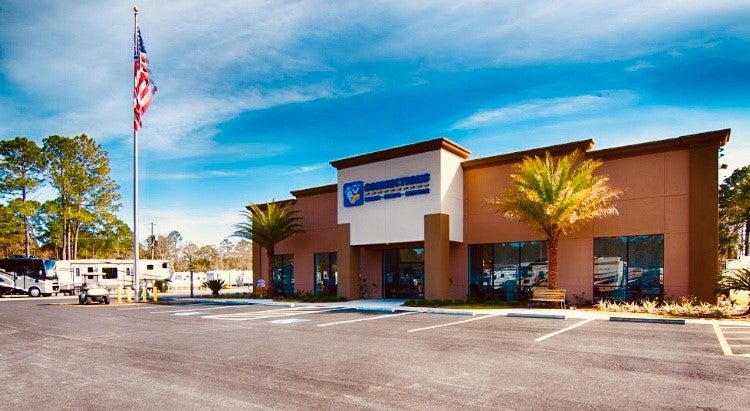
Thousands of Americans are stepping into the RV market for the first time. Because the pandemic has severely restricted travel, many people have discovered the appeal of being able to hit the road in their own self-contained residence.
But if you want a deal, now is not the time to buy. It's a seller's market, and it's obvious the moment you go to an RV dealer and see ... not much. Dealers I spoke with said in some cases, they have 10% of the inventory they'd typically have sitting on their lots.
The dealer I ultimately purchased from, RV Connections in Panama City, Florida, told me they usually have 300 travel trailers, fifth wheels and motor homes on the lot — but lately, they can't keep more than 50 in stock.
On top of demand, most U.S. RV manufacturers closed their factories in March and April, after COVID-19 was declared a pandemic. This has put further strain on the supply of new RVs. If you'd rather not put down a deposit and wait two months for the exact model you want (which is a possibility), you'll have to choose from the existing inventory.
Right now, typical RV selling practices are out the window. New RVs can generally be negotiated for up to 40% off the manufacturer's suggested retail price (MSRP), but you'll find right now there's far less wiggle room. Private sellers on sites like RV Trader have used travel trailers and fifth wheels listed for the price of a new vehicle.
I dealt with a number of dealers while trying to find the best price for the travel trailer I wanted. And when it came to negotiations, it was clear the dealer didn't have to offer much because if I declined the inflated price, they'd simply sell it to someone else.
Units are selling so fast, dealers can't keep their website inventory accurate. I called twice to confirm the make and model I wanted was still on the lot, and by the time I arrived later that day, the RV had been sold.
If you find something you like and want it now, you can typically give the dealer a $500 refundable deposit to hold it for you.
Related: 6 things you should know before you rent your first RV
Tow math is hard
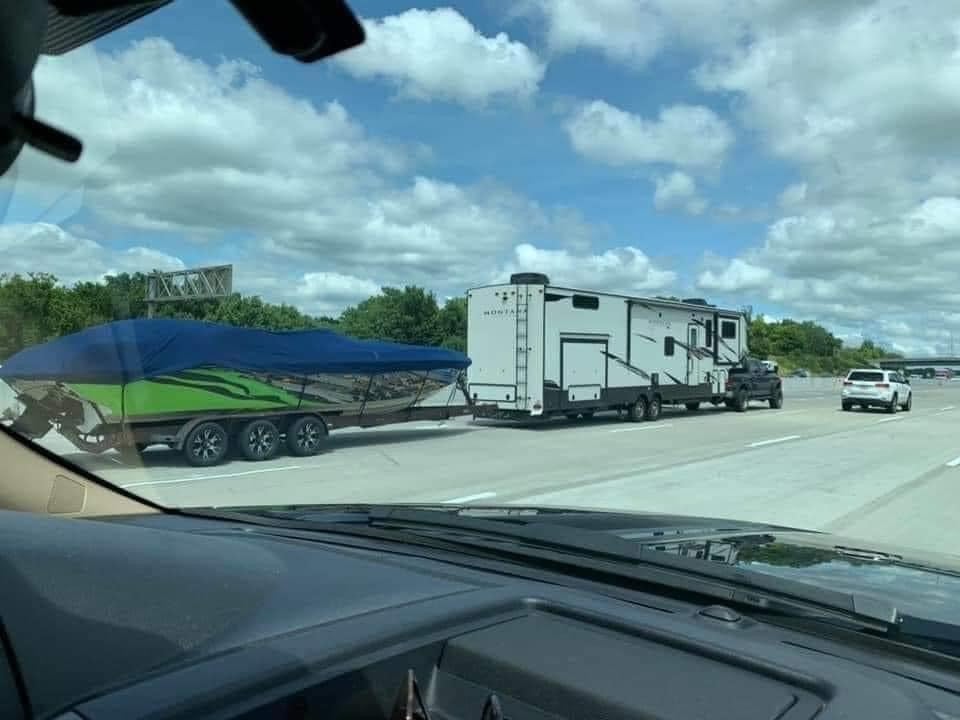
If you're new to the world of towing, the best advice I can give you is: Ignore what the car, truck or RV dealer tells you about a vehicle's actual tow capability.
I spent most of the RV-buying process researching how to safely tow because of the implications of doing it wrong. I want to avoid damaging an expensive truck and travel trailer and ensure I keep my family and other motorists safe. Every truck and RV dealer I spoke with gave incorrect information on one or multiple aspects of safely towing a travel trailer or fifth wheel.
So, let me bust some popular myths of towing:
The advertised tow capacity does not dictate a safe RV weight
You will likely exceed multiple other limits of your truck or trailer before ever coming close to its advertised tow capacity. If your truck is advertised as having a 12,000-pound tow capacity, I guarantee you won't be able to safely tow anywhere close to a 12,000-pound RV.
The "80% rule" means nothing
There's an old urban myth that says you should only tow up to 80% of what your truck is designed to tow. But it's not based on math. Again, the advertised tow capacity of your vehicle is a number you'll likely never come close to meeting before you exceed other limits of your tow vehicle or trailer.
Enhanced features won't increase the tow capacity
Fancy suspension add-ons such as airbags, Roadmaster Active Suspension or stiffer coils don't increase the towing capacity of your truck. All they'll do is make the ride smoother or decrease the "squat" of your tow vehicle.
Most of the time, your tow vehicle will be limited by its "payload" capacity (read: how much cargo your truck can handle on its own two axles). The payload includes the weight of anything you put on either of those axles outside of the tow vehicle's curb weight. This includes the weight of gas, passengers, cargo and, most importantly, the tongue or hitch weight of the RV you want to tow.
If you take my 2020 Ram 1500 Laramie Ecodiesel as an example, my specific trim level with included options has a payload capacity of 1,600 pounds, found on the sticker on the inside panel of the driver's door seal. From that 1,600 pounds, you have:
- 25 gallons of diesel at 7 pounds per gallon weighing 175 pounds
- My family of four, weighing approximately 470 pounds
- Car seats and miscellaneous cargo weighing 40 pounds
That means that, without putting another single thing in the truck, the tongue weight of my RV cannot exceed 915 pounds. The tongue weight of a trailer should be between 10 to 15% of the gross trailer weight, meaning the maximum my trailer could weigh fully loaded is just 6,100 pounds or as high as 9,150 pounds as to not exceed the payload capacity of the truck.
The dealer's advertised tow capacity is 11,000 pounds, but I won't get close to that without exceeding the truck's capacity and, likely, other truck design maximums.
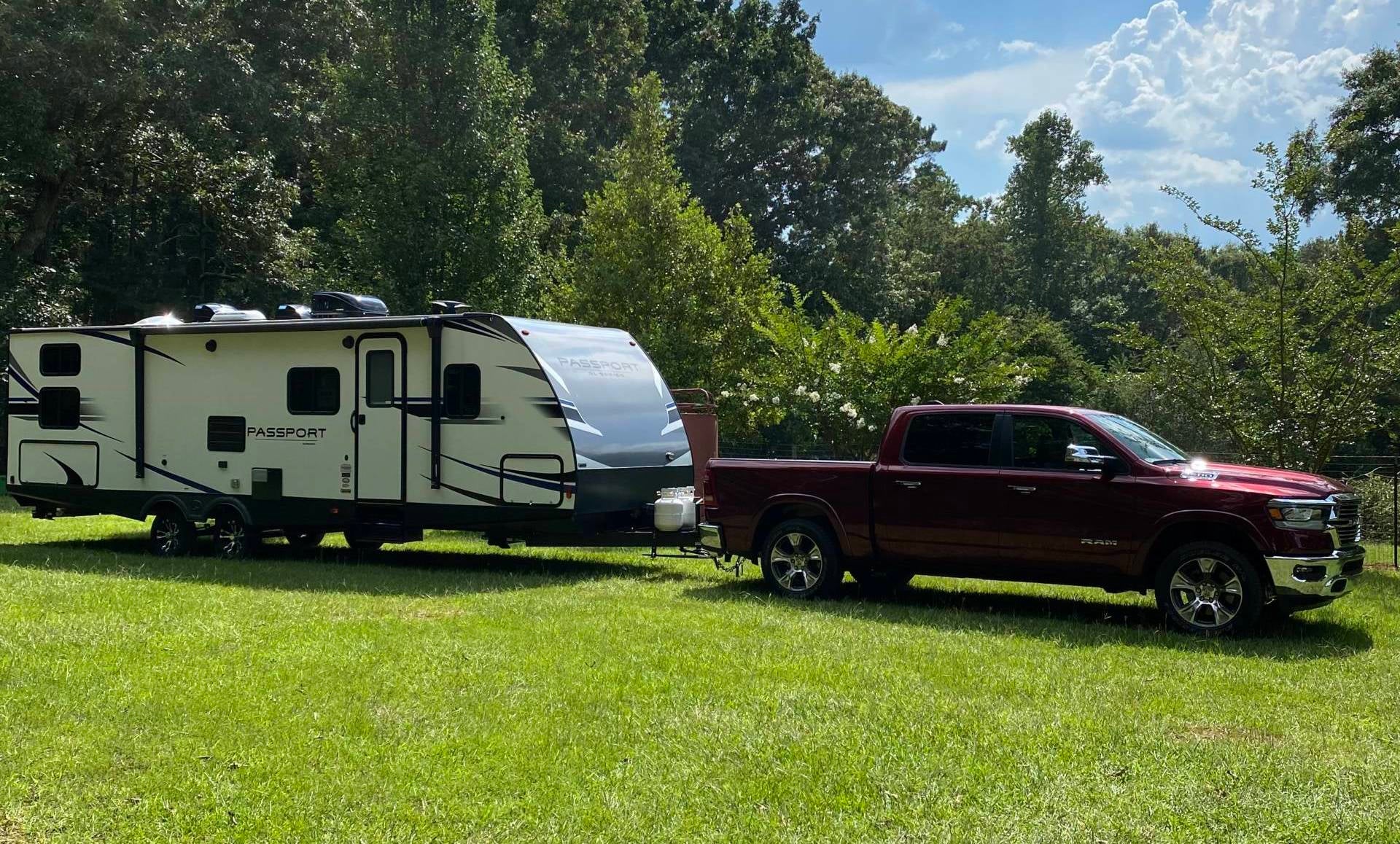
What you'll find after doing the proper tow research is the majority of people towing on the road are exceeding one or several of the limits of their tow vehicle or RV. More than likely, they simply haven't done the math and are just considering the towing capacity and RV weight after a dealer, trying to make a sale, said they were good.
There are many other considerations for safe towing such as axle maximums, gross combined vehicle weights, trailer brakes, weight distribution hitches, sway control, proper mirrors and more. Please do your towing research and be safe. Exceeding design limits can damage or break your tow vehicle or trailer — or worse, get someone killed.
Related: How to rent a relocation RV for only $1 a day
Dealers can include fun extras
If you're buying a new RV, ask the dealer to throw in a few inexpensive (for them) extras that will make life easier for you and prevent annoying repairs down the line. You can also prevent a secondary pitch from the dealer by requesting these add-ons first. Some things to request:
Bug screens for outdoor vents
Your RV will have vents to the outside for everything from the hot water heater to your refrigerator, freezer and oven. They have covers, but aren't bug proof. Dirt daubers and wasps, for example, find the warm vents great places to build nests. Dealers can add metal mesh to the outside of these vents that prevent pests of this size from gaining access and wreaking havoc.
Roof vent covers
There will be roof vents in your trailer to allow air circulation; one typically in the bathroom area and another in the main living area. These have mesh covers to keep out bugs and debris but will be open to the rain. The vent covers you want to request are plastic and have rear air openings. They're inexpensive, but need to be properly sealed to the roof to allow the vents to stay open when it's raining or when you're driving down the road and don't want your RV to get hot inside.
Hitch assembly
You're less likely to be hit with a labor charge if you buy your hitch from the dealer, but either way, ask the dealer to build your hitch on delivery day and ask if you can bring your own. If you have a weight-distribution hitch and sway control, you wouldn't be able to assemble these correctly anyway until you have the actual trailer, meaning you're going to have work to do on delivery day to drive away safely with your trailer or fifth wheel.
The dealer can always say no, but these are easy items to agree to that make both parties feel they've won.
Related: 5 lessons learned from taking a road trip in the age of coronavirus
Hire a third-party RV inspector
Private party sellers with used RVs, as well as dealers unloading trade-ins, can be good deals. The problem with a used RV is you just don't know the true condition of the systems, and many times the warranty has either expired or is not transferable. That's why, if you're buying a used RV, you want to bring a third-party inspector.

If you want to save some money and avoid the depreciation of a new RV purchase, you need to ensure you're not getting a lemon and hire an independent RV inspector to check out your potential purchase.
The National Recreational Vehicle Inspectors Association allows you to easily locate and contact an accredited inspector in your area. They'll check out your investment, typically for a couple of hundred dollars, and inspect every system and structure of the RV to see what problems and costs may lie ahead. If a seller or dealer doesn't want an inspector to check out the RV, you can go ahead and pass on that deal.
Understand manufacturer and dealer warranties
Warranties are a great selling point but come with fine print and asterisks you need to understand.
Manufacturers typically offer their own warranties that cover the workmanship for one year and the structure for up to three years, and these are transferable to new owners. Many RV dealers offer a warranty for life that's not transferable to new owners. That may sound like a great deal, but you have to take your RV to be inspected on a yearly basis, which can cost $300 per inspection.
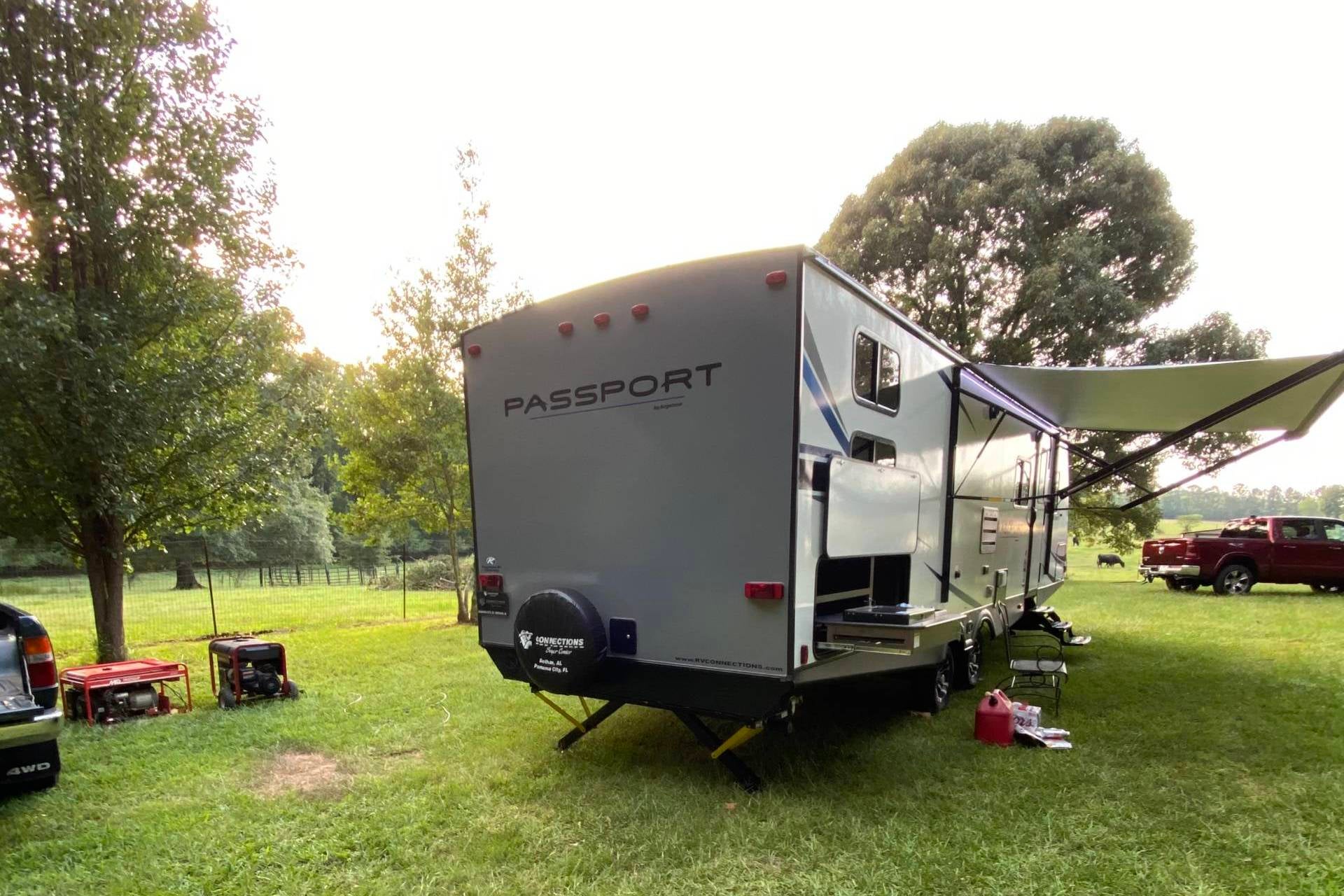
Getting work on your RV covered by a warranty can also be a headache. Many owners report a week- or month-long wait to get an opening for warranty repair work, and parts are in such short supply right now because of production issues you could wait even longer to get your RV back.
Don't let the warranty alone be a selling point that sways your decision unless you completely understand and accept the limitations and requirements of the warranty.
Related: Best credit cards for road trips
Bottom Line
RVs and tow vehicles can be large investments. You want to be smart when putting this much on the line from a financial and safety standpoint. That means you need to do your own independent research and not rely on dealers alone to give you correct information.
There's an entire outdoor world to explore, and an RV can make that happen for you right now. Be smart, be safe, learn from my mistakes and enjoy taking a leap into a new world if you're a first time RV buyer.
Feature photo by Richard Kerr/The Points Guy.
9 Things I Wish I Knew Before Buying My First RV
Follow these tips from an RVing veteran to make your first rig purchase as seamless and stress-free as possible.
By Kerri Cox & Roadtrippers
Before buying your first RV, there’s a good chance you’ve never camped in one before, at least not on a regular basis. When you’re in the market for an RV it’s easy to overlook some key considerations while making this important purchase, especially when your mind is swirling from all of the RV manufacturers, rig types, floor plans, and amenities.
Before my family purchased our first Jayco trailer in 2015, we had done some camping in various RVs my in-laws owned. However, there were many things we didn’t consider when selecting our own since we’d never bought one before and were in a different life stage.
Luckily, our first rig ended up being a good fit, and we kept it for 5 years before upgrading. We went into our upgrade shopping process with a better idea of what RV we wanted and how to get it.

The Roadpass University Shopping Course walks you through the whole process, from choosing an RV to financing the purchase.
From budgeting and bargaining to features and floor plans, here are nine items to consider when buying your first RV.
1. Know How to Match a Trailer With Your Tow Vehicle
Safety always comes first on the road, and for those considering a trailer, that’s especially true when it comes to having a tow vehicle that can safely haul your rig. If you already have a tow vehicle, you can use its tow capacity rating as a starting point, but it’s best to be conservative with your numbers since you’ll still have to consider things like vehicle, trailer, and cargo (both inside the vehicle and trailer) weights, which all play a role in your towing capacity.
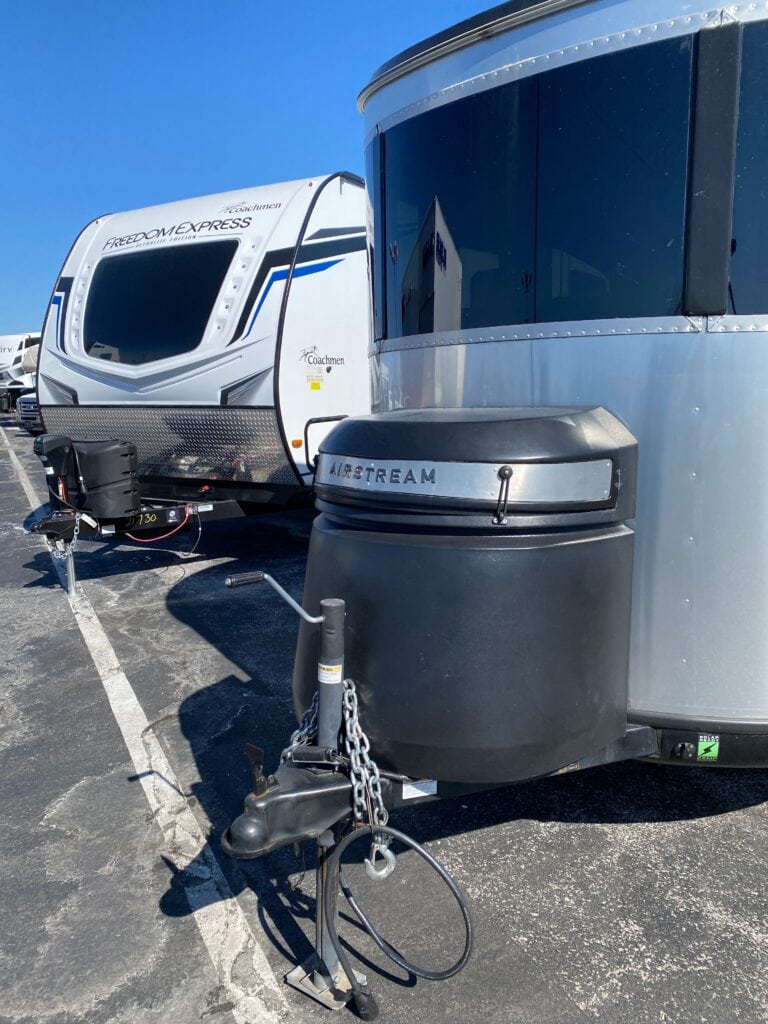
Even if the dealership tells you that your tow vehicle is a good match for one of their RVs, it’s always best to do your own homework so you don’t end up with a rig your vehicle can’t tow.
2. RV Financing Isn’t the Same
While shopping for cars, you can usually find low interest rates and competitive lending options, but that’s not always the case for RVs. When financing an RV, you’ll tend to come across higher interest rates and fewer financing options with no direct loans or special offers coming directly from the manufacturer. On the plus side, RVs usually qualify for longer loan terms than a car, with financing options extending up to 20 years.
3. Watch for Extra Fees
Just like any other major purchase, hidden fees can catch you by surprise when buying an RV. Gretchen Holcombe, an RV travel blogger who’s purchased three trailers, shares her varied experience: “Some dealers will quote a price that includes most everything (other than maybe taxes and title fees), while others will quote one price to get you interested and then add on all kinds of other charges later for things like delivery and inspection and dealer prep.”
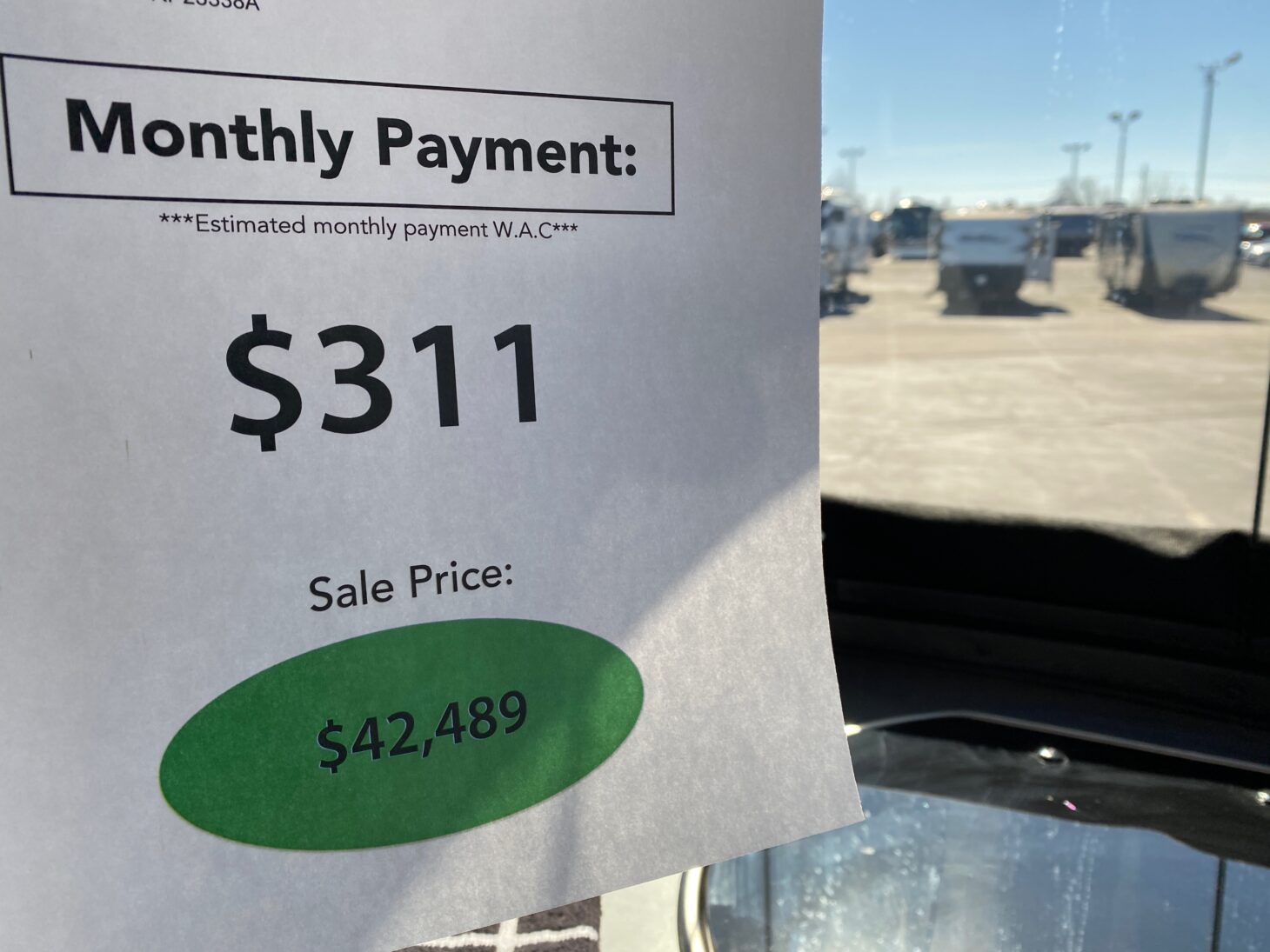
If you find comparable RVs at multiple dealerships, ask about additional fees and see if any are negotiable. Holcombe continues, “Make sure you’re comparing final ‘out the door’ prices when you’re shopping around and trying to find the best deal.”
4. Consider Your Long-Term Living Situation and Family Dynamics
If you purchase an RV with a 7-year loan and have preschool-aged children, your kids will be close to their teens by the time you pay off your rig. While it’s always possible to upgrade your RV, you should think about how your family and everyday life might change in the long-term, so you’re purchasing an RV that meets your needs for today and the future.
My boys were 11 and 14 years old when we bought our first trailer. By the time we sold it 5 years later, we could hardly fit their lanky teenage bodies into the rig. Also, as younger kids turn into teenagers with busy schedules, they may camp with you less often, so things like large bunkrooms can go to waste. While you can’t predict the future, it’s good to try to imagine it at the very least.
5. RV Warranty Repairs Can Take Months
New buyers are often happy if their rig comes with a warranty, but most people don’t realize that warranty repairs can take your RV away from you for months at a time. The service center must diagnose the problem, get your manufacturer’s approval, order parts, and then do the repair. Instead of sending your RV in for every small repair, it’s more efficient to make a list of repair needs that can be handled all at once.
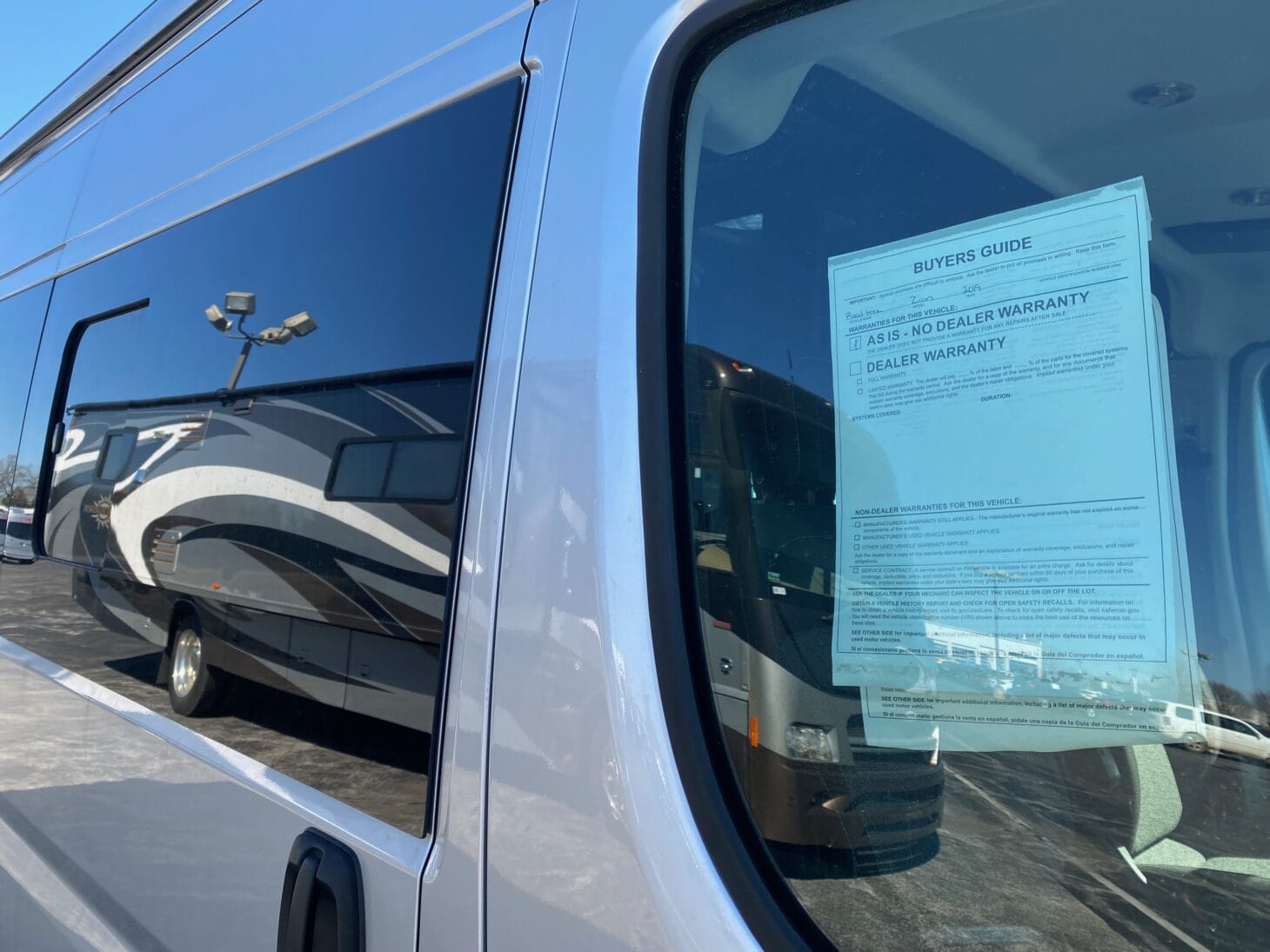
You should also read reviews for the RV service center you choose, just like you do before sending your car to an auto shop.
6. Tank Size Matters
When you look at your first RV, the tank size numbers might be meaningless, but you’ll quickly learn how often your family fills and empties the tanks.
It’s important to have an idea of what your tank size should be before making your first purchase. If you plan to go boondocking or if you have a larger family, you’ll need larger tanks. If you plan to occasionally camp without water or sewer hookups, you can probably get by with smaller tanks, especially if you’re willing to use the campground facilities or conserve water.
7. Don’t Dismiss the Little Things
You might think that you can “learn to live with” crawling over your partner to exit a corner bed, but in reality, it will probably be a daily nuisance. The same is true for other less-than-convenient features, like a wet bath, or having to constantly fold out couches and dinettes for extra sleeping space.
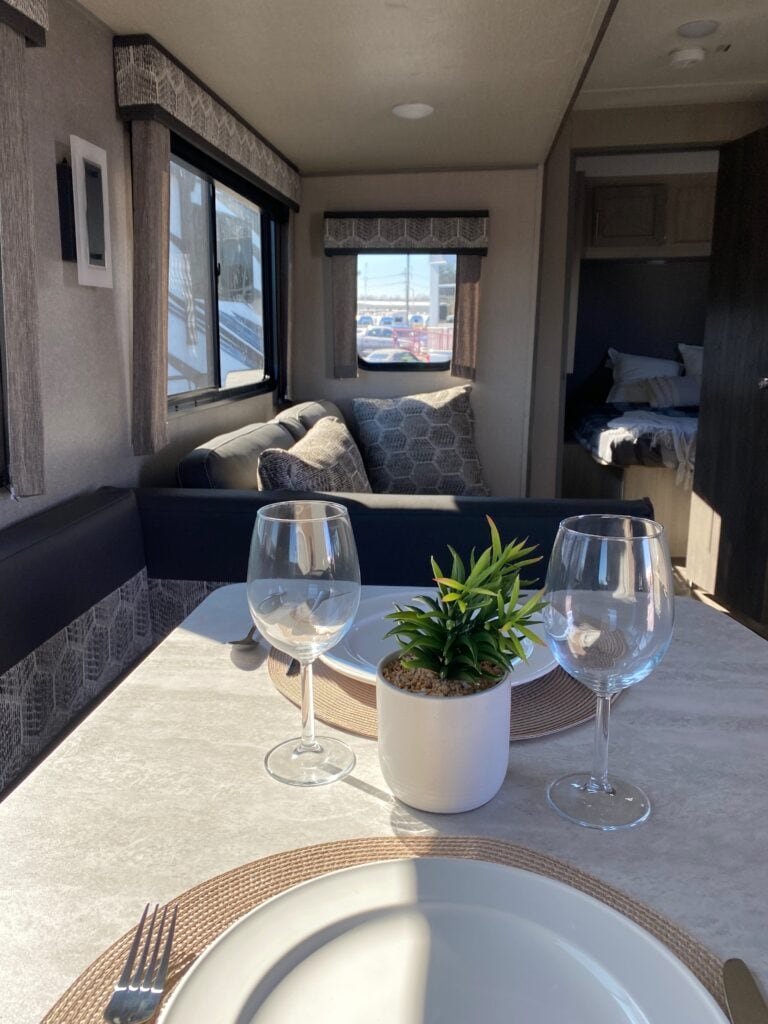
When purchasing your first RV, pay attention to those minor annoyances and don’t discount them. While it’s possible to adapt to some inconveniences, others may take away from your camping experience in a major way.
8. Understand the Space With Your Slides Retracted
Many RV buyers tour rigs with the slides out. While this gives you a good idea of the floor space, it doesn’t show you what the trailer is like with the slides retracted.
Gretchen Holcombe shares her experience of buying a trailer without seeing the interior with the slides retracted: “We didn’t realize until we stopped along the way on our first big road trip that we couldn’t get into the bathroom when the slide was in. So much for using our own bathroom and avoiding public restrooms on the road.”
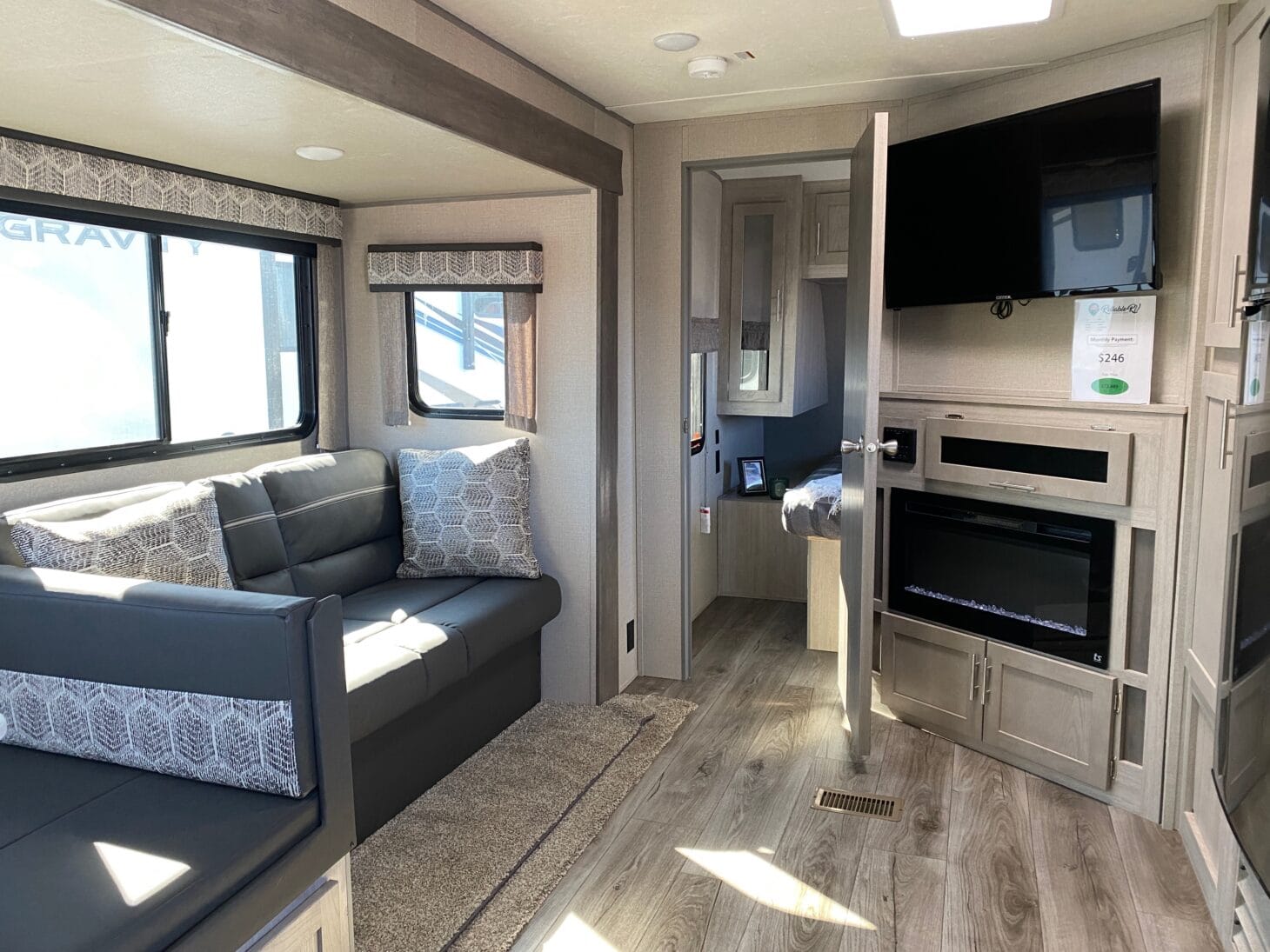
“[Now] we make sure to think through what will and won’t be accessible with the slide in when we’re trailer shopping (especially the bathroom),” she says.
Aside from bathroom access, check to see what storage areas are accessible while packing or unpacking with your slides in. Also, consider what the sleeping space is like with the slides in, in case you have a mechanical issue or campsite where you can’t extend them—this is the case if you plan to overnight camp in parking lots.
9. Pay Attention to Storage Space
When shopping for your first RV, you may not realize how you’ll pack for each trip. While it’s possible to be a minimalist, you still need enough storage for essentials like clothing, food, and camping gear. Also consider items like trash cans, laundry hampers, kitchen accessories, and shoes—all of which need a spot in your RV.
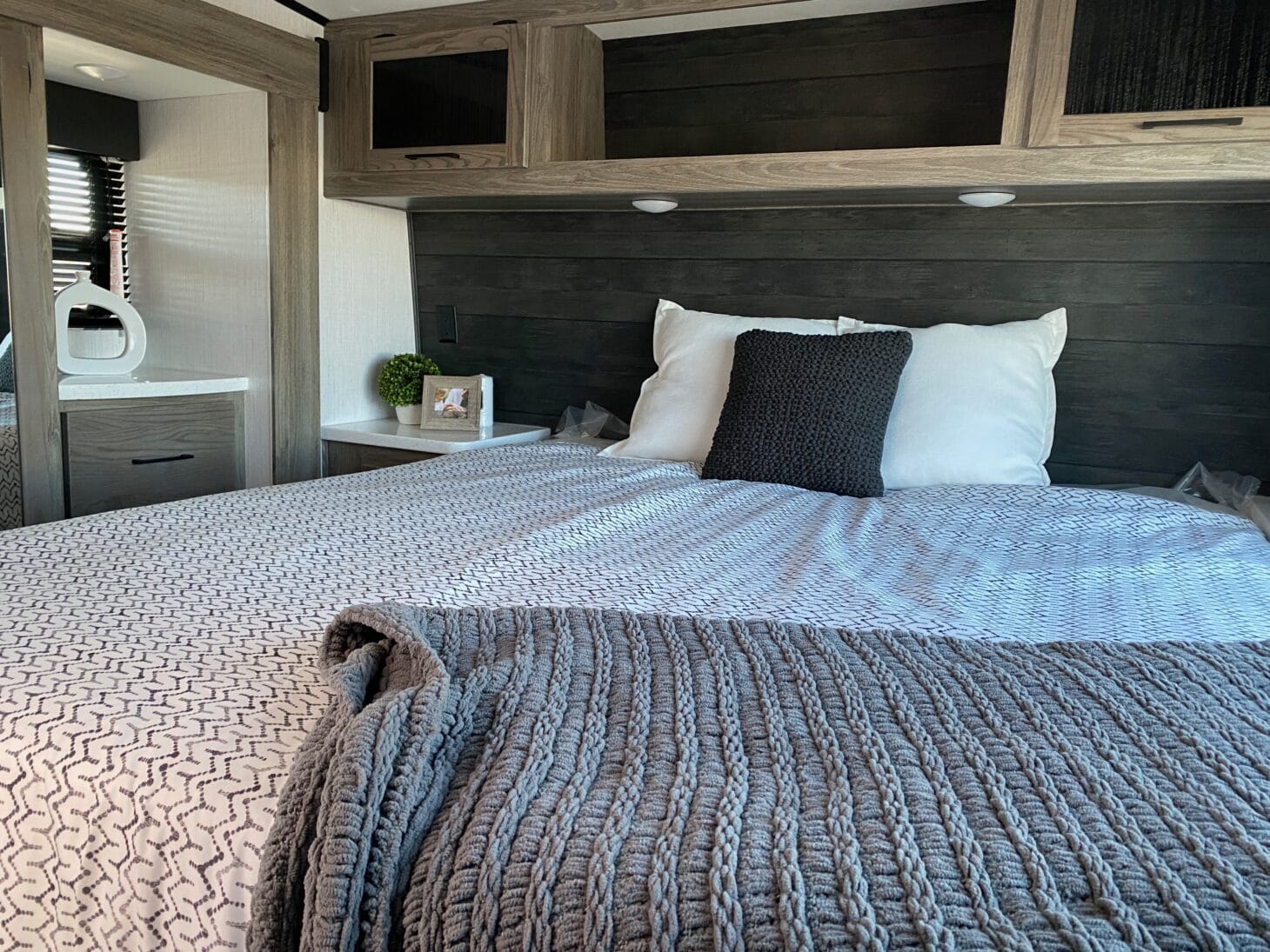
My family’s first trailer didn’t have adequate storage for longer trips, so we used the bathtub as an extra closet and exclusively showered at campground facilities. It worked for a while, but we were glad to upgrade to a bigger trailer with more storage.
Shopping for your first RV with these tips in mind will help you find the right rig for you.
Meet the Authors

Kerri is a teacher and freelance writer. The decision to buy a travel trailer (christened Birdy) in 2015 changed her life for the better. You can follow her journeys at Travels with Birdy. She lives in Missouri with her husband and teenage sons.

Roadtrippers
Roadtrippers helps you find the most epic destinations and detours—from roadside attractions to natural wonders and beyond.
Get the most inspiring stories from the road sent directly to your inbox.

- Trip guides
- Trip Planner
- Sign up Log in Sign out
- Log in Sign out
- ROADTRIPPERS MEMBERSHIP
- RV RESOURCES
Plan your journey, find amazing places, and take fascinating detours with our app.
We couldn't find an existing Roadtrippers account using that service. Please try signing in with another option or create a new account with Roadpass.
We need your email address to send you trip itineraries and other updates.
- Skip to primary navigation
- Skip to main content
- Skip to primary sidebar
- Skip to footer
Journey With Confidence
What to Expect When Buying an RV for the First Time
- RV Trailers and Motorhomes
So you’ve taken the plunge, and you’re buying an RV for the first time. First of all, congratulations on your big decision! But after the initial excitement, you may find yourself a little nervous. There’s no need to worry. We’re breaking down exactly what you should expect when shopping for and purchasing your first rig.
What to Consider When Buying Your First RV
Knowing what you need out of an RV is half the battle. Once you know exactly what you’re looking for, you’ll be able to find and check out suitable options much more quickly.
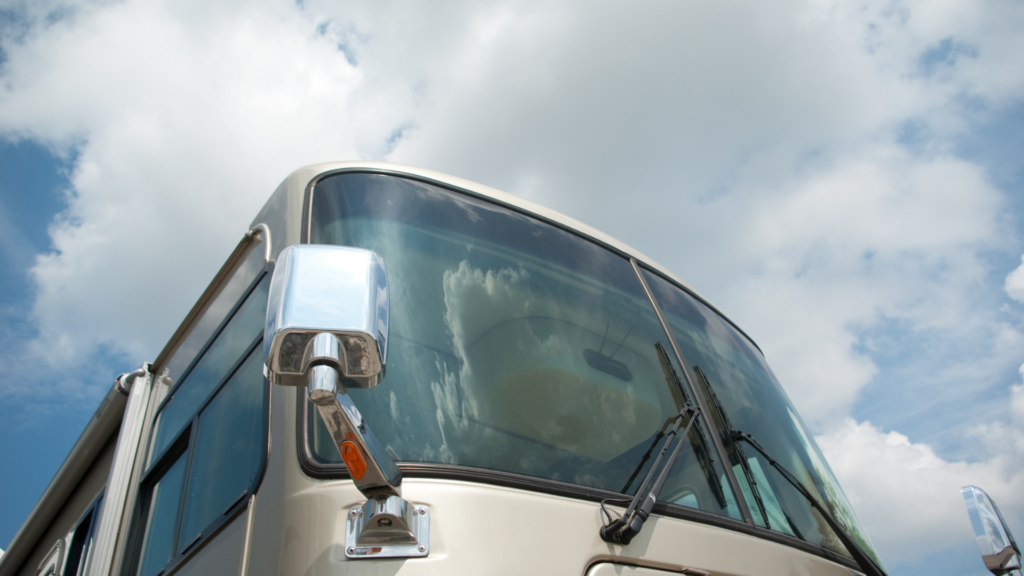
This is perhaps the most significant decision you’ll need to make when buying an RV for the first time. Do you need a colossal 40-foot class A rig with multiple bathrooms, an outdoor kitchen, and a washer and dryer? Or can you get by with a more modest class B or C or a travel trailer? Bigger RVs with tons of features will appeal to full-timers or those looking for luxury vacations. Those only taking the occasional trip may not need quite as much space or as many features.
Purchase Price
Price may be the one area where many first-time RV buyers can’t compromise. You should ensure you know what you can afford and be confident in your ability to make payments. Factor in the ongoing ownership costs, including registration, any taxes or fees, repairs, gas, and more.
Travel Plans
This information will inform all of your other needs. Are you and the family setting out for a few years on the road, homeschooling the kids, and working from the RV? Or are you a single retiree looking for a camper for occasional weekend trips or visiting the family? While plans can and do change, you should know how you plan to use your RV before purchasing it. You don’t want to regret buying an overly large or expensive rig or find you’re unhappy with the tiny living space.
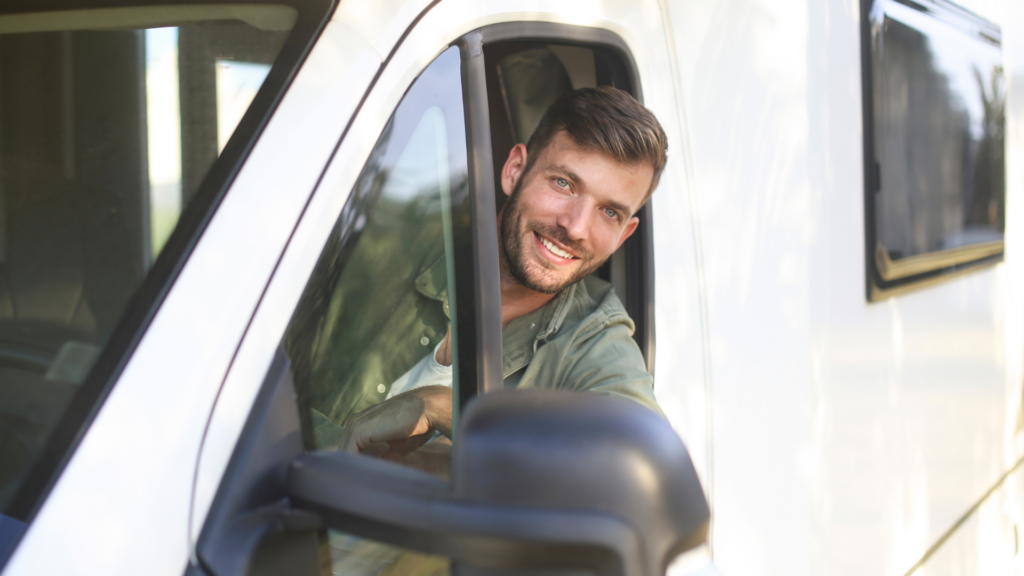
New Versus Used
Whether you’re looking for a new or used RV can make a massive difference in your shopping process and experience. Those looking for new rigs will spend most of their time at dealerships and contacting manufacturers. What you can purchase will depend on which new models are on the lot or ready for construction.
On the other hand, used buyers will need to look to dealerships and keep an eye on the vast private market for used RVs. Selection will depend on what RVers in the area are selling or trading, which could force you to compromise.
Depending on how you plan to use your new RV, you may want to get one type of floor plan over another. Think about how you plan to eat and relax, both inside and out. Families may wish to opt for a bunkhouse-style rig or models with sleeping space above the cab. Some floor plans will put the shower, toilet, and sink together, while others will place the shower on the opposite side of the main walkway. Towable RVs have even more variation in floor plans without the need for seats in the front.
What to Expect When Buying Your First RV
Now that you know what you’re looking for, what should you expect when checking out a potential RV?
The Sticker Price Is Negotiable
Much like buying a car or truck, the sticker price is by no means the price you have to pay. Sellers often expect you to negotiate. You never know if you’re dealing with a motivated seller or a dealer looking to clear out space for new stock. While you may sometimes find sellers unwilling to budge much on the price, they may offer additional features, warranties, or other enhancements instead.
Prices Will Be Cheaper in Off Seasons
As with buying a home or fresh produce, RVs have seasons. Generally, you’ll see higher prices in the spring and summer as more people look to get on the road for vacations. Once fall and winter roll around, you’ll likely have more options as a portion of the RV community either trades in their rigs for new ones or decides they’re no longer interested in the RV lifestyle.

There Are a Lot of Options (Do Your Research)
Even in recent months, where demand has skyrocketed, there are still a ton of RVs and trailers out there for interested buyers, ranging from fresh off-the-line new models to ones that have been on the road for decades and need a little TLC. Research is crucial to know exactly what you should look for and what you’re getting out of a rig. This is especially true if you anticipate making major repairs or upgrades in the coming years.
Remember to Ask About Add-Ons
Beyond the RV itself, make sure to know about any add-ons. These could entail extra costs. However, you might get a chance to add valuable upgrades to make your new RV even more comfortable.
Ask for a Full System Walkthrough
RVs include many complex systems, from water to propane to leveling systems. Since this is your first RV, you may not be 100% familiar with how each operates. That’s OK!
However, you must understand how to use them before taking your new rig out on the road. You don’t want to find yourself at your first campsite with no cell service and no idea how to empty your black tank. Have the seller walk you through how to work your electric, water, sewage, propane, leveling, and any other systems. That way, you can work out any questions or issues right on the spot.
If Buying Used, Request an Inspection
While it’s unlikely that someone will try to sell you a total lemon deliberately, not all RV owners or dealers know everything about their RVs. That RV may have sat outside for years uncovered or on the brink of a major system failure.
That’s why it’s crucial to get a full inspection from an experienced inspector of your choice. They’ll give you a heads up on any potential trouble spots or issues. The cost is modest compared to the price of your RV, and you’ll sleep easier knowing your new rig is in good shape. The National RV Inspector’s Association even has a tool to help you find licensed inspectors in your area.
Be sure to read the 11 RV Buying Mistakes You Can Easily Avoid for more tips and tricks to ensure you get the best deal.
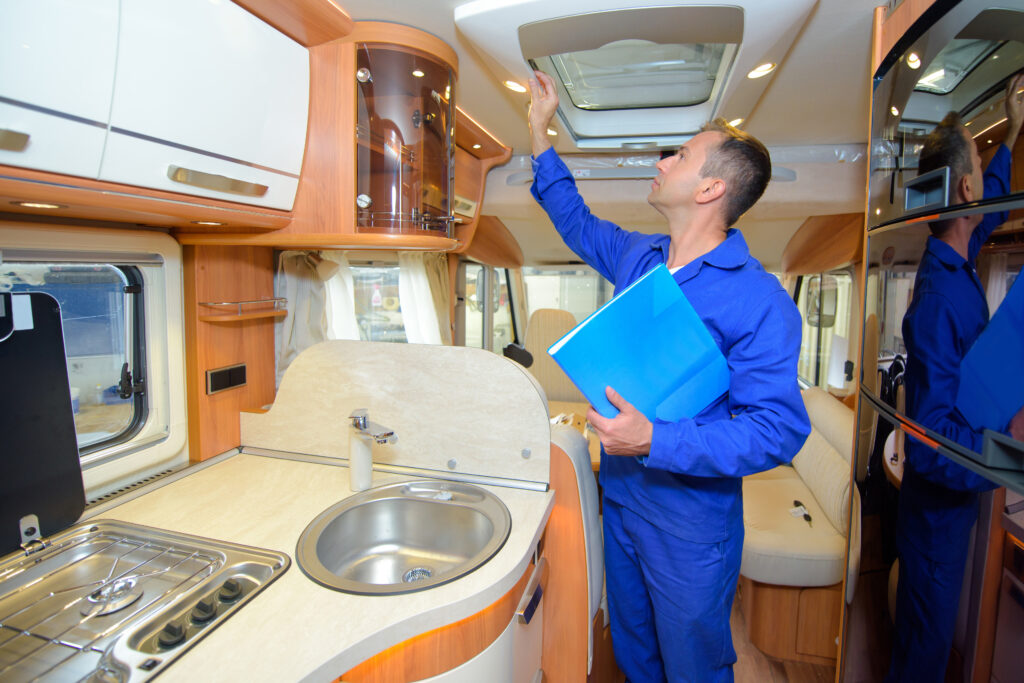
How Much Should You Spend on Your First RV?
How much you should spend buying an RV for the first time is a personal decision that depends on your financial situation and plans for using the rig. You’ll need to do some research ahead of your purchase to see which models and styles are in your price range.
Services like RV Trader and RV USA will help you search for available models and explore their specs. Sites like craigslist and eBay will also give you an idea of what you may end up spending. Motorhomes will cost significantly more than comparably sized trailers, but don’t forget the cost of acquiring a truck or other tow vehicle if necessary.
With all the styles, models, options, and upgrades, buying an RV for the first time can seem overwhelming. But with a bit of research and a good handle on your budget, it can be an exciting and fun process. And the reward for getting through it is a whole new lifestyle and level of freedom. Are you considering making the switch?

Beginner’s guide: Tips for First-Time Travel Trailer Adventurers
Heading out camping for your first time can be both a scary and exciting experience. If you’re new to travel trailer camping you’ve probably spend a lot of time reading and asking and learning how best camping should be done. But, there’s no better way to learn than by doing.
Here you’ll find one mom’s story of what they learned and why you should take note of these first time travel trailer tips!

(This post contains affiliate links for your convenience. As an Amazon Associate I earn from qualifying purchases . If you make a purchase through my link I receive a small commission at no added cost to you. See my policy page for more information)

A first time travel trailer camping story by Heather of Nesting Intentionally
As first time travel trailer campers, we have learned a lot! …mainly what NOT to do!
Even though we had expert campers to help guide us, we still managed to learn a ton of lessons, the hard way. We have many, many tips to share. There are a few camping tips that you may have heard before that you should not ignore. Then we have a couple lessons we learned that we hope will help you in your camping adventures too.
When I was a kid we didn’t camp much. When we did camp it was in a tent with 3 kids and my mom for the weekend. I grew up in Florida. It’s hot there. Especially in a tent, in the summer, with 4 people. My memories of camping are okay. We had fun playing in the dirt and going on scavenger hunts , but it was so hot!
My husband went camping all the time as a kid. His family had a camper. They had a pop up first, then a trailer, then a 5th wheel, and now his parents have an RV. But if you were to ask him if he liked camping as a kid…. he’d tell you no. It was hot and there were too many bugs. Oh and he doesn’t like to eat outside… strange, I know.
So naturally, two people who didn’t like camping as kids, what do they do?
They go out and buy a camper!

We talked about it for YEARS before we bought one. The memories that we made as kids surpass all the negative feelings we had toward camping.
As a kid you love getting outside, playing with dirt, experiencing the outdoors. Whether you live in bug infested Florida or the snowy mountains, there is always fun to be had outside. That is what we want for our kids. We want them to have the experiences that we had and then more.
The camper we bought is a 2005 KZ Coyote Hybrid. It’s a cross between a pop up and a travel trailer. The beds pop out like a pop up trailer does. But the whole trailer is hard sided like a regular travel trailer. It’s very spacious inside, compared to most travel trailers.
First, passing along some travel trailer camper trailer advice:
Some camper tips that we did because we were told to by expert campers…..
- Park the camper at the house at least 2 days before you leave so you can pack the camper and turn the fridge on .
- Do a running check of everything before you leave to make sure that all brake lights, appliances and camper is all in working order. ( Here’s an RV checklist to help you make sure you’ve done and checked everything before you head out)
- Pack a level…. Yes, the level tool you use to hang pictures on the wall . When you put the stabilizers down you have to make sure the trailer is level and not too high or low on a side.
- Practice towing and backing up the camper…every camper has a story or two. You’ll thank yourself later for doing a couple (or a couple dozen) practice runs.
Now, for the first time travel trailer tips and tricks:
1. pack everything in totes .
Put food, bedding, and camper parts in separate totes.
Once you get to camp you can unpack all that needs to get put away. Then all the totes can go outside and be stored under the travel trailer. You’ll want to pack the camper well and totes are the answer.

2. Once you get to camp, put everything away
Make all the beds, put all the food away, put all the clothes and towels in a place, make the beds, make sure everything has a place where everyone can get to them as needed.
Get everything nice, neat and organized. Everything needs a place or you’ll feel like the walls are caving in with all the stuff everywhere.
3. Get some command hooks
We have command hooks for our keys by the door. There are 5 in the itty bitty bathroom for our towels. There is one near the door for the fly swatter. And a couple others spread throughout the camper.
Yes, command hooks are super handy!

- INCLUDES - 2 hooks and 4 medium indoor strips; 1 hook holds 3 lbs
- ORGANIZE DAMAGE-FREE - Say goodbye to holes, marks, or sticky residue on your walls, doors, cabinets, or closets; Command Hooks by 3M are easy to use and help keep your walls looking beautiful
- NO TOOLS REQUIRED- Hang hats, bags, dog leashes, scarves, and accessories where you want without nails or a hammer
- STRONG AND VERSATILE- Command Designer Hooks hold strongly on a variety of indoor surfaces including painted walls, finished wood, glass, tile, metal, and other smooth surfaces
- REMOVES CLEANLY- Reorganize when inspiration strikes; These wall hooks leave no sticky adhesive behind; Perfect to use inside cabinets and closets, in your college dorm, apartment, home, and office
4. Bring extra shoes for the kids
My kids get so muddy…. They must gravitate to the mud. They literally had to wear wet, muddy shoes for about a day until the sun came out for a couple hours to dry them up.
5. Bring cash for laundry
There is usually a change machine in the laundry room to exchange your dollar bills for coins. But if you don’t have cash…. you’ll need to find some. If you’re camping at an older facility, the laundry machines vending machines might also only take coins…not cards.
6. Do research on your campsite
Do you want to be near the bathrooms? Does it have a general store in case you forgot salt & pepper? Are there trees for shade? Does it have a laundry room? Does the campsite have full hook up (cable, sewer, electric, water)? Does it have a picnic table or fire pit? Does it have cell service or Wifi?
These may not be things you need/want but if you are looking for something specific, I’d check, because not all campgrounds are the same… (don’t ignore this one)!
READ MORE: This article will give you some tips and suggestions for choosing the best campsite for your family’s needs.
7. Don’t remove the yellow blocks too early
…not until everything is hooked up and you are about to pull the trailer out of the driveway. I took those little yellow triangles out too early. The trailer was on the ball. It managed to get pushed off the ball and roll almost into the back of the truck. (don’t ignore this one either)!
8. Get a big outdoor rug
You’ll want a rug for the outside of the camper . Trust me: the bigger the better. You’ll need it for everyone’s muddy, dirty shoes/feet.

9. Make a list for everything
You need a checklist to make sure that your camper is ready to leave your driveway. You need a list of kitchen stuff and food. You need a list of clothes and accessories to bring. It’s overwhelming if you don’t have a list for it all. You will forget something!
My in-laws… who have been camping like 40 years, still have a list. It’s a lot smaller than mine, but you get the point. (don’t ignore this one)
Here’s a free printable camping packing checklist you might want to check out if you’re looking for a starting place.

10. Don’t pack too many rainy day games
Don’t pack 3 board games, 2 movies, and a deck of cards for the kids, in case it rains or they get bored.
If it rains, go play in it. If they get bored, go outside and explore. All that extra stuff only takes up space.
Travel trailers don’t have a ton of space to begin with, so use it wisely and leave that extra stuff at home.
But, here’s a post full of camping games and camping toy ideas in case you do want a few suggestions.
I hope our mistakes and lessons learned help you on your first travel trailer camping trip or your next one!

Written by Heather
Also written by Heather is this article, Surviving Quarantine with kids

For more camping reading, check these out next:
- No more bored kids! – how to keep them busy and having fun at the campground
- Camping in bear country – how to teach kids bear safety
- Super important and often over-looked RV camper trailer tips

5 thoughts on “Beginner’s guide: Tips for First-Time Travel Trailer Adventurers”
I agree with your point about making a list of everything because it is very important to make sure that we don’t forget any essentials during our trip. So thank you for sharing this checklist, I like the way you make a separate section for everything.
Great article! Your Tip 9 (Make a list for everything ) is great because when we make a list we take everything we need to camp with us. I agree with you all. Thanks for providing such information
Thanks for the tips! But I disagree on leaving the games and movies at home. On a stormy night, those were some of our best memories! I’d rather have them and not need them (keep ‘em in a bag in the car) then have restless kids and grumpy parents in a small space.
Yeah, that’s a tricky one! I agree that I don’t want my kids to just hang out inside an watch movies. If this were me (and I actually had something to watch videos on in a camper) I’d probably just tuck them away as a last resort option instead of the first choice… but, you’re right, cuddling and movies can be great family time together!
I can’t wait for the next articles
Leave a Comment Cancel Reply
Your email address will not be published. Required fields are marked *
- Credit cards
- View all credit cards
- Banking guide
- Loans guide
- Insurance guide
- Personal finance
- View all personal finance
- Small business
- Small business guide
- View all taxes
You’re our first priority. Every time.
We believe everyone should be able to make financial decisions with confidence. And while our site doesn’t feature every company or financial product available on the market, we’re proud that the guidance we offer, the information we provide and the tools we create are objective, independent, straightforward — and free.
So how do we make money? Our partners compensate us. This may influence which products we review and write about (and where those products appear on the site), but it in no way affects our recommendations or advice, which are grounded in thousands of hours of research. Our partners cannot pay us to guarantee favorable reviews of their products or services. Here is a list of our partners .
First-Time RV-Buying Mistakes to Avoid

Many or all of the products featured here are from our partners who compensate us. This influences which products we write about and where and how the product appears on a page. However, this does not influence our evaluations. Our opinions are our own. Here is a list of our partners and here's how we make money .
Recreational vehicle sales are soaring, and the RV industry expects 2021 to be a record-breaking year. Dealerships say much of the demand is coming from first-time buyers and others anxious to find a safer way to vacation during the pandemic.
As any RV owner will tell you, though, buying a motorhome, camper or trailer is a complex process that requires a ton of decisions. The more choices you make, the more opportunities you have to make mistakes, especially when you’re a novice.
We had some great family camping experiences in the motorhome we owned from 2011 to 2017, and we learned a lot. If you’re considering your first RV, these are some of the errors to avoid.
Mistake No. 1: Assuming you’ll save a lot of money on travel
If you want to make a motorhome owner laugh, say something silly like, “I bet you save a ton of money on hotels!”
Well, maybe. But new motorhomes typically cost $60,000 to $500,000, according to the RV Industry Association. Add in the cost of gas for a vehicle that gets 6 to 10 mpg, plus insurance, maintenance and the inevitable repairs. Campground fees typically run $25 to $80 a night. You may need to pay for storage if you can’t park the rig at your house, since many cities limit the time that RVs can be parked on the street. Storage can cost $30 to $450 a month, depending on whether it’s outdoors or indoors, heated or unheated, near a major city or out in the boonies. (We paid $125 a month to store ours outdoors near a favorite campground about 90 minutes from our Los Angeles home.)
Campers and trailers can be more economical — as long as you already own the truck or SUV you need to haul them. Pop-up trailers and truck campers start at around $6,000, according to the RVIA. Travel trailers usually range from $6,000 to $55,000, while fifth-wheel trailers range from $18,000 to $160,000.
If you need a loan, you may wind up paying a lot of interest over time because RV loans often stretch for 10, 15 or even 20 years. Borrowing $40,000 for 15 years will cost you nearly $19,000 in interest, even at a reasonable rate (for RV loans) of 5.5%.
Add it all up, you could spend a lot of time in some pretty nice hotels for what you’ll pay camping in an RV.
There are definitely ways to spend less. If you’re shelling out for a new rig, though, don’t kid yourself that you’re vacationing on the cheap.
Mistake No. 2: Buying new
As with cars, RVs lose a considerable amount of value the second they’re driven off the dealership lot. Letting the first owner take that big depreciation hit can save you a lot of money.
For example, RV Trader — one of the biggest RV marketplaces — recently advertised a 2021 Winnebago Navion 24D for sale in California with a list price close to $160,000. The 2019 version, with just 5,200 miles, was listed for $120,000.
We spent a lot less, about $16,000, buying a 13-year-old motorhome with less than 8,000 miles on the odometer. We spent $7,000 on maintenance and repairs over six years, plus $1,200 to replace its six tires.
You may worry that a used RV will be a money pit, and that could be true. But unlike cars, RVs often aren’t trouble-free even when they’re new. There may be leaks, rattles and manufacturing defects. The first owner may spot and fix the worst problems before passing the RV on to you. (You’ll still want a seasoned mechanic at a good dealership to inspect any used rig before buying.)
This leads me to another tip: Spend some time researching dealerships and their service departments, because some are notorious for treating customers badly and overcharging on repairs. Check out online reviews and talk to experienced RV owners.
Mistake No. 3: Rushing your purchase
Making a big purchase in haste is rarely a good idea, but you could really regret joining the stampede to buy an RV right now.
Normally, you can negotiate a discount of 20% or more off a new RV’s sticker price. But the pandemic slowed production at factories just as demand surged over travel safety concerns . The result is a seller’s market with limited inventories at dealerships. That means a lot less wiggle room on prices for new and used rigs. A year or two of high demand is often followed by a lull, though, so consider renting an RV now and buying after things calm down.
Renting first is a good idea in any case, because it gives you a chance to try different types of RVs and to see if this kind of camping is for you . (We ultimately decided we preferred national park lodges and nice hotels.) Sites including Outdoorsy, RVShare.com and Cruise America offer a wide variety of rental options, with motorhome prices typically starting around $100 a night.
This article was written by NerdWallet and was originally published by the Associated Press.

This post may contain affiliate links or mention our own products, please check out our disclosure policy .
Travel Trailer: Beginner’s Guide for Your First Trip
Published on December 15th, 2019 by Levi Henley (Full-Time RVer, Content Manager and Media Specialist for RV LIFE)
Okay, so we all begin somewhere and sometime. You’ve got your new travel trailer and are planning a trip into the great outdoors. Congratulations, you’ve made a big step in the right direction.
To ensure your trip is memorable, and for the right reasons, let’s ensure you’ve checked all the boxes.
What to Pack, How to Prepare, and Planning Tips for Your First Trip

I have a son and a daughter. When they first saw our new RV, they were super excited! They began jumping around and telling all of their friends we were going camping! My first camping experience was surreal so I wanted to make theirs just as extraordinary.
DON’T MISS OUT ON CAMPER SMARTS UPDATES
Sign up for the newsletter today.
Please enter a valid email address.
An error occurred. Please try again later.
Thank you for subscribing to the Camper Smarts newsletter, keep your eye on your inbox for updates.
However, once we reached our campsite, I noticed we had forgotten so many essential items. While my family was having fun around the campfire, I was busy with a notepad writing down all of the things I had forgotten.
So my first tip is the most obvious — but also the most overlooked. Plan accordingly and buy what you need, otherwise, you’ll likely have to go without.
There are three water tanks inside. The black tank is used for toilet water and other deposits. The gray is used for sink water. And there is a freshwater tank for the drinkable supply. The black and gray tanks will be empty as you set out and will need to be dumped before you head back home .
Before you head out, determine if you need to fill your fresh-water tank. My campsite had an RV station that provided free drinking water so I was able to forgo the process to save myself the extra weight. If you’re considering the same, call ahead to your campsite and make sure they provide this service.
Another packing tip is to store the heavy items (such as your generator) low to the ground and near the front of the trailer.
What You Should Know About Driving While Towing an RV
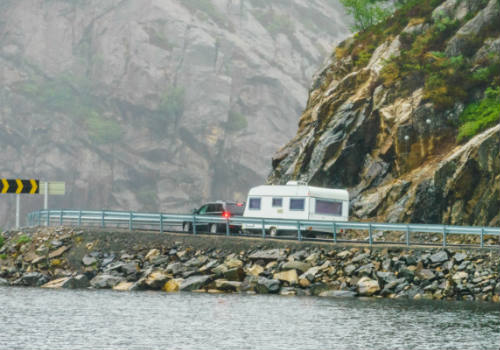
The first thing you should do is check how much weight your towing vehicle can tow. Most trucks and SUVs list this information on the driver door with a sticker. I have a 2012 Ford F-150 that can tow 11,500 pounds. Previously, I owned a 2010 Dodge Durango with a 7,200-pound towing capacity.
Once you check your truck, you need to check your trailer’s weight. There are three weights. The first is dry weight, which means how much the trailer weighs without any supplies or water. The second is the GVWR, or its weight once water and supplies are loaded. The third weight is called tongue weight. This refers to how much weight the trailer pushes onto the vehicle’s hitch. It is important that NONE of these figures is more than your truck’s towing capacity .
More than this, I highly recommend a 1,000-pound window between what you are towing and what your truck claims it can tow. Many truck-manufacturers buff this number up. Nobody wants to take a camping trip and destroy their engine or transmission on the road, especially with excited children in tow.
You should also make sure to note the truck hitch’s ball size. The majority of travel trailers use 5/8 of an inch, which is bigger than other trailers and boats.
When driving, be extra careful around tight turns on mountainous roads. Note the caution signs you see on the highway that display a trailer falling over. Yeah, those signs are for you now. I would be remiss to discount the large number of RVs that I have seen turned over onto their sides because of reckless driving.
Also, be careful of fishtailing, which is highly probable when a truck is towing an RV. I recommend that you install a hitch with weight distribution. A sway bar or suspension airbags will also do the trick. If you do happen to start fishtailing, be careful to avoid turning your wheel or slamming the brakes. Just remove your foot from the gas pedal and continue forward momentum. If your trailer is fitted with brakes, then give them a SLIGHT tap. Nothing too heavy.
When driving, also take special care of low hanging trees. Roads full of tree branches can be a nightmare for a trailer or any size.
Finally, avoid steep declines when driving. They will cause the trailer’s tongue to hit the ground and your stabilizers to bend.
What to Do at the Campsite
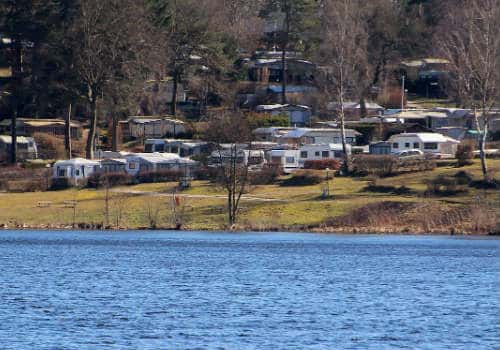
Make sure to park your trailer on the flattest ground possible. If the trailer is not level, you will feel odd when walking around. Beyond you feeling odd, the RV will also bounce a little with each step. More importantly, if you are parked upward or downward, you can damage the fridge inside the trailer.
My next point of advice is to unhook your trailer from the tow vehicle. This is because setting up the trailer is much easier when it’s not connected to the vehicle, as the stabilizers will connect with the ground below. Otherwise, you would have to match their contact with the hitch’s height. Also, with your truck free, you can explore the town or drive the children to the swimming hole.
Then, you must set up the stabilizers. Most travel trailers come with four. They are there to make sure the RV doesn’t bounce around when you walk inside. If you don’t install them, get ready to experience a shaky trailer each time someone uses the bathroom or turns to their side when sleeping.
The final point is to make sure that you have the proper power adapters if your campsite provides power. The common feature of travel trailers is 30 amps, but there are some with 15 or 50 amps. If you forgot the power adapter, or have the wrong one with you, then forget about connecting to the park’s provided power.
RV Power and HVAC
You must know that the travel trailer’s battery isn’t going to provide electricity to your air conditioning unit. For this, you need a generator with at least 3,000 watts of power. Also, it’s not a good idea to do any heavy electrical lifting when running the AC unit. This includes using the television or the microwave.
Of course, if you’re plugged into the park’s power, then you can forget this point entirely. Otherwise, if you plan on running all of the electrical devices in your trailer at once, be prepared to buy a massive generator.
When you’re using your generator, move it as far away from your trailer as possible. Several nice generators provide a quiet service, but most do not. If your generator is loud, check out this article on how to quiet it by up to 50% .
Your fridge can probably run using either electricity or propane. I prefer propane use if I’m driving or in a campground without power. Once I plug into the campground power outlet, though, I switch to electrical power. Some of these fridges, including mine, have an automatic setting that realizes when there’s connected power and shifts the power mode accordingly.
Water, Water, Water
Again, there are three liquid tanks in your RV: fresh, gray, and black. The fresh, as mentioned above, is for your drinking water. The gray will be filled with your shower and sink water. The black is for the toilet.
There’s a difference in water capacity for different trailers. Although I have a fairly big 43-gallon freshwater tank, there are four people in my family. If the campground doesn’t have shower installations, we can’t all take showers daily. This is something to consider ahead of time.
Don’t worry about the strange taste in the drinking water on the first use. It is completely normal (and healthy) and will pass after a few run-throughs.
I think it is a good idea to stock your RV with a hand-sanitizer. This is to prevent using too much water after going to the toilet. Also, be sure to turn off the water as you brush your teeth.
Post-Trip Information
Okay, so you’ve had a great first camping trip in your travel trailer. Now, you need to find an RV dump station. This can be a bit hard at first (especially on your own and during your first trip), but if you ask around, it shouldn’t be too painful of a process.
Upon arrival at the dump station, park before the dump hole so you can make sure that the trailer is on the right side. You’ll want to have purchased an RV dump hose because they don’t come with new trailers.
Once you connect one end of the dump hose to your trailer and place the other one into the hole, pull the black lever that can be found underneath your trailer. All of the accumulated sewage will spill forth, so you’re forewarned. Once the nastiness has washed away, remove the dump hose, wash it thoroughly, and store it.
Share this post:
Related posts:.

Boondocking Safety: Mastering Dispersed Camping in the Desert
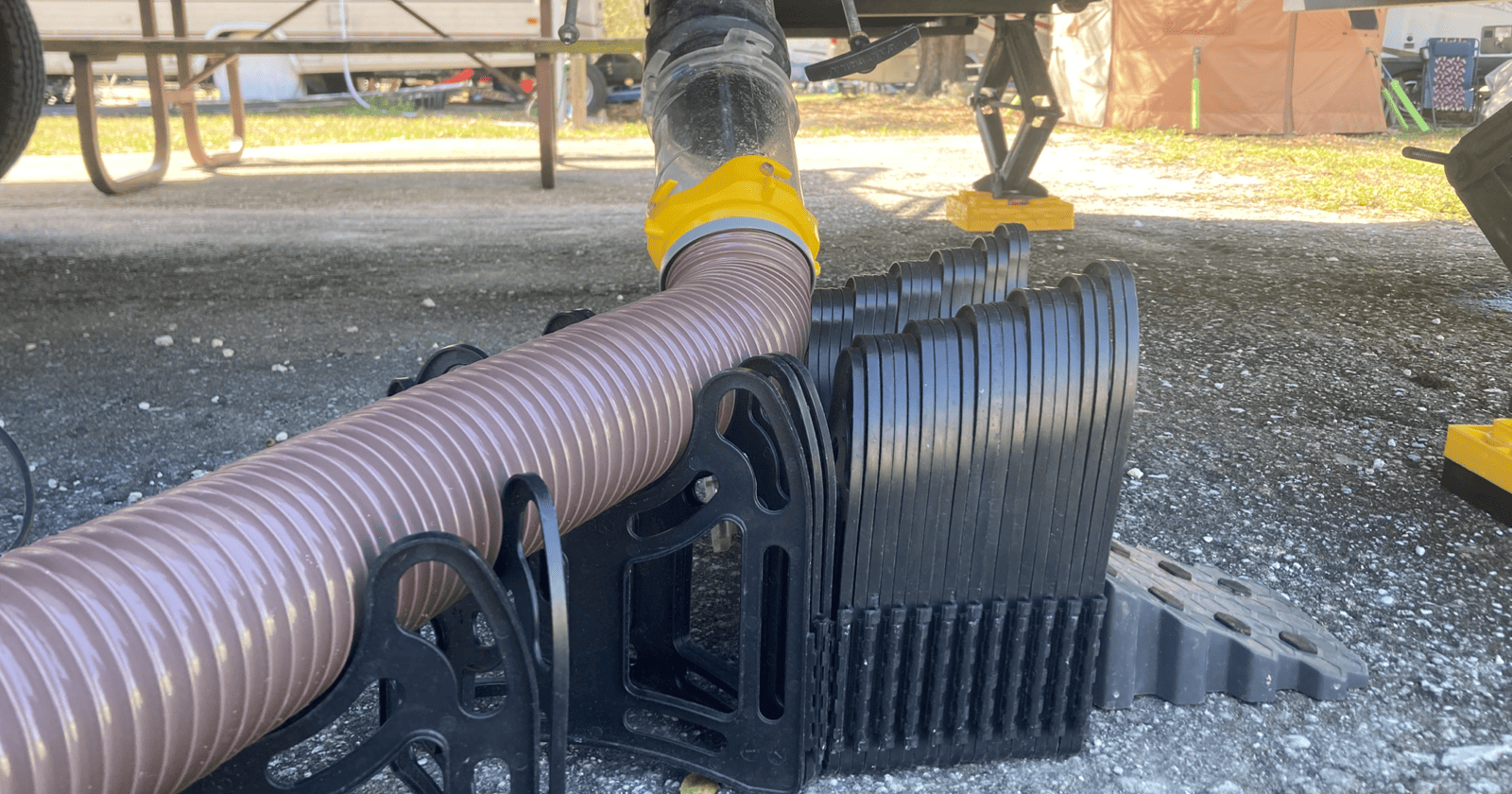
Why RV Sewer Hose Supports Are a Must-Have: Improving Sanitation & Stability

Safe Camping Near Alligators: Essential Tips and Destinations in the US
About the author:.

Levi Henley, RV LIFE’s Content Manager and WordPress specialist, is renowned for his expertise in RVing and workamping, having lived on the road since 2015. He’s the author of the popular guide “Seasonal Workamping for a Living: How We Did It” , a testament to his deep knowledge in the RV community. For more insights into Levi’s nomadic lifestyle and expertise, visit Henley’s Happy Trails .
Levi Henley: Content Manager, Media Specialist at RV LIFE
Levi Henley stands at the forefront of RV-centric content, wearing multiple hats as a Content Manager and Media Specialist for the RV LIFE network. With his deep-rooted expertise in RVing, workamping, and the full-time nomadic lifestyle, Levi has been writing about and living the lifestyle since he hit the road in 2015 with his wife Natalie.
Their journey, punctuated by innovative approaches to nomadic income, has culminated in the guide, " Seasonal Workamping for a Living: How We Did It ," a testament to their hands-on experience and knowledge. This resource, available on Amazon and through their personal website, Henley's Happy Trails , offers invaluable insights into the mobile lifestyle. Levi's has written for RV industry media key organizations like Coach-Net, Escapees, and Workamper News.
Beyond his professional prowess, Levi is a man of diverse talents and interests. He's not only an actor and magician but also a certified scuba diving instructor. His adventures across the country in a 2011 Sunstar Itasca, accompanied by Natalie and their two feline companions and rambunctious dog, embody the spirit of exploration and lifelong learning.
1 thought on “Travel Trailer: Beginner’s Guide for Your First Trip”
Great article, some good stuff there
Comments are closed.
Follow Camper Smarts:
- Follow Us On Facebook
- Follow Us On Twitter
- Follow Our Pins

- Find a Location
RV Pro Tips: First Time RV Owner Tips

1. Utilize Camping World as a Resource for Gaining RV Knowledge

The very first thing Zach and Mary mention as a resource for new RVers is Camping World. They said, our list of resources help make first-time ownership of an RV easier than ever before.
It’s true. If you don’t know how to do something then you can come into the store for help anytime–advice is always free. Or, refer to the Camping World YouTube channel for handy How-To’s and guides. No matter where you are, our staff is there to help you on your RV journey. Tell us what you need and we’ll help you figure it out.
2. Pay Attention to the Caution Labels on the Outside of the Camper
When you get your RV, you’ll notice that there are plenty of caution labels on the outside of your RV. These aren’t just for show. Read them all. They provide you with valuable information.
Nobody expects new RVers to know everything and these notices and warning labels on the exterior of the RV will keep you from connecting something up incorrectly or making a mistake.
Every RV purchased from Camping World comes with a full guided walk-thru. Don’t be afraid to film this full tutorial on your phone for easy reference later.
3. Put Everything Away Before You Get On the Road
Don’t just set out without cleaning up your RV and putting away everything that could bounce around or possibly break. As Mary notes in the video above, she’s had valuables break while they were on the road, and putting them away will help with this.
Also, it’s always smart to get dishes and other items that are a little more robust or non-breakable dishes. Camping World sells plenty of options in terms of dishes and cookware for you to choose from.
4. Before Buying, Look at Many Different RVs

Don’t just buy the first RV you see. There are so many designs and floorplans out there, including the popular Happier Camper , that you really need to do your due diligence and take a close look at all of the options out there. Imagine who will be living in the RV and walk through a full day of activity. Where will you hang out? How will you cook?
There’s also something to be said for choosing the right type of RV. Trailer or Motorhome? Then, there’s toy haulers which come in both motorhome and trailer variants. In the end, you should be able to go to your local Camping World dealer and have a representative help you find the RV that fits your lifestyle.
5. Get Outdoor Mats and Chairs
The living space of your RV is really nice, but you will also be spending plenty of time outside of the RV. To expand that living space, you should get yourself an outdoor mat and some camp chairs .
This can also be your space for campfires, small tables, outdoor eating, grilling, and so much more. Right outside your front door, you should have a space designed for comfort.
6. Utilize RV Storage Strategically

RV manufacturers build the units with tons of storage. They’re seeking to maximize every little bit of space to ensure you can bring along all of the things you need.
While the designers typically do a good job of giving you storage areas, you still need to utilize that space strategically. Don’t just cram things into spaces in your RV. Think critically about your RV and the things you need to bring along and then get some organizers for the storage space you do have.
7. Make Sure to Use Your RV Jacks and Wheel Chocks
Your RV’s jacks help to keep your RV stable once you have parked it and are ready to camp. The jacks will keep your RV from rocking about, and if you’ve every walked in an RV that doesn’t have its jacks down, you know that the rig will move around a little more than you might expect, especially if there’s some strong winds.
Wheel chocks are another thing you need to not overlook. Wheel chocks help keep your camper right where you want it. As Zach says, you don’t want to pull your truck away from the camper only to watch it roll away.
8. Have a Generator and Extra Propane on Hand

Having power on the go is what makes an RV so special. However, you need to make sure you have a way to either store fuel or generate power. That’s where generators and extra propane tanks come in.
Getting an additional propane tank is easy. You can buy one and just have it attached to your rig for those moments when you absolutely need some more propane. And a generator can truly save your bacon when you’re boondocking. A generator is a great way to get the electrical power you need.
9. Look Into Having a Backup Camera Installed
It doesn’t matter what anyone says, backing in a long travel trailer or fifth-wheel trailer is no joke. The same goes for motorhomes. Backing up a long motorhome can be a chore as well.
Backup cameras simply make life easier. Why spoil your trip at the start when you can swing your trailer in its spot with ease. While many motorhomes and some trailers will come with their own backup camera already installed, if your RV is lacking a camera consider having one installed. There are many aftermarket back-up cameras out there that you can add to your RV.
10: Store Pet Food in a Storage Container

Having a designated storage container for your pet food is an absolute must. You want to keep your pet’s food out of reach of wildlife.
Also, having a good place to store your pet’s food makes it easier to pack up fast. Whats more, it will stay fresher while you’re on the road and won’t go stale. Having a designated bowl for your pet’s food and water is also a good idea. Camping World sells everything you need to keep your pet happy on the road.
11. Wash Your Pet Using the Outdoor Hose
Another tip for pet owners is to bring along soap and try to wash your pets outdoors. Many RVs have a built-in outdoor hose. This is the best way to give your pet a bath. Keeping your dog out of the tub or shower inside your RV will help keep your living area clean and it will help keep your plumbing happy.
Dog hair can quickly clog up your RV’s shower or tub drain. If you must wash your dog inside your RV, make sure to try to collect as much dog hair as possible before it goes down the drain.
12. Bring a Leash for Your Dog

Having a leash for you dog is an absolute must. In almost all developed campgrounds you’ll need a leash for you dog. Even if you don’t think your dog needs a leash, you still have to have one at most campgrounds, so it’s smart to have at least one inside your camper.
Camping World carries plenty of leashes, and there are various styles of leashes out there that you can choose from. It doesn’t matter really what you choose as long as you have the leash with you.
13. Don’t Be Intimidated By the RV Life
Zach and Mary said that it’s fairly easy to get overwhelmed with all of the things you need and all of the things you’ll need to learn, but that RV life really isn’t that intimidating once you really get out there and start doing it.
Zach’s advice?: Don’t be intimidated by the RV Life and by all of the gear you need to get. The payoff is well worth it. “It is for everybody,” says Zach.
14. Practice Towing Your Travel Trailer Before You Leave

Towing a travel trailer isn’t extremely difficult, but it takes a little time to learn. Don’t let the first time you go camping also be the first or second time you’ve towed your RV . You don’t need to practice every day, but consider going out for a few drives, especially when you first buy the unit, to really get a feel for how it tows.
Try to challenge yourself to see if you can park it easily, take tight turns successfully, and just generally drive without stressing you, your passengers, or other drivers. If you know you have an area of towing that you’re not very good at—like backing up—then consider just practicing that.
15. Craft the Perfect Travel Trailer Packing and Camping List
It can be really easy to bring too much gear and supplies with you. When starting out you may have a tendency to overpack. That’s okay as long as you’re within the weight limits of your travel trailer and your tow vehicle, but you’ll often find the fewer things you bring along, the less there is to worry about.
Camping is supposed to be fun, so try to make it as worry-free as possible. For many, including myself, that means trimming down my list of gear and supplies to the minimum, so there’s not a bunch of extra stuff to worry about.
To do this, I’d start by compiling a list of everything you think you might need. Then take another look at the destination you’re going to, the weather during the time you’ll be there, and the people on your trip. Try to eliminate any unnecessary items. I had a friend who said to eliminate half of your original list. I don’t think you need to go that extreme but consider cutting down on your list significantly.
16. Research the Campground and Plan Ahead

Researching a destination is an absolute must when traveling with a travel trailer. You need to, first of all, make sure a place is somewhere you actually want to spend some time. Then you need to make sure your RV will be welcome in that area. What I mean by that is find a campground or place to park that can easily accommodate your rig.
Many campgrounds have limits on the overall length an RV can be. Also, most only have a limited number of spaces available. That means you should make reservations whenever possible and have a backup place to stay if your first option doesn’t work out.
17. Learn and Understand Your Travel Trailer’s Equipment
This is probably the most important thing for new owners of travel trailers. You need to learn how to properly use and maintain your RV’s different equipment. By design, RVs have many different appliances and electronics from your home. They’re not major changes, but you don’t want to be trying to figure these out while you’re supposed to be having fun camping.
Spend some time in your driveway testing out all your appliances and electronics on the RV. Consider doing a test run of your RV’s sewage system before you actually go camping so you know exactly how it all works. The more time you spend learning these things before you set off, the more time you’ll have to enjoy yourself and relax when you actually go camping.
18. Think Ahead of Time About Storing Your Travel Trailer
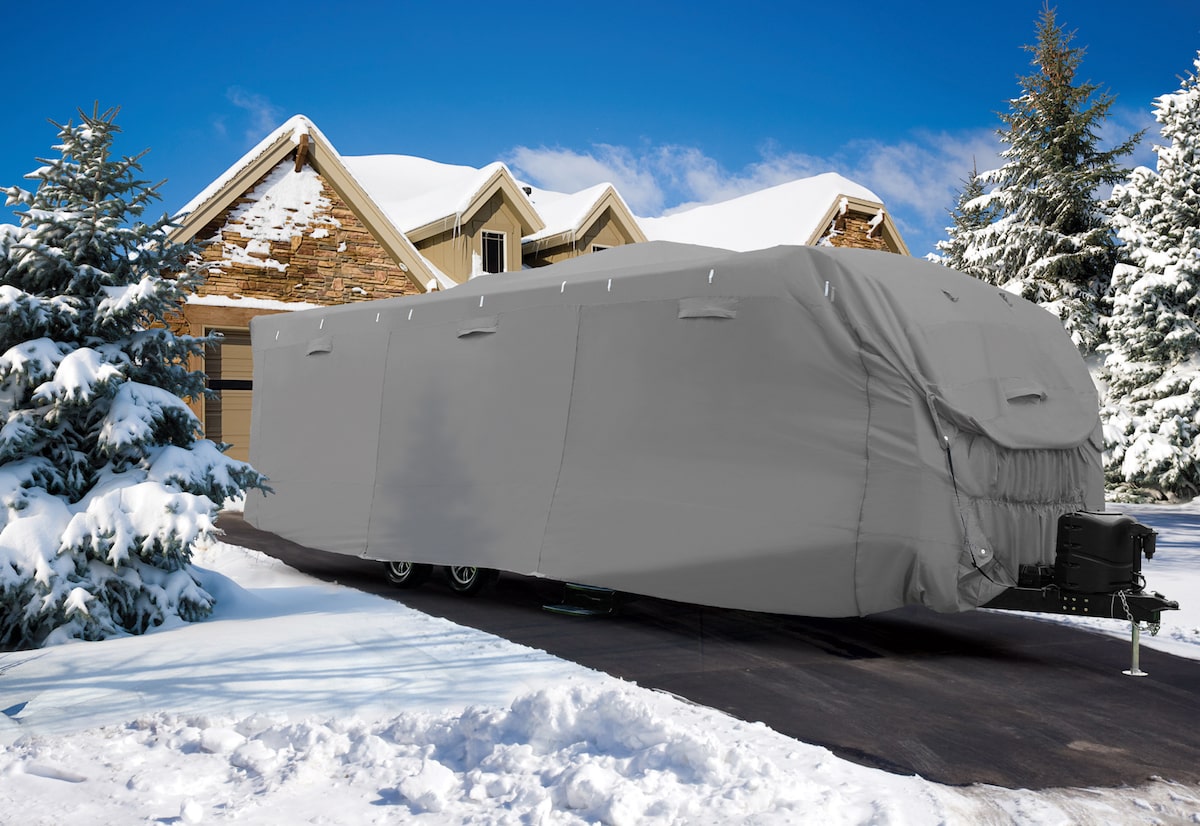
It’s spring as I write this, and I know you’re probably thinking I shouldn’t be discussing storage. Here’s the thing, winter will come again. I know it’s months down the road, but you need to have a plan for where and how you’re going to store your RV well ahead of time. If you wait until the weather starts to turn, it’ll be too late, and you could get stuck with an expensive option.
Also, unless you’re full-timing , you’re not going to be using your RV all of the time. That means you need a place to temporarily store it during camping season. Some people can park it in their driveway or backyard, but that’s not the case for everyone. Have a place to put your RV and one that’s preferably out of direct sunlight or exposed to all of the elements. I’m not saying it has to be parked inside a large garage, but try to mitigate the effects nature will have one it.
Do you have anything you think should be added? Leave a comment below!
- Comment (6)
I like how you talk about how important it is to be familiar with the trailer’s equipment before going on a trip. My brother has been thinking about buying a travel camper for his family so they can go camping more often. He’s been looking into how to buy and own one and where might be best to get one.

Learning your motorized or towable RV is key to maintaining it properly and troubleshooting issues when they arise!
Here are some links to all of our troubleshooting and maintenance content:
https://blog.campingworld.com/tag/troubleshooting/
https://blog.campingworld.com/tag/rv-maintenance/
Hope that’s helpful!
If you purchase an RV will they teach you how to empty the septic tank? That’s my biggest worry.
First time travel trailer purchaser in need of oractical advice.
Maybe I missed it but great value can be and will be had about consulting with experienced travel trailer travelers. Ive been doing the RV thing for years, but I always run into guys and gals that help, mentor and assist me in all phases of RVing. That next door neighbor of yours may have a device of experience level to share that can make life easier, faster, funner of cheaper but most of all, more effective.
Leave Your Comment Cancel Reply
Save my name, email, and website in this browser for the next time I comment.
Shop By RV Type

Your Adventure Awaits
Copyright © 2023 cwi, llc all rights reserved.
- RV Glossary |
- Privacy Policy |
- California Privacy Rights |
- Do Not Sell or Share My Personal Information |
- Targeted Advertising Opt Out |
- Terms of Use
Adventure More
Content submission.
Please provide a detailed description of the type of content you would like us to consider publishing on the Adventure More Blog.
A First-Time Buyer’s Guide to Buying an RV
?$Mobile$)
Purchasing an RV for the first time is incredibly exciting, and if you plan to have an RV on the road this summer, there’s no better time to buy than right now. Most businesses are struggling to keep up with demand, so if you plan to have an RV for summer adventures, you need to make a purchase sooner rather than later to manage the long lead times.
Perhaps you’ve envisioned yourself driving down the highway with your new RV in tow, off to find adventure almost anywhere your heart desires. You may have already begun to look at your options and have felt more than a little overwhelmed. There are a lot of options out there, and if you’re new to this, it can be hard to identify what is and isn’t right for you. That’s okay; we’ve done this… a lot, and we have put together a guide to help you navigate your first-time buying experience.
These are the seven most important things you should know before buying your first RV.
Know your vehicle
First things first, you should know your vehicle’s towing capacity. If you aren’t sure where to find this, check the sticker inside the driver’s side door frame.
After you find your vehicle’s towing capacity, you will need to add the RV’s dry weight (its normal weight without any additional things packed inside), passenger’s weight, cargo, and liquids. This will determine your total weight, which must not exceed your vehicle’s towing capacity.
It’s helpful to have a few RVs in mind during this process in order to make these calculations.
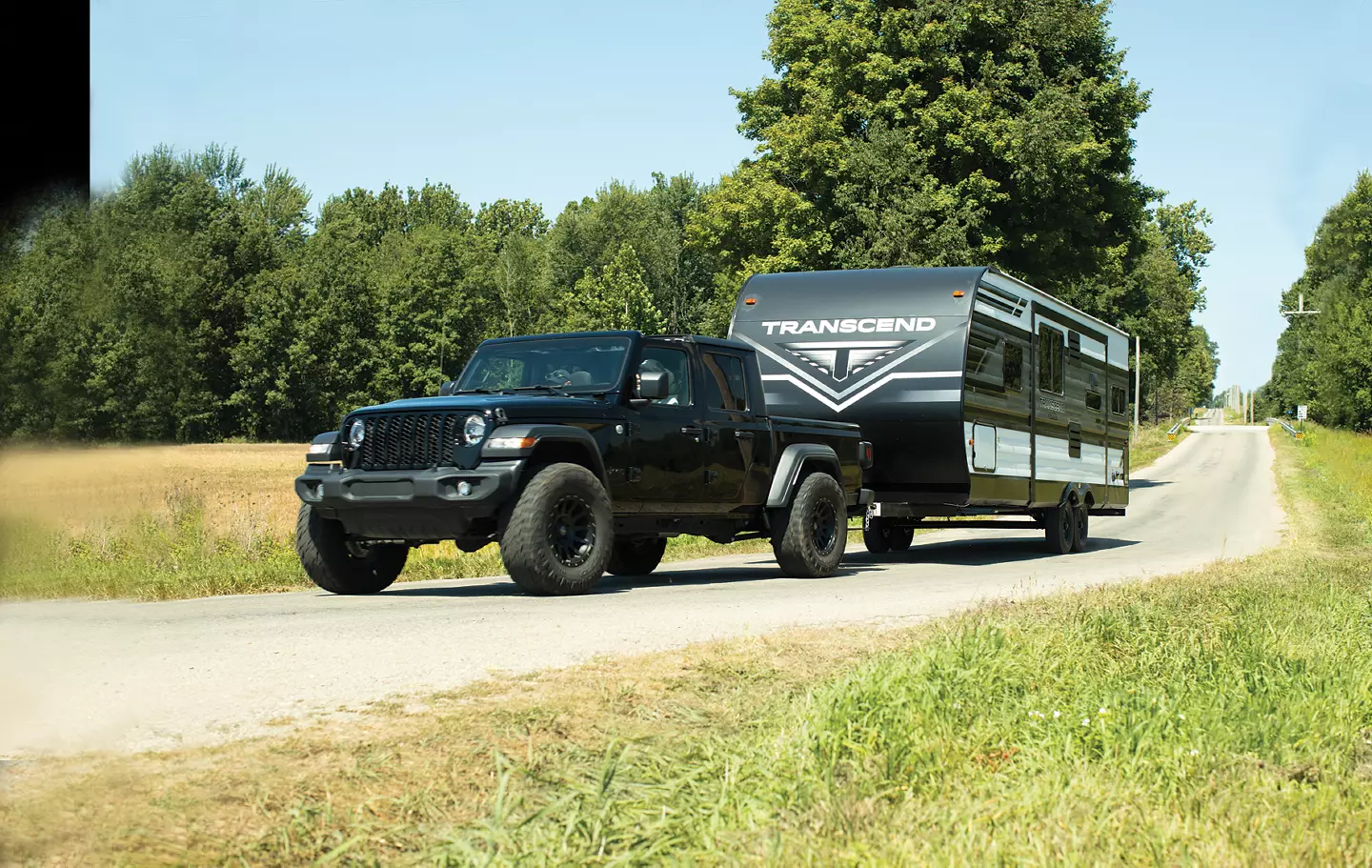
Find a local dealer
You should always shop locally when you are purchasing an RV. There is almost always a reputable dealer nearby to provide you with immediate and long-term benefits.
While price might be your top priority, there are other factors to consider when picking an RV dealer. These factors, such as service before, during, and after the sale, will provide you greater value during the lifetime of your RV. You want someone helpful and honest, who can help you through finding the right RV and financing without taking advantage of first-time buyers. You also want to be sure that they will provide you with professional assistance when you need it, whether that is on the day that you buy your first RV or when it needs to be serviced.
If you aren’t sure how to find a good RV dealer near you, you can enter your city or zip code into our convenient RV dealer search tool .

Make sure it’s inspected
Whether you are buying new or used, always make sure that the RV you are considering has been inspected and/or serviced. There’s no worse time to discover something is wrong with your RV than your first time taking it on a trip.
When you are looking at an RV, ask if it has been fully inspected (and if it is used, ask for the service history, as well). This will inform you whether the RV in question is ready for the road.
All Grand Design RVs undergo a 250-point inspection before they are shipped to a dealer, and they go through the same inspection again after delivery. This is precisely the kind of quality control you want in your future home away from home.
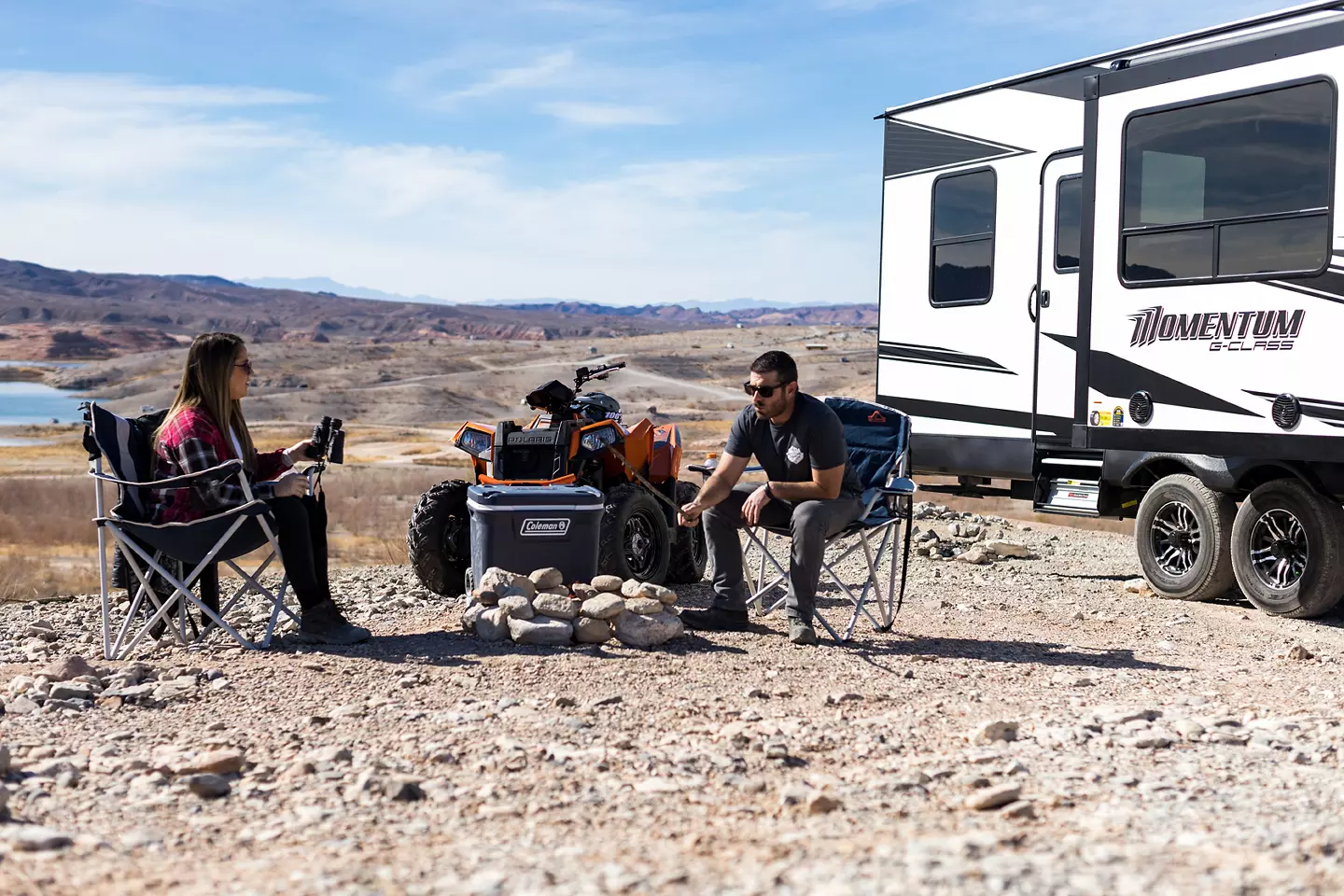
Have somewhere to put it
This seems obvious, but you need to be sure that you have the space to store your new RV. Don’t just approximate the size of the RV and your storage space. Take measurements and compare the two. You don’t want to take your RV home only to discover that you don’t actually have enough space for it. You’ll be frustrated and annoyed when you have to return your new toy until you can find a place to put it.
Measuring the space you have to store it will give you an idea of how large your RV can be. It’s possible that the RV you have in mind is larger than the space you have for it. Taking measurements can help eliminate costly miscalculations.
?ts=1701372992174&$Blog-Image$&fmt=webp-alpha&dpr=off)
Choose the right floor plan
So, you know your vehicle’s towing capacity and you’ve measured your storage space; you should now have a good idea of the RV size category you should be considering. But as you’ve probably already discovered, there are a lot of floor plans out there. How do you know which one is right for you?
Looking at floor plans online, while somewhat helpful, should not determine which RV you buy. Rather, you should visit a local dealership and spend time in your RV options. Ask yourself if the layout is working for you, or if you would prefer to have rooms and features elsewhere. Maybe the RV you are looking at has a rear living room, but you feel like you would prefer this room in the front.
Be picky! This is a big investment, so you shouldn’t settle for less than perfect.
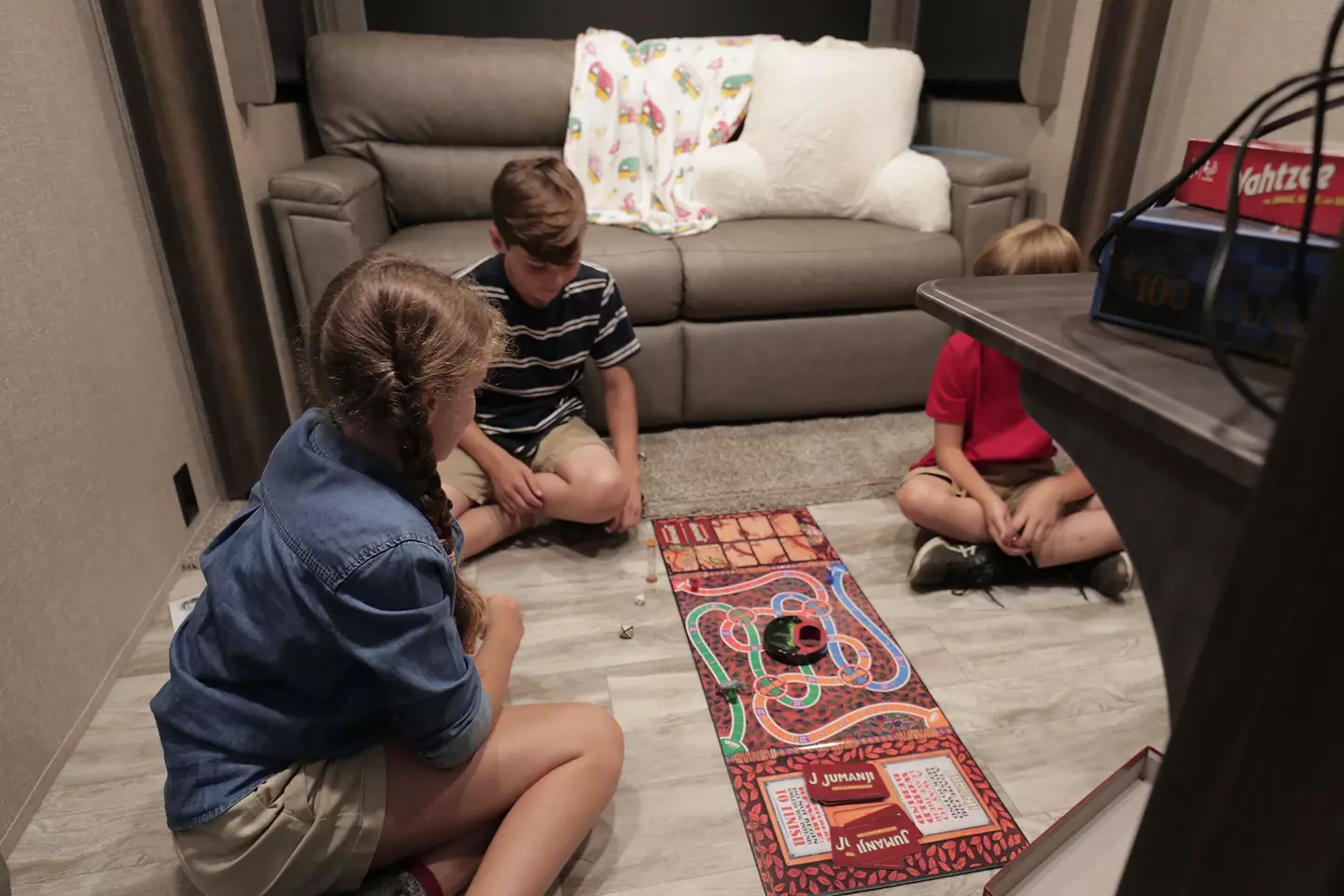
Make a list of necessary accessories
Buying an RV is just one piece of the road-tripping puzzle. There is a very good chance that you will need to invest in some accessories to get the most out of your new RV. Things like a sewer hose, drinking water safe hose, and a water pressure regulator may all be necessary.
Then there are the optional (but much more fun) accessories like an upgraded shower head, awning sunshade, shatterproof barware, or maybe even an outdoor projector.
There are many accessories out there. Make a list of the ones that are most important to you and your lifestyle, and leave room in your budget to purchase them before you set out on your first excursion.
?ts=1701373083613&$Blog-Image$&fmt=webp-alpha&dpr=off)
Don’t skimp on quality
Our final piece of advice is to pay attention to the quality of the product. Not only should the materials that make up your new RV be of the highest quality to increase the longevity of your purchase, it should also have been through a series of quality inspection gates during the manufacturing process.
Regrettably, most RV owners will tell you that they have to repair numerous major items missed by most manufacturers. This is why we have a 250-point inspection on every single one of our RVs. We didn’t just raise the bar for quality and excellence, we set it .
Visit your local Grand Design RV dealership and ask them about purchasing your first RV today!
Related posts
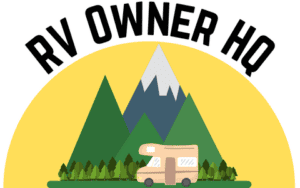
25 Important Beginner RV Tips No One Tells You
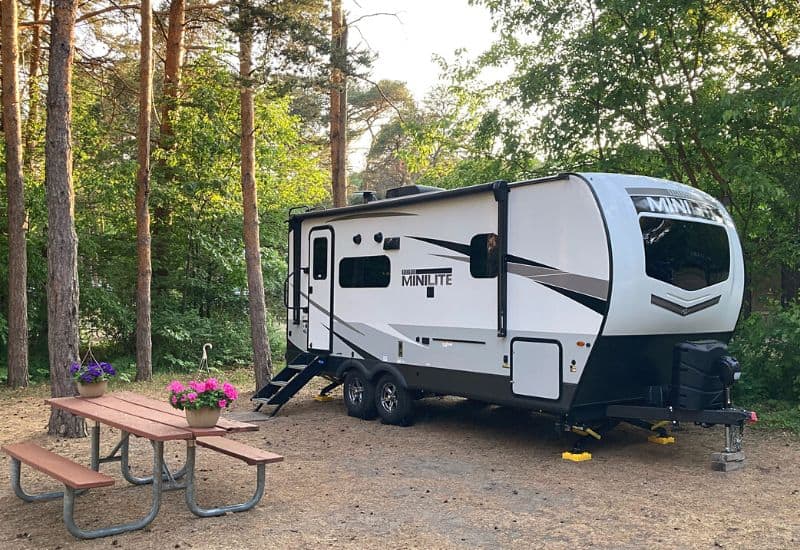
If you’re new to RVing, seeking out tips and tricks can make RV life easier, allowing you to learn from the mistakes of others.
The issue, however, is that most beginner RV tip lists focus on relatively obvious things that new RVers can quickly figure out on their own.
So, for this list, we consulted seasoned RVers and delved deep into our own experiences to compile these less obvious tips that RVers often have to learn the hard way over a lifetime of RVing.
1. Don’t Buy a Bunch of RV Accessories Before You’ve Made a Few Trips in Your RV
While it might be tempting to run out and buy a bunch of RV accessories and gadgets for your RV because you’re excited about the new RV and RV life.
It’s best to avoid most of these initial impulse purchases in the beginning, until you’ve owned your RV for a while and know what you really need.
This will save you a bunch of money in the beginning and keep you from filling your RV with a bunch of stuff you won’t use and didn’t need in the first place.
In fact, you might be surprised to learn that enjoying RVing often requires just a handful of items beyond the RV itself.
Basic RV Gear First Time RVers Actually Need
- Wheel Chocks
- Leveling Blocks
- RV Water Hose
- RV Sewer Hose
- Surge Protector 30 Amp or 50 Amp (Depending on Your RV)
2. Travel Slower: Don’t Try and Do it All in One Trip
Probably the biggest mistake most first-time RVers make is trying to cram too many destinations and activities into a single trip.
And while I can understand why this happens, as new RVers want to try and experience as many things as they can in the few short weeks they have a year for vacation.
What often happens is everything just kind of goes by in a blur and the RV trip starts to look more like a to-do list that needs to be completed instead of a trip that should be enjoyed.
Instead, a much better way to RV is to travel slower, allowing you and your family enough time to really experience and enjoy each place you visit.
So for example instead of trying to cram Yellowstone National Park into a two-day trip, maybe spend a week there or more, so that you can really experience everything the park has to offer.
Also, don’t forget to schedule downtime into your RV trip as well, to just relax and unwind, so you don’t feel like you need another vacation just to recover from the RV vacation you were just on.
3. Don’t Leave Your Awning Out When Your Not Under It
While RV awnings greatly extend your RV’s living space, they can also become expensive and costly to repair if damaged, with wind being the number one cause of damage.
This is because an awning acts like a big sail on the side of your RV and one strong wind gust can bend the awning frame or arms or even completely rip it from its mounting brackets.
Which can cause all kinds of issues including damage to the fiberglass body of the RV, which can be very expensive to repair.
So to prevent all these issues, the best thing you can do is to retract your RV awning whenever you’re not under it or at a bare minimum at least when you leave your campsite .
Also, if you’re thinking I don’t need to worry about this because my RV has an awning wind sensor where the RV will retract the awning automatically if it senses wind.
It’s still best to retract your awning when you’re not under it, as these wind sensors are not foolproof and can malfunction.
4. Make Sure You Have a Spare Tire for Your Travel Trailer
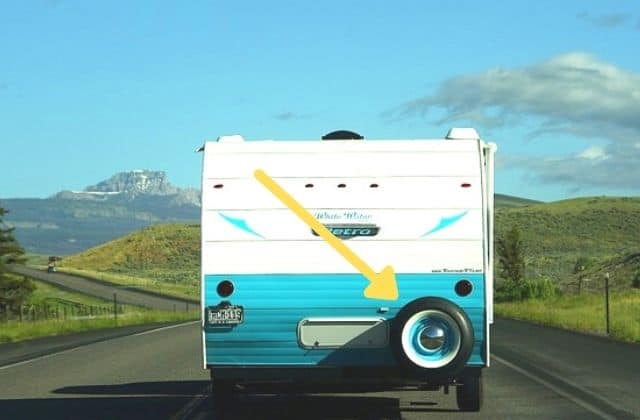
You might assume your travel trailer has a spare tire in or under it, but you’d be surprised at how many new trailers come without one.
And the last place you want to discover that your travel trailer lacks a spare tire is when you’re stranded on the roadside with a flat tire.
So, make sure to check if your travel trailer is equipped with a spare tire, and if it isn’t, invest in buying one for your trailer.
So if you do happen to get a flat tire in the middle of nowhere, you will have the spare you need to keep on rolling down the road.
5. Always Shut Your Water Off When You Leave Your Campsite
While it might seem like a nuisance to shut your water off every time you leave your campsite.
This one simple task can save you a lot of hassle and potentially costly repairs if something were to go wrong with your plumbing while you are away.
Because the fact of the matter is plumbing fixtures, pipes, and connections can and do fail all the time .
And while it might not be a big deal if you’re in or around your campsite and can catch the leak early.
If a plumbing issue occurs while you’re away for the day and no one is there, it can create a huge mess and potentially cause thousands of dollars in damage to cabinets and flooring.
So, before you leave the campsite, especially for the entire day, turn off the water to the trailer. You can usually do this by turning just one valve where the water enters the trailer.
6. Check the Air Pressure in Your Tires and Torque on Your Lugs Before Traveling
Before taking any major trip in your RV, you should always check the tire pressure in your tires and the torque on the lugs of your wheels, especially if your trailer has been in storage or sitting for a while.
This is important because you want to make sure that your tires are always at the recommended tire pressure per the manufacturer’s recommendations.
As this will go a long way in improving gas mileage as well as reducing the likelihood of a tire blowout while driving.
But don’t just stop at checking the tire pressure, as you should also check the torque on your lugs to ensure they are nice and tight.
And the best way to do this is by using a torque wrench like this popular one on Amazon .
Torque wrenches are great because they let you torque the lugs down on your wheels to the exact specification of the manufacturer, which you should be able to find in your RV owner’s manual or by asking your local RV dealer.
7. When Backing Up Make Sure to Look Up for Tree Limbs
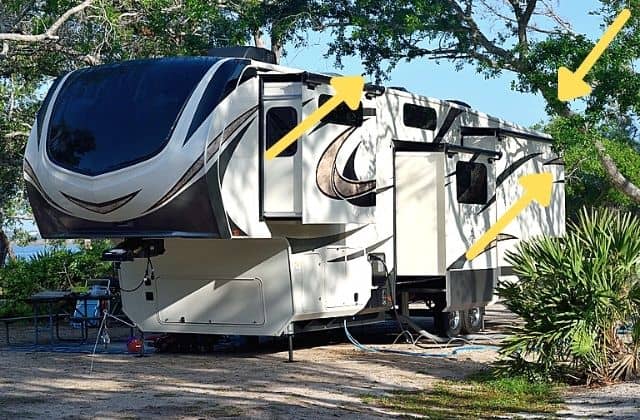
Often times when backing an RV into a campsite, we are looking for obstructions on the ground or at eye level but forget to look up for potential obstructions such as tree limbs or branches.
So it’s important to remember that most RVs are usually 10 feet or taller and it can be very easy to run out of clearance towards the top of the trailer especially if the campsite is heavily wooded.
In fact, this is one of the most common ways RV rubber roofs are damaged because it doesn’t take a very big branch or tree limb to puncture or tear an RV rubber roof.
8. Change the Smoke and Carbon Monoxide Detector Batteries After Storage
Something most RVers don’t think about is the batteries in their smoke detector and carbon monoxide detector because they rely on the beep of the device to tell them when it’s time to change the batteries.
The problem with this approach, however, is that RVs are often stored for long periods of time.
And the device’s tell-tale beep indicating a low battery might have been sounding for months while the RV was in storage, until the battery drained so much that it no longer beeped.
So when you take your RV out of storage for the new camping season, you think everything is fine but in actuality, you potentially have a completely dead smoke detector or carbon monoxide detector.
So when you take your RV out of storage for the camping season, be sure to replace the batteries in the smoke and carbon monoxide detector or at least press the test button to make sure they are both still operational.
9. Carbon Monoxide or CO2 Detectors Are Only Good for 5 Years
A fact that usually surprises most RV owners is that carbon monoxide or CO2 detectors are actually only good for 5 to 10 years, as the sensor that reacts with carbon monoxide becomes less sensitive over time.
So while that 7-year-old CO2 detector in your RV could be functioning fine, as it’s within the 5 to 10 year average life expectancy of a carbon monoxide detector.
In my opinion, it’s just not worth the risk to keep using a 7-year-old detector, as it also might not be working properly potentially putting you or your family in danger.
So if you own an RV that is older than five years, it’s a good idea to replace the carbon monoxide detector in the RV with a new one to provide the maximum amount of protection for you and your family.
And if you’re looking for a good replacement carbon monoxide detector, check out this popular one on Amazon by Kidde with over 15,000 reviews by clicking here .
10. Empty Your Black Tank First Then Your Grey Tank
While this might seem like a fairly obvious one to some, oftentimes new RVers don’t always get the best walkthrough of all the RV systems from their RV dealer.
So it’s worth mentioning for beginning RVers, that you always want to empty your black tank first then your gray tank, as the gray tank will help to flush out your sewer hose from the black tank dump .
11. Check Your Fluid Levels in Wet Cell Batteries Regularly
Wet cell batteries which are also known as lead-acid batteries are the most common type of RV battery, as they are reliable, time-tested, and cheap compared to more expensive RV batteries such as lithium batteries.
And if you have a wet cell battery in your RV, it’s a good idea to check the water level of the battery periodically to make sure the water level is where it should be for optimal battery performance .
If you’re unfamiliar with how to do this, just check out this super helpful YouTube video that provides a complete walkthrough on how to check the water level of the RV battery as well as how to fill the battery with distilled water if it’s low.
12. Plan Your Drive and Drive Your Plan
We all need a little spontaneity in our lives .
A place where it’s usually best to avoid a lot of impulse decisions though is when you’re planning or on an RV trip.
As a well-laid plan is one of the best ways to avoid unwanted surprises and ensure maximum enjoyment for you and your family while on your RV vacation.
And while it’s okay to interject a little spontaneity into your RV trip from time to time.
Once you’ve made your RV trip plan, try to stick to it as much as possible to help make sure the trip goes as smoothly as possible, which will help to reduce your stress and anxiety levels.
13. If Something Goes Wrong it’s Not the End of the World
Spoiler alert, if you have an RV and do a lot of RV travel, it’s not a question of if, but a question of when something will go wrong.
It’s important early on in your RVing journey to learn to roll with the punches and learn that when something goes wrong it’s not the end of the world and is just part of the journey.
So if something breaks, which it will, or something doesn’t go to plan, which it won’t.
Just remember to take a deep breath and remember that whatever breaks can be repaired and whatever didn’t go right can be adjusted for.
And that these little bumps in the road are often what we remember the most and look back on fondly when recalling a particular RV trip.
14. Check the Caulking and Rubber Roof Once a Quarter
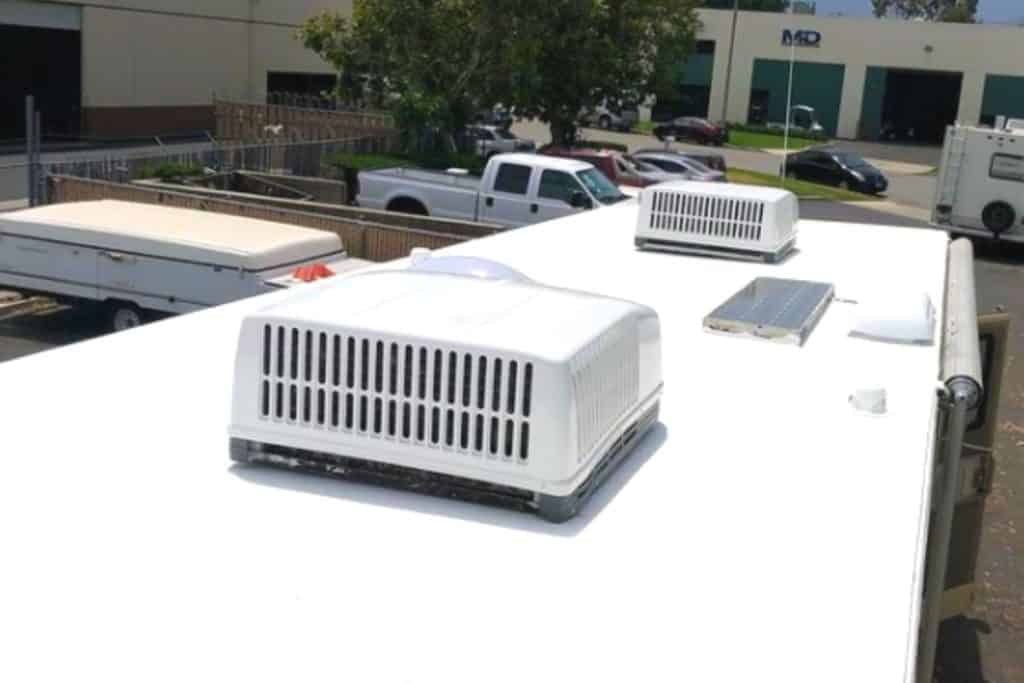
No matter what type of RV you have, it’s important to periodically inspect and walk the RV roof. (If the RV roof is walkable, which most are.)
The reason why this is so important is that the number one cause of RV damage is water damage.
And the most likely source of this water damage is the RV roof.
This is because most RV roofs with the exception of a few brands like Airstream which has an all-aluminum body and Scamp which has an all-fiberglass body will have a rubber roof that can easily be damaged.
So it’s important to inspect the RV rubber roof once a quarter, if not more frequently, to ensure there are no punctures or tears in the rubber roof that could have compromised the roof or caused a leak .
But you don’t want to just inspect the rubber roof, as you also want to inspect the caulking around all vents, pipes, and seams to ensure they all have a good bead of silicone or caulking around them, with no gaps or cracks .
If you want to learn more about your RV’s rubber roof and the best ways to care for it, be sure to check out our helpful blog post titled “ Why Do RVs Have Rubber Roofs “.
15. Check for Obstructions Inside and Outside Before Opening and Closing the Slides
There is perhaps no more terrible of a sound than a grinding or dragging sound when you’re opening or closing the slides on your RV.
So before you open or close your RV slides, be sure to check for obstacles or obstructions both on the exterior as well as on the interior of the RV.
Some of the more common obstructions to check for before opening or closing your slides are:
- Exterior tree limbs or branches near the slide could get in the way when opening the slide.
- Fallen debris on top of the slide that has been collected while you were camping could cause issues when closing the slide.
- Potential items that could have become lodged in or around the slide, especially under the carpet of the slide could drag across the floor when the slide is brought in.
16. Understand Off Tracking and Watch for Tail Swing When Turning
Most of us before we bought our first RV, were used to driving vehicles that were 20 feet or less, with a very short wheelbase, with little to no rear overhang.
So it can be a real adjustment when trying to learn how to drive a 30 or 40-foot motorhome or truck and trailer combo that has a very long wheelbase and a lot of rear overhang.
Especially when it comes to turning these larger rigs or motorhomes.
And when it comes to turning your RV the two most important things you need to be aware of are off-tracking and tail swing.
Off-Tracking
Off-tracking is where the front wheels of the RV turn on a different radius when compared to the drive axle or rear wheels of the RV.
And the longer the wheelbase your RV has the more pronounced the off-tracking will be, which is where many new RV drivers get into trouble.
Because new RV drivers don’t account for the off-tracking or different turning radiuses of the front and rear wheels of the RV.
Often turning the front wheels of the RV too early in a turn, which doesn’t allow enough clearance for the rear wheels of the RV to make the turn without running into an obstruction at the pivot point or rear wheels of the RV.
Most RVs have a considerable rear overhang beyond the rear axle of the RV, which can create a real issue of tail swing, especially when making tight turns.
As the rear overhang of the RV will swing out in the opposite direction from the way you’re turning potentially hitting an object that might be near the RV.
So it’s very important to be mindful of your surroundings as well as your tail swing when navigating your RV in tight spaces.
17. Chock Your Wheels After Leveling and Before Disconnecting
Even if the ground or campsite you’re parked on seems level.
Always chock your trailer wheels after you’ve leveled the RV and before you disconnect it from your tow vehicle .
As even just a few degrees of slope can cause an RV to roll or shift from its original position even if the leveling jacks are down, which can be very dangerous.
18. When Buying an RV Don’t Overspend and Buy the Smallest RV That Will Fit Your Needs
Often when RV beginners are looking to buy their first RV, they will overspend and buy an RV far larger than they actually need.
Which can leave the new RVer cash strapped and with an enormous RV that is hard to navigate and fit into smaller campsites, limiting the number of places they can take the RV and camp.
So remember when shopping for RVs, that the RV is a means to an end which is traveling and living the RV lifestyle and not the end goal itself.
19. Make Sure Your Glass Shower Door Is Latched Before Leaving
While this one might seem kind of trivial, it’s actually very important to remember to latch your glass shower door before travel.
As these glass doors can easily shatter or break during travel if not properly secured.
And if they do break this can often be a very expensive repair, because the glass door usually has to be custom-made to fit the particular shower stall dimensions of our RV.
20. Remove the Glass Plate in the Microwave Before Traveling
Another one that might seem kind of trivial, is remembering to secure or safely store the rotating glass plate inside the microwave before traveling.
However, if you’ve ever tried finding and replacing a broken microwave glass plate before you know what a nightmare this can be, as each microwave and manufacturer uses a slightly different glass plate in their design.
Often requiring you to special order the plate directly from the manufacturer if it breaks, which might not even be possible depending on how old your RV and microwave are.
21. Keep an RV Journal
Keeping a journal for your RV adventures is more than just a way to preserve memories – it’s a practical tool that can enhance your RVing experience in multiple ways.
If you’re not sure what to put in your journal here are some of my personal favorites.
What to Keep in Your RV Journal
- Trip Documentation : Your RV journal can serve as a chronicle of your travels. Record the dates, locations, and duration of your trips. Include details like the weather conditions, scenic spots, and even those little off-the-beaten-path discoveries. It’s not just about where you went, but the experiences you had along the way.
- Campsite Details : Jot down specifics about the campsites you visit. Note the site number, the amenities available, the quality of the site (like shade and levelness), and any nearby attractions. This information is invaluable for future visits and can also be shared with fellow RVers.
- Maintenance Logs : Keep track of any maintenance or repairs you perform on your RV. Note the date, what was done, and perhaps even where you purchased parts or received service. This log is incredibly helpful for keeping your RV in tip-top shape and can also be useful for warranty purposes or if you decide to sell your RV.
- Budget Tracking : Use your journal to track expenses related to your RV trips. This includes campsite fees, fuel costs, maintenance expenses, and any other costs incurred. It’s a great way to manage your budget and plan for future trips.
- Neighbor Notes : Often in your travels, you’ll meet fellow RVers who can share tips, routes, and must-visit locations. Record the names and contact information of these new friends, along with any recommendations they have. It’s like building your own personal RV community.
- Personal Reflections : Finally, don’t forget the personal aspect. Write about your feelings, the sights that took your breath away, the quiet moments of sunrise or the fun evenings by the campfire. These personal reflections turn your journal into a cherished keepsake that captures the essence of RV living.
22. Invest in a Good GPS Designed for RVs
When you’re on the road in your RV, having a reliable GPS designed specifically for RVs can be a game-changer.
These GPS systems are more than just your average direction-giving devices; they’re like a trusted co-pilot tailored for RV travel.
As they provide routes that are specifically suitable for your RV’s size and weight.
This means you’ll be steered clear of those low bridges, narrow lanes, and roads with weight restrictions that can turn a leisurely drive into a stressful ordeal.
Then there’s the matter of specialized alerts.
An RV GPS doesn’t just tell you where to turn; it warns you about sharp curves ahead, alerts you to steep inclines, and can even provide real-time traffic and weather updates.
One of the best things about an RV GPS though is its in-built database of campgrounds and RV parks.
Imagine having a comprehensive guide to potential stopovers right at your fingertips, especially handy when you’re venturing into unfamiliar territory.
If you’re looking for a RV GPS recommendation, one of my personal favorites is the Garmin RV 795 GPS Navigator, available on Amazon .
23. Regularly Exercise Your Generator
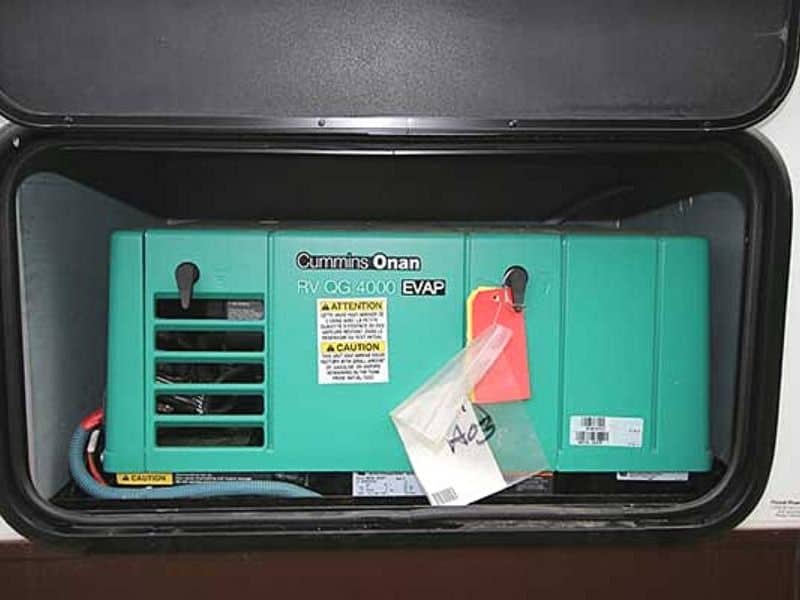
Maintaining the generator in your RV is just as important as taking care of the engine that drives you down the road.
Regularly exercising your generator plays a crucial role in ensuring its reliability and longevity.
It’s not just about running it when you’re out on a trip; it’s about keeping it in prime condition all year round.
When you run your generator regularly, you’re essentially keeping all its components in motion and well-lubricated.
This is important because, over time, the internal parts of a generator can seize up or deteriorate if not used.
Another aspect to consider is the fuel. Running the generator helps in using up the fuel before it goes stale, which is especially important if you’re not using your RV frequently.
Stale fuel can lead to a host of problems, from clogged fuel lines to difficulty in starting the generator.
The rule of thumb is to run your RV generator for about an hour each month, ideally under load. This means turning on a few appliances inside the RV to ensure the generator is doing some work.
This practice ensures that when you really need your RV generator – whether it’s for powering your AC on a hot day or keeping your fridge running during a stopover – it won’t let you down.
24. Know Your RV’s Height and Width
It’s crucial to know your RV’s exact height and width. Write it down and keep it handy in the driver’s area.
The height of your RV is particularly crucial.
Many new RVers learn the hard way that not all bridges or overpasses are made the same.
There’s nothing more heart-stopping than approaching an overpass and not being sure if you can fit under it.
Low clearance bridges can cause significant damage to your RV if not navigated correctly. This is where knowing your RV’s height – and keeping this information readily accessible in the driver’s area – becomes invaluable.
It’s a simple step that can save you from costly and dangerous mistakes.
But it’s not just about height. The width of your RV also plays a big role, especially when navigating through tight spots like narrow roadways, campsite entrances, or even toll booths.
Knowing your width helps you understand how much space you need to maneuver, ensuring you don’t scrape or bump into obstacles.
25. Pack a Basic Tool Kit
Always have a basic tool kit on hand. It’s essential for dealing with those unexpected minor repairs that are part of RV life.
The open road can be unpredictable, and a well-equipped tool kit can be the difference between a quick fix and a trip-derailing problem.
A screwdriver set is a must-have in your RV tool kit. You’d be surprised at how often screws can loosen from the constant vibration of travel.
Don’t forget a good set of pliers. From gripping to twisting, they’re invaluable for various tasks, whether it’s a plumbing fix or adjusting a loose connection. Similarly, an adjustable wrench set is crucial for dealing with nuts and bolts of different sizes. It’s handy for tasks ranging from tightening bike racks to fixing a loose battery connection.
Duct tape is another hero of the RV world. Its versatility is legendary – from temporarily fixing a broken hose to patching up a tear in your vinyl seat, duct tape can provide a quick solution until a more permanent fix can be made.
Lastly, it’s wise to include some basic electrical tools and supplies, like wire cutters and electrical tape. Electrical issues are not uncommon in RVs, and being able to perform a simple fix can be a lifesaver.
For a list of must-have RV accessories, every RVer needs to have, check out our article “ 20 Must Have RV Accessories Under $20 “.
Jason is an avid lover of RVs and the RV lifestyle. He is both a writer and editor for RV Owner HQ and has been RVing and camping for over 20 years.
Recent Posts
47 RV Storage Ideas to Maximize Your Space for Compact Living
Camping and living in an RV is an incredible adventure, but it comes with its fair share of challenges, particularly around storage, due to the lack of space. Because of this, it's a must to make...
23 Inspiring Farmhouse RV Decors to Transform Your Camper
Are you looking to give your RV a cozy, rustic makeover? If so, farmhouse decor is the perfect style to transform your camper into a warm and inviting home on wheels. In this blog post, I'll...

7 Best RV’s for First Time Buyers
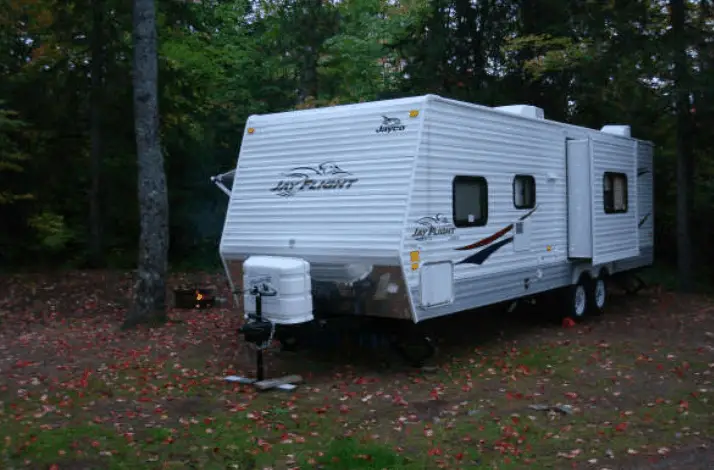
- BUYERS GUIDE
G. Yoganand
RVs come with the promise of at-home comfort and the lure of open-road adventure, making them a favorite for camping enthusiasts. However, buying your first RV might be an overwhelming process.
Purchasing an RV might seem intimidating, but it doesn’t have to be. You just require to be clear about your goals for RV life and adventure. Don’t break the bank, instead prioritize good trade-in value with this list of the best RVs for first-timers.
While most people use RV to refer to motorhomes, I have picked the best RV’s for first-timers of all types; pop-up camper, motorhome, fifth-wheel trailer, campervan, etc. Here is an exclusive review of the best RVs for first-timers.
What Type of RV Should a First Time Owner Buy? (Towable or Motorhome)
There is nothing better than the pleasure of traveling in an RV. Towing or driving a small home on wheels is a great experience that most individuals are currently seeking. However, when buying an RV, which type is the best for first-timers?
Motorhome RVs are the campers with engines. They provide all the driving and living functions under the same roof without the hassle of towing the trailer. The popular types of motorhome RVs include; campervans, Class A motorhomes, Class B motorhomes, and Class C motorhomes.
Class A is the big and luxurious buses; Class B is the large vans with slide-outs, while Class C is the ones with pickup truck frame design.
Towable RVs are travel trailers that need a tow vehicle to move from one place to the other. The size of the car or truck required depends on the weight and size of the towable RV.
You can always choose from the five towable RVs available; travel trailers, fifth–wheel, truck camper’s sport-utility trailers, and pop-up campers.
Driving a motorhome is more comfortable for first-timers as the living area, and engine are in a single-vehicle, particularly those not used to maneuver and turn with a vehicle in tow.
On the other hand, towable RVs are cheaper, and the lack of an engine means you don’t have any trouble to worry about.
Once you get to the destination, you can unhitch the travel trailer and explore the surrounding with the tow vehicle. Overall, both types have their pros and cons, and any can be great for first-timers depending on their preference.
Important Things to Consider (For First Time Buyer) Before Buying
Before you go out looking to purchase an RV, there are essential factors you should consider. These include;
The first thing to consider is the type of RV you are looking for, motorized or towable. If you choose on a towable RV, you will have various choices, including; Pop-ups, folding camper, travel trailers, fifth-wheel, expandable, or Toy Hauler. If you go for a motorized RV, you can choose a camper van, motorhome class A, B, or C.
Like purchasing any other commodity, you require a fixed budget on how much you are comfortable spending on an RV. This will also go a long way in narrowing down your available options.
RVs come with different built-quality, which is often reflected by the price. You can choose from different frames, including steel, aluminum, or a combination. For a tight budget, you can opt for lower quality RV mainly if you will just be using it once in a while; a quality RV may be suitable for those with frequent needs.
However, regardless of the quality, you should always maintain a safe budget.
As earlier stated, it is important to consider how often you will be using your RV. Are you planning to live in your RV or take the family for several weekend vacations during the summer? If you are traveling for months during your camping adventure, you will need a quality RV that can withstand that type of travel.
Floor plans
RVs come with different floor plans; hence it’s always essential to conduct some research. Floor plans usually have four main sections in all RVs; kitchen area, living area, bath area, and sleeping area.
You should hence consider the number of people the living room will be accommodating, how many people the kitchen will be cooking for, how many people need to sleep depending on the sleeping space, and the shape and size of the bathroom. Small RVs can sleep 1-6 people, while larger RVs can sleep up to 12 people.
Another significant factor to consider is the amount of storage space available on the RV, particularly if you live in it. How many people are you taking with you for camping? Can your cooking utensils fit, how much clothing can you store? Are you traveling with pets? Is there a vacuum room if required?
When you travel for days you will want that home like amenities, specially if you have family/kids with you. Things like air conditioner, furnace, refrigerator make your life much for easier and comfortable.
Bathroom, shower inside an RV will allow you to travel with more freedom. Some small RV types like pop up camper, teardrop trailers do not come with bathroom. Also, compact small travel trailers are also built without bathroom.
Have a close look at all the features and amenities the RV provides and then only select it. Obviously, more features you want, more will be the cost of the RV. Therefore, have a perfect balance between what features you want and how much you want to spend.
Best RVs to Buy For First Time Buyers or Newbies
Lets see some of the best RVs newbies can buy. Here, i have included RV’s from different types like travel trailers, motorhomes, pop up campers and fifth wheel. As we already saw, there are different things that come into play for individuals to select a type of RV. If you are comfortable with towing then you can either go for travel trailer, pop up camper or fifth wheel.
Choosing between these too is again dependent on things like whether you own a truck or a smaller car that can tow limited capacity. Fifth wheels can be towed by trucks only, you can’t use car for towing them.
Similarly, in case of motorhomes, if you want it for large family then Class C is a better option. Class B are easy to drive but are mostly suitable for couple or small family with one kid.
Getting a class A motorhome means you have to shell out more than 100K but you get good luxury with large sleeping capacity.
Here are 7 best RV’s for first timers.
1. Jayco Jay Sport Camping Trailer
At the top of our list is the Jayco Sport Camping trailer. You probably begin to understand why if you walk through the various campgrounds in the summertime.
This intuitive and low-profile, easy-to-use pop-up design makes it among the best RVs for first-timers who don’t want to fill their home parking space or empty their wallets.
While it does not include many motorhomes and fifth-wheels comfort features, it is more compact, maneuverable, affordable, and fuel-efficient. This Pop-up RV is tight, smart, and can sleep four to seven people comfortably depending on the floor plan.
The floor plans range from 11’ to 18’ in length. The pop-out bedrooms feature removable privacy panels. Even more, the swing-galley kitchen with a carry-out stove, a sink, and cabinets makes cooking easy.
2. American Coach Patriot
While its price is on the high end, the Coach Patriot is an exceptional RV for first-timers. It is topnotch for first-timers when trading in for bigger RVs. As a class B campervan, it is easy to drive or park, similar to a minivan. This makes it perfect as a hobby vehicle of choice for families.
This campervan is ideal for individuals and couples who require to participate in van life and do not want to design the van from scratch themselves.
This American Coach Patriot has been built on a Mercedes-Sprinter van chassis with a stunning and customizable interior.
The campervan sleeps two adults comfortably and up to four with a push, but you can customize it with different floor plans. Similar to most Class B RVs, this camper features stability control and front airbags.
The campervan has become popular in social media celebrity movements for its sleek appearance and performance. It also performs considerably well when it comes to boondocking.
3. KZ Sportsmen Classic
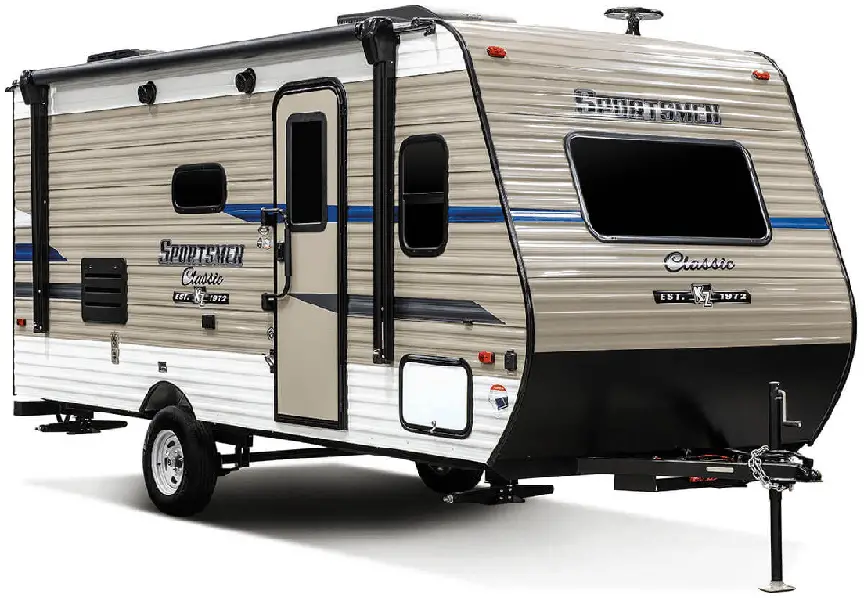
Another excellent RV for beginners is the KZ Sportsmen Classic, an ultralight and budget-friendly travel trailer packed with features to ensure you enjoy your camping adventure.
It comes with ideal floor plans ranging from 23 feet 2 inches to 18 feet 11 inches in length. With a weight of 2790 to 3400 pounds, this makes it one of the lightest travel trailers that you can easily tow, even with an SUV, minivan, or any other small vehicle.
This travel trailer’s standard features include; a spacious sleeping area, extra USB outlets, sufficient storage, and a full-size shower. The smallest floor plan provides an outdoor kitchen.
Other floor plans offer pass-through storage for additional camping equipment such as bikes and more. With lots of lightweight and easy options to choose from, this KZ Sportsmen Classic is highly rated among the best first-timers travel trailers.
4. The Crossroads Volante Fifth Wheel RV
If you are searching for an affordable, spacious, and comfortable Rving option for family or group camping, the Crossroads Volante is the best option.
This model sleeps up to ten people with a dimension of 12 feet tall and 30.5 feet long. A master suite is located at the opposite end of the fifth-wheel from the bunk beds, ideal for parents’ privacy.
Even better, this fifth wheel model comes with durable and elegant stainless steel appliances. The full bathroom, U-shaped kitchen table, tri fold sofa, and flat-screen television completes its luxurious interior. The Crossroads Volante weighs 7,838 lbs. making it compatible with lots of muscle trucks.
To take care of the needs of camping enthusiasts, this fifth-wheel is well designed for dry camping. It has a 51-gallon freshwater together with a 51-gallon grey water tank and a 78-gallon black water tank.
This makes it perfect for people who love boondocking and want to explore various state parks, national parks, and national forests. As an affordable, camping-ready RV option, it is perfect for first-timers who want comfort for their large families or group and don’t want to break their banks.
5. Jayco Hummingbird
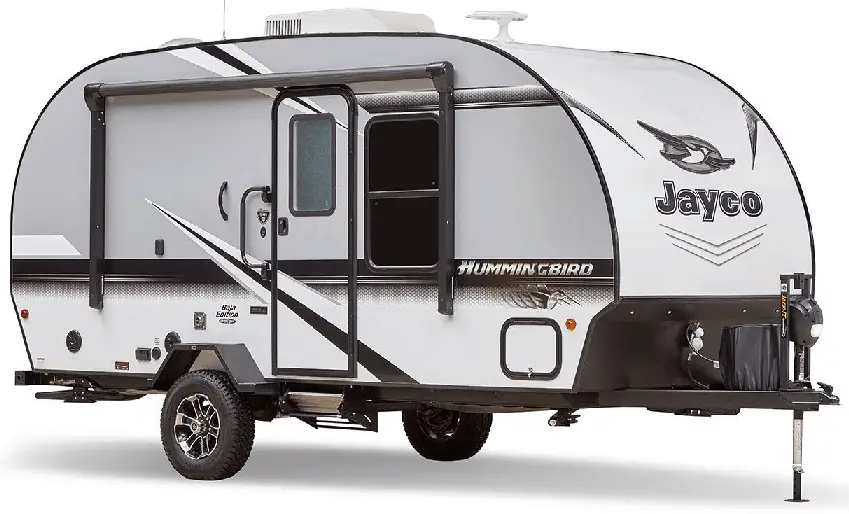
Yet another best RV for beginners from Jayco, the Jayco Hummingbird. This is one of their lightweight collections ranging from 2000 to 3950 pounds. This means that most of them can be towed with a minivan or an SUV. It has floor plans that run anywhere from 13 to 20 feet in length, depending on your needs.
The kitchen has all the features you need to prepare a tasty meal while you hit the road. It is well furnished with a two-burner stove, fridge, microwave, and storage ready for cooking. Also, it has a bathroom covering all the bases, including a toilet, a shower, a sink, and an underneath storage. A large linen closet in the bathroom is an additional of its rare features to find in other travel trailers.
This trailer comes with a large dinette in the living room ideal for relaxing after an exhausting day of exploring. The dinette can also change into additional sleeping space for two, with the overhead storing room overhead the dinette being ideal for games, flashlights, and other things.
The sleeping area features a convenient queen-sized bed, edged with two windows to let in cool breezes as you relax, and an above your head storage to keep your possessions. The Jayco Hummingbird is one of the best beginner travel trailers for campers who love hitting dirt roads.
6. Coachmen Apex Nano
Last but not least is the Coachmen Apex Nano 15T, the lightest and smallest travel trailer in the Apex line. This trailer has been designed with small families and adventure travelers in mind.
With a dry weight of 2862 pounds and a length of 18 feet, 7 inches, this travel trailer is easily towed by minivans, half-ton trucks, and SUVs with a towing capacity of 4,000 pounds and above.
The Coachmen Apex Nano 15T layout has twin rear bunk beds and a front sofa bench that changes into a 60-by-80 inches bed. The kitchen comes with everything you need to prepare a delicious meal on the road. It includes an under-mount sink, a fridge, a stovetop, and a built-in microwave.
The highlight feature of this travel trailer is a fold-out camp kitchen for cooking outdoors. More so, this travel trailer has a rear bathroom that features a shower, a dry tub, a skylight for additional natural light, and a toilet.
What makes this Coachmen model great for first-timers is that it can be outfitted with additional off-the-grid features, including dual LP tank capacity for extended camping time, solar panels, a front bike rack, all-terrain tires, and a toy lock cable system.
7. Newmar Dutch Star motorhome
Newmar is among the most reputable RV companies, and the Dutch Star model is one to beat. If you are thinking of spending significant camping time or are traveling with many people, the comfort, size, and technology of this Class A motorhome will make your camping experience more enjoyable. Although it takes some skill to park and drive, it is easier than other comparative motorhomes.
This Newmar Dutch star is large enough for a couple or a small-sized family with kids to live in during the camping adventure. It is a rear-engine 450 –horsepower diesel pusher with floor plans ranging from 37′ to 43′ that sleep 4-5 individuals. A half-bath and a full bath easily house a small family.
The superb interior features wooden cabinets with a range of finishes, a Bose sound system, a 4k flat-screen television, and comfortable furniture. Even better, a Cummins Onan generator offers convenient power.
For a Class A motorhome, this model is relatively affordable, making it a perfect option for first-timers who want good trade-in value.
Should You Buy Used Instead?
The best advantage of purchasing a used RV is the price. Like cars, RVs’ cost starts to depreciate as soon as it is bought; hence, used models are a cheaper alternative.
While it is common to hear stories from individuals purchasing that the new RV has issues after issues, owners of used RVs have already taken care of any factory problems. Even better, owners sometimes might have already paid for upgrades to their RVs after purchasing new, meaning used models are often more and better-furniture than new ones.
On the other hand, there are some disadvantages of buying a used RV.
- You may get a great RV at an affordable price, but you might not be sure whether it is being sold due to mechanical problems.
- The owner might have traded it because of various mechanical issues.
It is hence advisable to always ensure you find a reputable and honest dealer for any RV transaction. If you are a first buyer and you are not sure of the RV type you want, it may be better to begin by buying a used RV.
Renting an RV before buying
I’ll tell you one more secrete on how to choose the best RV as a first time buyer. Rent different RV types, models for few weeks. Try different types and see how it works out for you. Buying an RV is a big investment and you are going to use it for long term so why not try out before buying.
Renting an RV has become very popular and people rent out their RV on platforms like RV Share or outdoorsy. So, why not take advantage of this and decide on that hundred thousand dollar buy that way. Salesman will always talk positives about the RV’s they want to sell.
I hope this guide will help you buy the best RV that is perfect for your needs. If you are considering an RV for the first time, the best bet is to explore the different models at RV shows and dealerships and rent one or two to test drive the type you think you prefer. Nevertheless, buying any of the above-reviewed RVs will not get you disappointed. But, remember to put all the discussed factors into consideration.
You Might Also Like
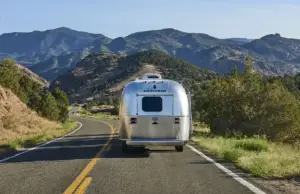
11 Best Travel Trailers for a Family of 4
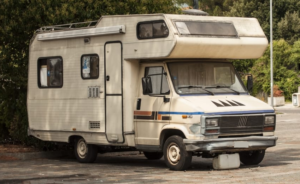
Are old RVs worth buying?
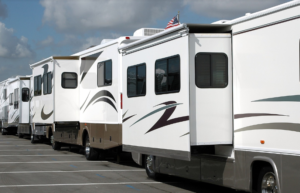
17 Tips for buying a used RV or trailer
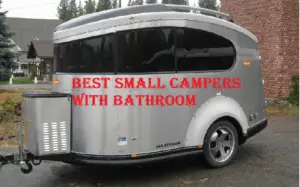
13 Best Small Camper Trailers With Bathroom
A Beginner’s Guide to Buying a Travel Trailer
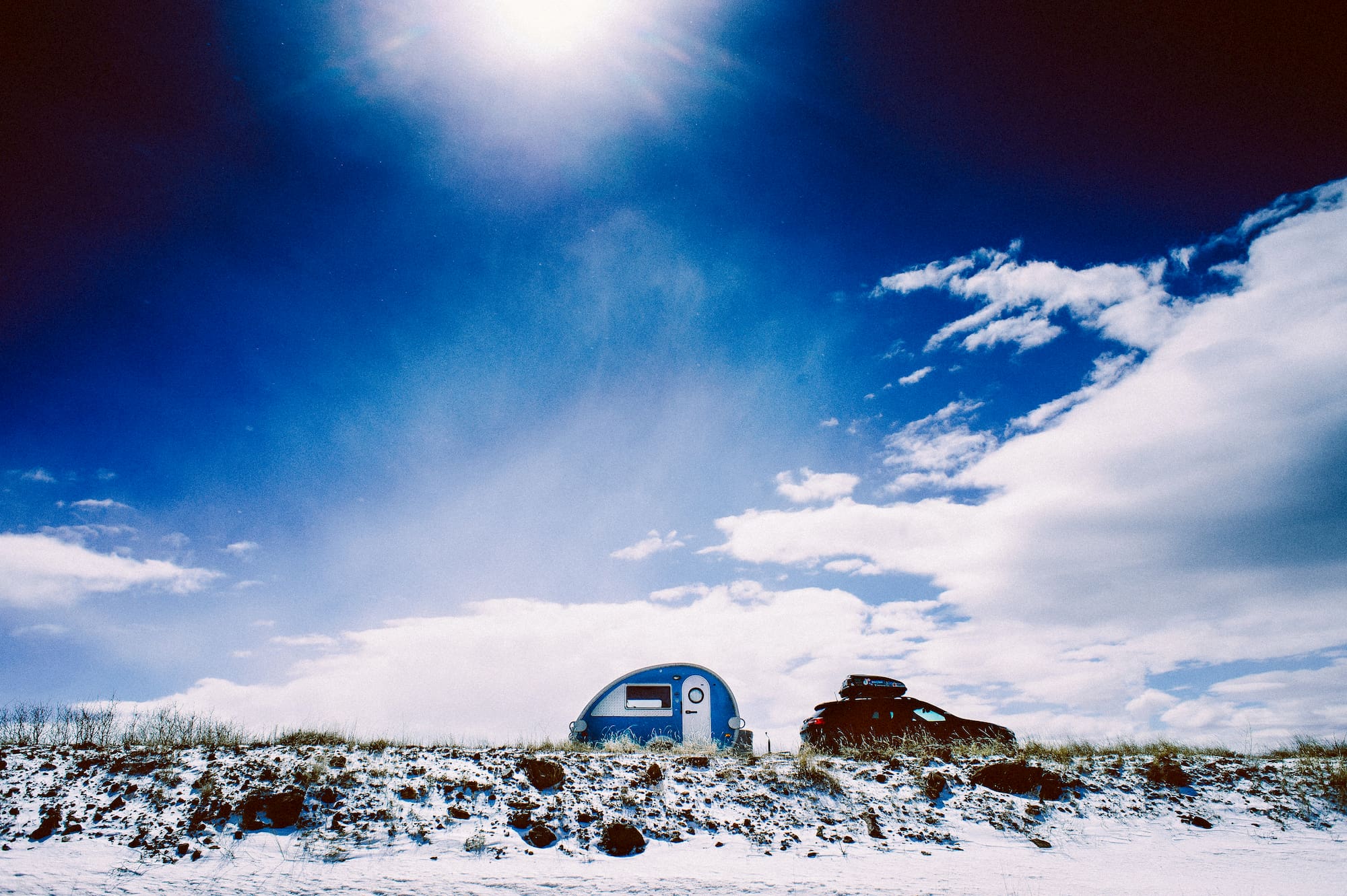
Buying a travel trailer can seem intimidating, but with the right information, it can be an exciting and empowering decision. It’s all about figuring out which type of trailer is right for you, and finding the features that best suit your lifestyle. We’ve asked expert travel trailer owners their best advice for buying a travel trailer
10 Pieces of Advice From RV Experts When Buying a Travel Trailer
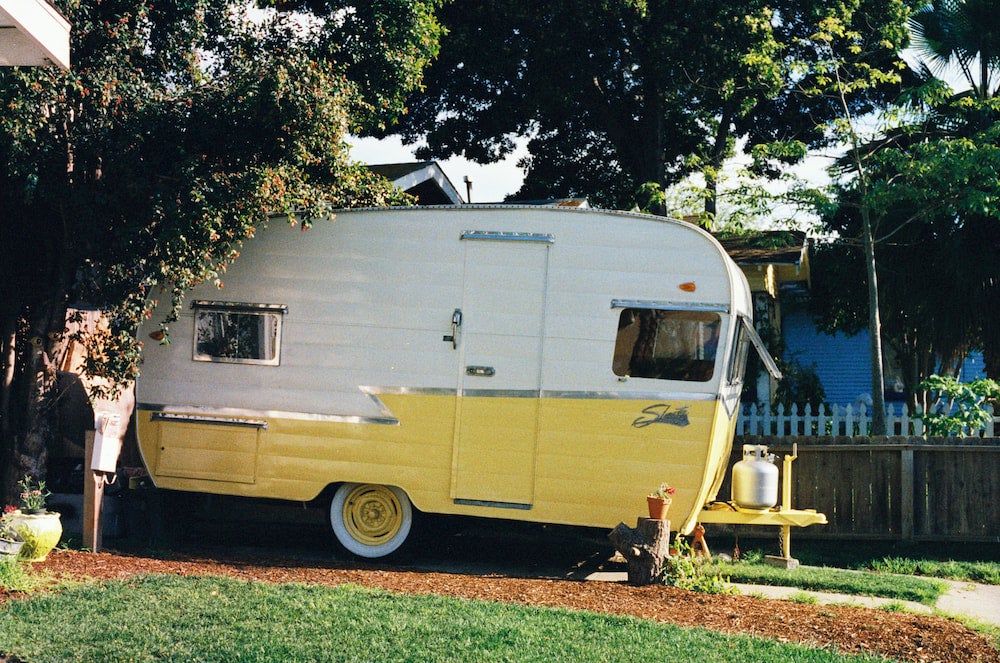
Travel trailers are one of the most popular non-motorized RVs. They have solid walls, hitch to a car or truck and come in all shapes and sizes. They are safe and typically have slide-outs to create wide-open living spaces.
There’s a lot to think about before buying a travel trailer, but check out these tips to help guide your way.
1. Decide on Size
You’ll need to decide which travel trailer is best for you, not just aesthetically, but the exterior size and interior dimensions. Make sure to choose a travel trailer that your car or truck can pull. You don’t want to purchase a travel trailer that’s too heavy to tow.
You’ll also want to make sure the trailer’s floor plan fits your needs. It should have enough space for the items you want in the trailer. Make a list of assured items you’d like to bring and make sure you have plenty of space. You’ll also want to make sure that the bathroom and shower are large enough for you.
2. Make Sure You Have Enough Storage
While you shouldn’t overpack your travel trailer , storage space helps keep you organized and keeps clutter away, so always look for more storage opportunity when buying a travel trailer.
The Easy Way to Find Last-Minute Campsites
Did you know some campers have:
- Pre-saved lists of hand-picked free camping across the US
- Text messages for last-minute openings
- Scans set up for National Park site openings
This is the easiest, most surefire way to find last-minute campsites every time, and it’s all included in the #1 camping membership called The Dyrt PRO. It costs just $35.99 per year and is an easy way to make sure you have better camping trips every time — and that you can actually find a spot last minute.
You can check it out for free today , you can even use it for free for 7 days to make sure you like it. After the trial it is $35.99 for a full year — most campers find it pays for itself after a night or two. If you camp more than 2 times per year, it may be perfect for you.
3. Look for Damage Before Buying (Aesthetic)
On the interior of the vehicle, walk the floor and corners with bare feet. It can be a great way to check for damage. Make sure to check the cabinets and other storage areas for damage as well.
Before buying, make sure to get the breaks, axels, tires, rear bumper and front towing capacity checked out. Also check the seals and locks on doors as well as utility connections and hookups.
4. Look for Damage Before Buying (Mechanical)
It’s also important that all operational systems such as electrical, water, sewer, and mechanics are functional before buying your first travel trailer.
5. Choose a Travel Trailer Based on Your Lifestyle
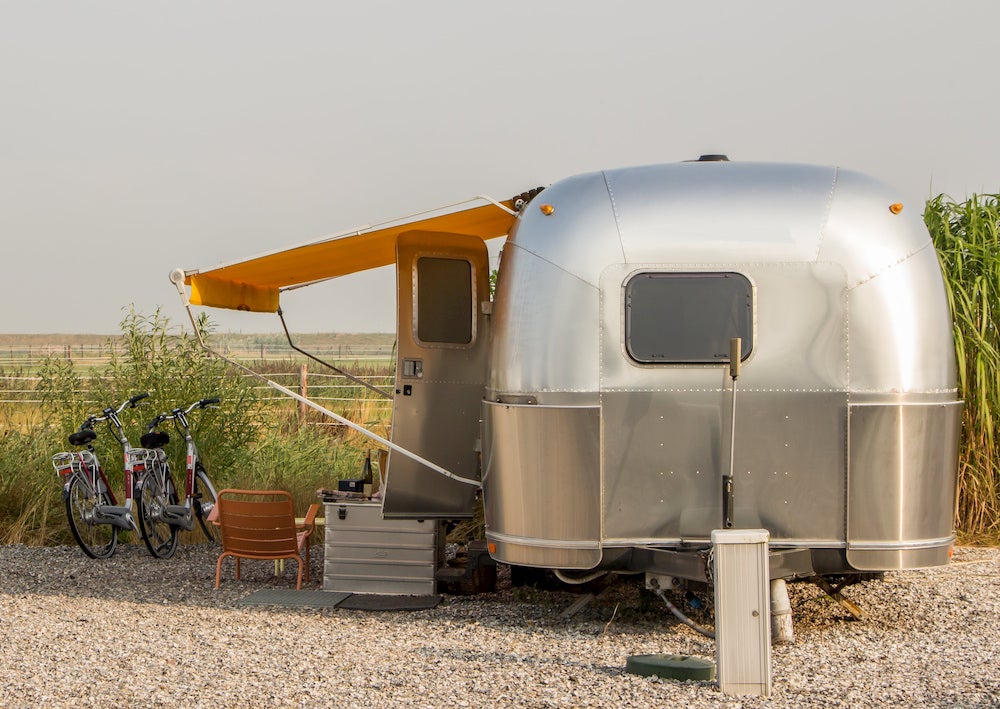
Think about what you plan to use you travel trailer for. Will you want a 4 season trailer for winter? Think about the size of trailer you’d like based of the number of people that will typically be inside the vehicle, and consider your own height
6. Check How The Drain System Works
Check if the drain system is a strait shoot to waste tanks or a system that twists and turns and could have clogging issues.
7. Match Your Towing Vehicle to Your RV
Make sure your vehicle is rated to tow the gross weight of your trailer, plus the estimated weight that will be loaded into the trailer.
AAA, recommends adding 1000 pounds to the labeled dry weight, for all of the items that will go inside the trailer.
8. Buy Used and Get and an Inspection
Some people appreciate having a new vehicle. But when buying a travel trailer, it may be in your best financial interest to find one that is used.
As a first time buyer, if you realize over a year that it’s not the right vehicle for you, you can always sell it and not lose a ton of money compared to buying new. Make sure to get it fully inspected before you buy.
9. Rent a Few to See What You Like
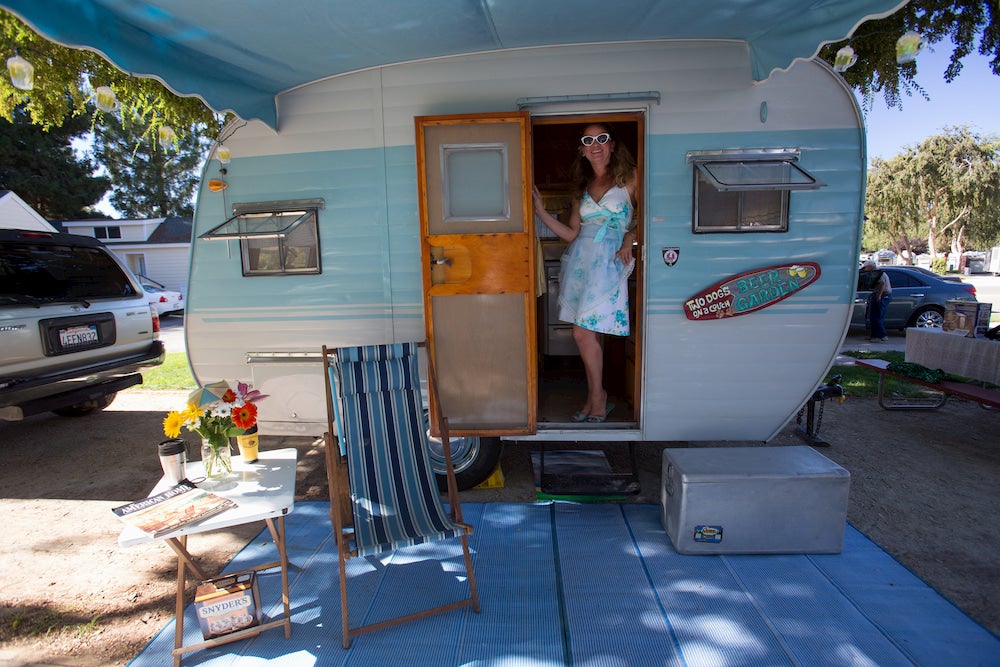
It’s hard to know exactly what you want in a travel trailer when it’s your first time buying one. Some great advice we’ve received from travel trailer owners is to rent a few RVs first to get an idea of what you like. And who knows, maybe the lifestyle is not for you and you could save some money. Renting can help you determine the size and style you like best.
10. Have a budget for repairs
Financial responsibility shouldn’t be in your rear-view mirror when buying a travel trailer: you should set aside some money for repairs. It’s as simple as that. Mobile RV repair can help in a pinch, but the peace of mind offered by that security will make your first trip that much easier.
Popular Articles:
- Get the Latest 2023 Camping Travel Trends
- How To Find Free Camping in National Forests
- The Checklist Every First Time RVer Needs
- Find Free Camping With The Dyrt Map Layers
- The Ulimate Boondocking Guide To Free Camping
- Everything You Need To Know About Wifi For Your RV
- 7 of The Best Overland Routes in North America
- 14 Wilderness Survival Tools You Should Have in The Backcountry
- Here's What To Add To Your Primitive Camping Checklist
Emily Gallegos
Emily Gallegos is a travel-lover, backpacker and is generally curious about all this world has to offer. She grew up in the front range of Colorado where she fell in love with snowboarding, fishing and being outside as often as possible. She has studied Spanish in Spain and Argentina and has written for magazines in Boulder, CO such as Elevation Outdoors.
More Articles

California Campgrounds Are the Second-Most Competitive in the U.S.
PORTLAND, Ore., March 26, 2024 — The Dyrt, the No. 1 app for camping availability, photos and reviews, found in its 2024 Camping Report presented…
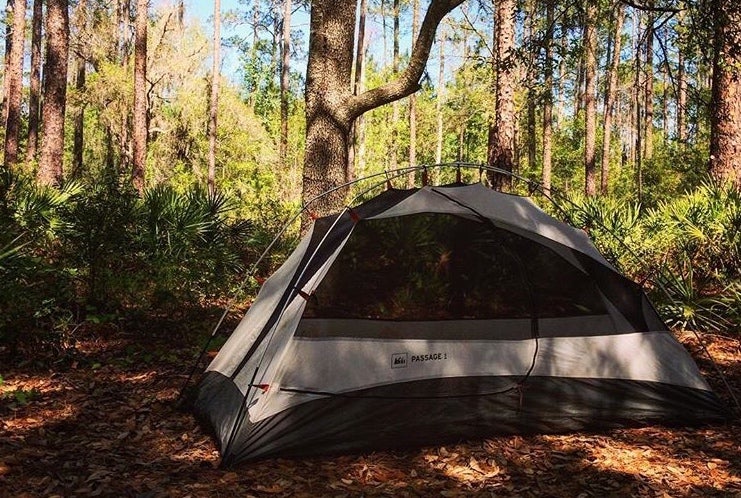
Find Free Camping In Florida, From the Panhandle to the Everglades
Free camping options can often leave campers with a not-so-serene view of the wilderness from a Walmart parking lot—but not so in Florida. Thanks to…

Buying Guide For A First Time RV Or Travel Trailer Purchase
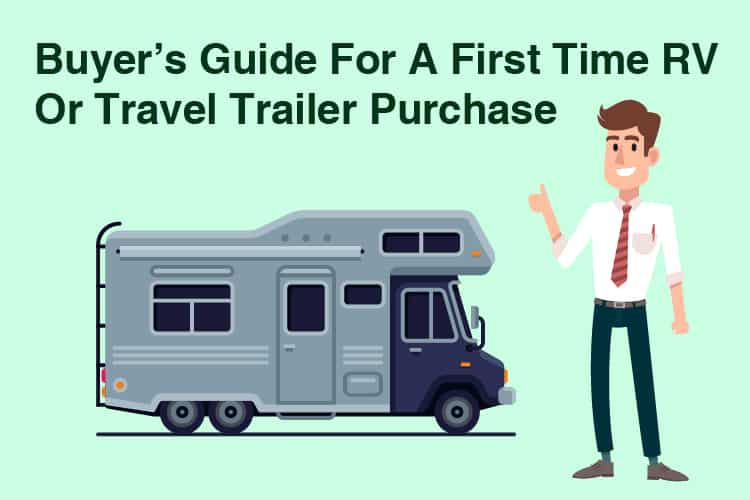
If you’re considering buying an RV or trailer, you have a lot to think about before parting with your hard-earned cash.
There are thousands of models on the market—it can be hard to know where to start.
You may be unsure of whether to choose an RV or a towable trailer. Or perhaps you know which style you want, but are unsure of the model that will suit you best.
RVs and trailers are long-term investments .
You want to enjoy your home away from home for many years to come.
In this first-time buyer’s guide, you will learn what you need to know before you make a purchase.
This includes everything from technical details to your personal expectations.
1. Know Your Expectations For Your RV Or Trailer
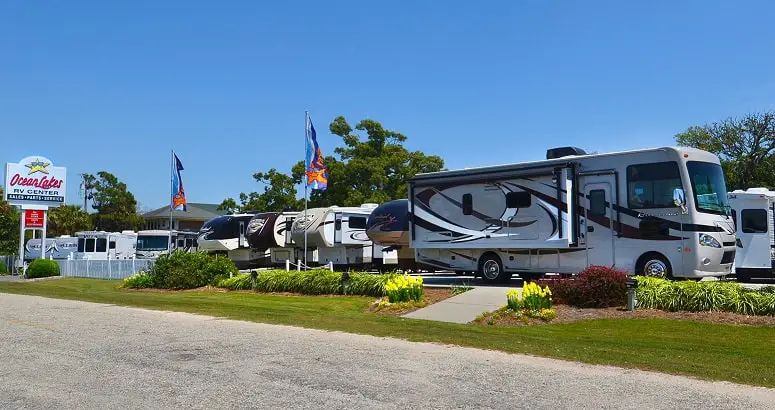
You’re thinking about purchasing an RV or trailer for a reason.
It’s important to know exactly what you want from your new purchase in advance. “ I want to go camping ” is not enough to drive your purchase.
There are other expectations you need to identify in order to make the best choice.
Your Family Or Traveling Companions
You should know in advance who you will be traveling with most of the time. Different types of RVs and trailers have varying capacities.
A vintage teardrop trailer might look cool, but will it sleep your family ?
Trailers and RVs can sleep anywhere from one to ten people, depending on the type.
Winter Trips
Certain types of trailers are not well insulated.
Insulating is a serious DIY project so be careful with it.
If you plan to be taking the bulk of your trips in the winter, consider RVs or trailers with arctic packages .
These are models that are designed to withstand freezing temperatures.
If you choose a standard model, you will likely have to upgrade it with an arctic package for winter travel or do insulation yourself .
Destinations
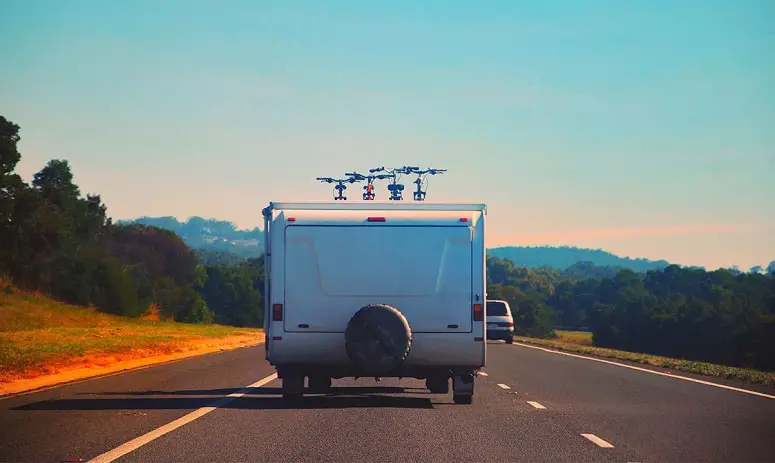
Where do you picture yourself taking your RV or trailer?
Camper trailers and pop-up tent trailers are best for boondocking (parking anywhere, not necessarily in campgrounds).
You can even find models with the ability to go off-road for a true wilderness experience.
Larger trailers and motorhomes cannot be taken off-road. Some national parks and campsites have size limitations for RVs and trailers.
Check out your desired destinations beforehand, to find out if there are any restrictions.
2. Consider Your Vehicle And License
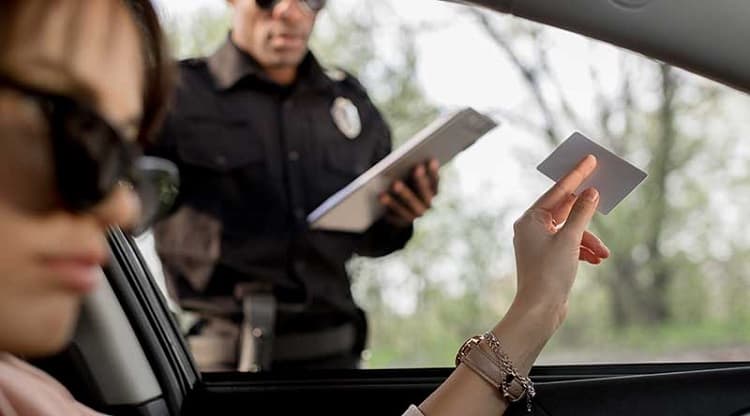
If you’re going to buy a trailer, consider your towing vehicle.
It may sound obvious, but you want to be sure your car or truck is up to the job of hauling your new home.
You should also know if you’ll need to obtain an appropriate license .
Your Vehicle
A car will not have the same towing abilities as a truck. If you’re unwilling or unable to upgrade your car, keep this in mind.
Lightweight pop-up tent trailers are compatible with nearly any vehicle, as are family campers and some models of travel trailer.
Always check your vehicle’s individual towing capacity and adhere to it. Otherwise, you may damage your trailer, RV or vehicle, and you could cause a serious accident.
Your License
Regulations for driver’s licenses vary, depending on the state. You may need an endorsement or a new class of license.
The majority of people have a non-commercial driver’s license.
A standard class C license in many states lets you to tow or drive a vehicle weighing up to 26,000 pounds.
Most RVs and trailers fall under this weight.
If the weight of your desired trailer or RV is more than this, you may need a class B license.
In some states you will have to upgrade from a non-commercial to a commercial license.
It’s important to check this information with your local Department of Motor Vehicles (DMV). Make sure you have all the legalities in place before you make a purchase.
3. Determine A Budget

Figuring out a budget for an RV or trailer is not as simple as you might think.
There are different costs associated with RV or trailer ownership. These range from one-time-only payments, to ongoing expenses.
Upfront Costs
The price of the trailer or RV is included in upfront costs. This is likely the number you are thinking of when planning out your budget.
Trailers are almost always going to be a cheaper alternative to motorhomes. A standard motorhome will cost a minimum of 40,000 dollars, when new.
Now, this is not to say that all trailers are cheap. Some models of fifth-wheel and travel trailer can also be extremely pricey.
Still, you will have more budget-friendly options with the smaller trailers (e.g. pop-up or camper).
Insurance is another upfront cost you have to factor in.
As a rule, the larger your RV or trailer is, the more expensive the insurance will be.
Ongoing Costs
Buying your RV or trailer is not the end of your expenditures—far from it. Whatever model you buy, there are basic long-term costs of ownership.
Storage is one: large trailers or motorhomes will almost certainly be too big to keep in your garage. Contact companies offering storage facilities, and compare prices.
Maintenance is another expense.
Just like your vehicle, RVs and trailers require regular servicing and maintenance.
You will probably have to buy gear, or other items for your RV or trailer, e.g. space saving appliances. The cost of these can add up to more than you might think.
4. Buying An RV Or Trailer Secondhand
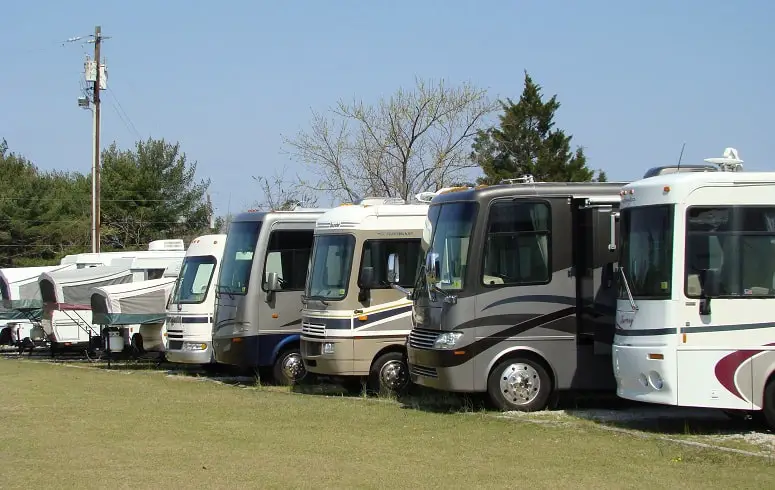
The main benefit of buying a new RV or trailer is a quality guarantee.
The dealership or manufacturer is there for support if needed. A new RV or trailer is under warranty for at least one year or more after purchase.
If any issues crop up, the manufacturer or dealer is obliged to fix it for you.
That said, every potential RV or trailer owner has a different set of goals. There is nothing wrong with buying a secondhand RV or trailer, as long as you know what to look for.
First and foremost, never take the seller at his or her word. This applies whether you are buying from a private individual or a dealership. It’s up to you to verify the seller’s claims.
This means you should be aware of how to check for minor and major damage .
There will be different parts to examine, depending on the trailer or RV type. For example, the engines in motorhomes or the material of pop-up tent trailers.
Regardless of the model, you must be thorough. You need to see the condition of pipes, generators, water tanks, etc. If there are any moving parts, don’t hesitate to try them out.
Set up and pack away pop-up campers or tent trailers to check for broken mechanisms or damaged fabric.
Take the RV or trailer out for a spin to make sure the brakes (and throttle, if applicable) are in working order.
Watch this video for advice on how to check a secondhand RV.
You need to know where you will store your RV or trailer before you bring it home.
Even if it will fit in your driveway, your Homeowners Association (HOA) might prohibit this in the long term.
If you’re getting a pop-up tent trailer, you may be able to fit it in your garage. Just to be safe, take all the measurements beforehand.
Motorhomes and large trailers are a different story. Even if you can leave them sitting outside of your home, this might not be the best solution.
You have to protect your investment against the elements , or potential vandalism.
Do you want to spend hundreds or thousands of dollars repairing damage ?
There are three different ways storage facilities can keep your RV or trailer: outdoors, covered, or indoors.
The size of your RV and the type of storage option you choose will factor into the price .
Covered storage means that the RV or trailer will still be outdoors but sheltered. This type of facility may not wholly protect against severe weather, such as hail.
Indoor storage, while offering the best protection for your RV, is going to cost you more than storing it outside.
Specific RVs and trailers have different needs. For example, pop-up trailers that have canvas must be kept dry in storage. If you leave these trailers out in the rain, they can end up covered in mold and mildew.
6. Setting Up Camp: Know What To Expect
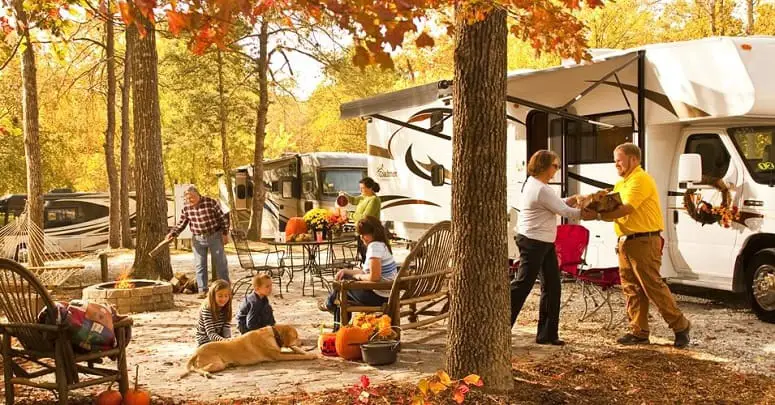
Setting up camp can take anywhere from 30 minutes to over an hour, depending on the RV or trailer.
If something seems like it will be a nuisance before you commit, reconsider your desired model.
These annoyances won’t go away after you make your purchase.
Motorhomes have to be parked and connected to electricity. Sewer hoses and water pipes must be set up. Trailers must be unhitched and stabilized.
If you have a pop-up camper or tent trailer, prepare to put in some effort. The folding sides or external panels need to be extended. This might involve using a hand crank or manually placing poles and canvas—or both.
Remember that everything you do to set up camp has to be reversed when you leave. Everything has to be re-hitched, unplugged, and folded away.
Pop-up tent trailers cannot be folded away dirty or wet. You have to factor in wiping down your entire trailer before packing it up .
Check out how to set up a motorhome at a campsite in the video below:
7. Adapting To Handling An RV Or Trailer
Before you get engrossed in the idea of an RV or trailer, be prepared to know how to drive it.
It takes time to adapt, whether you’ll be towing a trailer or driving a motorhome.
Towing A Trailer
Learning to tow a trailer takes patience and practice.
You are already familiar with your car or truck. You just have to get used to the extra load.
You will have to relearn how to brake, accelerate and turn . The same goes for reversing and parking.
It might be best to invest in extra mirrors for your vehicle, especially when towing large trailers. Not only are they safer, but they can help you get used to your trailer dimensions.
You must also be attentive to the weather while you’re on the road.
Powerful winds can tip your trailer over.
Driving A Motorhome
Unless you have driven buses or trucks before, driving a motorhome for the first time can be intimidating.
Unlike towing a trailer, you have to get used to a whole new vehicle. If you are transitioning from a car, there is a lot to adjust to.
Motorhomes are high, wide, and heavy .
This means that you need to avoid abrupt maneuvers at all costs, to avoid skidding or crashing.
With practice, most drivers will grow comfortable handling their motorhomes. If you are a nervous driver or unsure of your ability, don’t immediately dismiss a motorhome. You can rent one and see how it suits you.
8. Do Your Research

Once you have a good idea of what to look for, start researching.
You need to know all the options within your price range, requirements, and preferences.
You can begin by searching general terms .
For example, “best camper trailers with arctic packages.” Or “RVs for families under 50,000 dollars.”
Once you have a few models in mind, investigate each one. Visit the manufacturer’s website for all the specifics (e.g. dimensions, materials, etc).
Read reviews on forums and social media platforms, by former and current owners.
If you are buying a new trailer or RV, choose a reputable manufacturer or dealership. Lots of positive reviews from satisfied customers on different sites and platforms are a good indication.
If you’ve found a secondhand RV or trailer you love, learn all there is to know about it. You need to know the specific model like the back of your hand before you view it.
Discover what types of damage the model is prone to, e.g. water damage. A private seller does not have the same obligation to you as a dealership or manufacturer.
It’s up to you to serve as your own quality control expert.
9. Take Your Time Inspecting
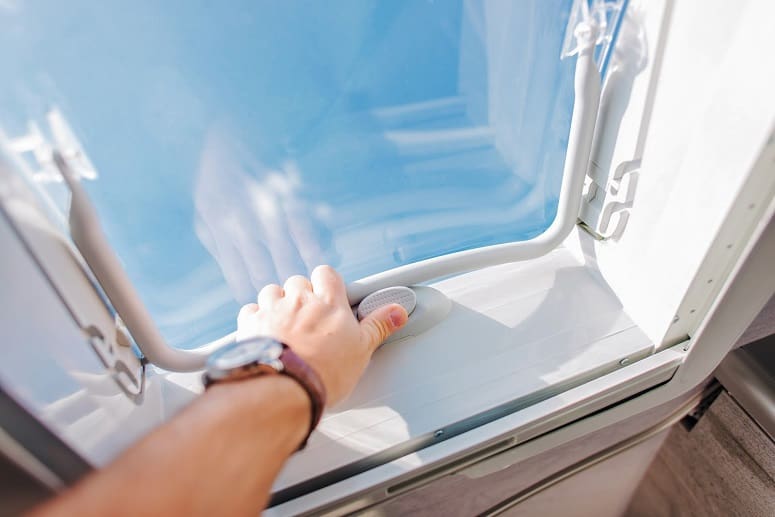
Reading about your dream RV or trailer is very different from seeing it in real life.
No matter how excited you are, don’t rush through an inspection. For those of you buying secondhand, take things even more slowly.
An RV or trailer might be perfect on paper, but still not be right for you. You may find that the bathroom is much smaller than you would have liked.
Or maybe the layout is not as appealing as you expected.
There are certain things that have to be experienced first hand. You need to explore and handle your potential trailer or RV before you buy it.
Sit down in the chairs and, if possible, lie down on the beds. If there is a bathroom, enter it to get a feel for space.
Stand in the kitchen and imagine yourself cooking meals there on a trip.
Before you buy it, ask to take the model out for a test drive or tow. Evaluate the inside and outside of the RV carefully.
You don’t want to find faulty wiring or a cracked waste tank after the sale is complete.
Turn all the utilities on and off—flush the toilet , run water, turn on the furnace.
Test all parts of the RV or trailer that slide or extend out. Save yourself the headache of discovering a stuck mechanism after you’ve completed the purchase.
Watch this video about what to look for before you buy a new RV:
10. Understand What You Are Paying For
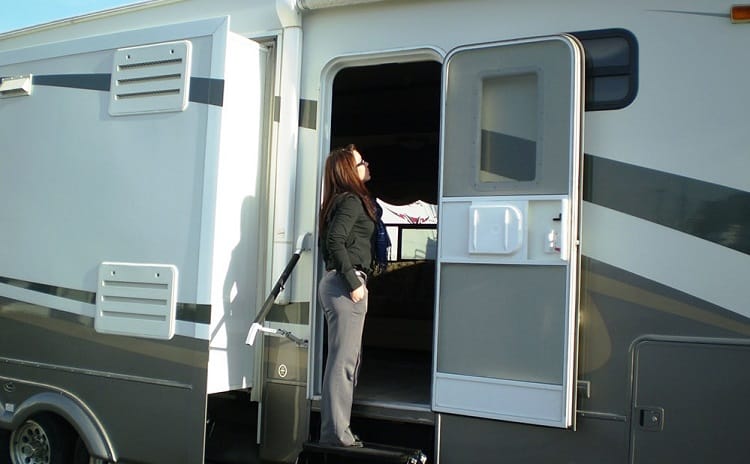
If you are buying your RV or trailer new, be sure you are getting the best deal.
It’s good to know exactly what you’ll be getting in exchange for your money.
Be clear on what is included and available upgrades for the model you have chosen.
Modifying your vehicle later—for example, replacing single-pane windows with double-pane glass—can be more expensive than paying for the upgrades.
You also need to know what accessories you will have to buy separately. These might include hitches for towable trailers, or electric brakes.
Some manufacturers and dealerships offer walkthroughs of your new RV or trailer. If you are a novice, you should take advantage of this option.
This will also give you an opportunity to confirm that everything works as it should before you take it home.
I hope this guide helped you understand some things you should know before putting money down.
Buying the wrong RV or trailer can make you question the whole lifestyle , which would be a pity.
Conversely, the right RV or trailer will be a pleasure to own. It will become the starting point to all the great moments you will have on your adventures.
Did you just buy an RV or trailer?
Share your experiences in the comments. We would love to hear advice from experts too.If this guide was useful, share it with others who are considering RV or trailer ownership for the first time.
Related Posts
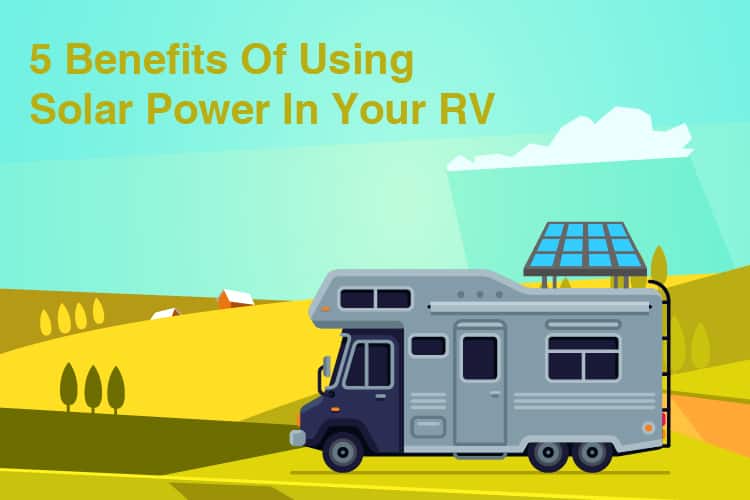
5 Benefits Of Using Solar Power In Your RV
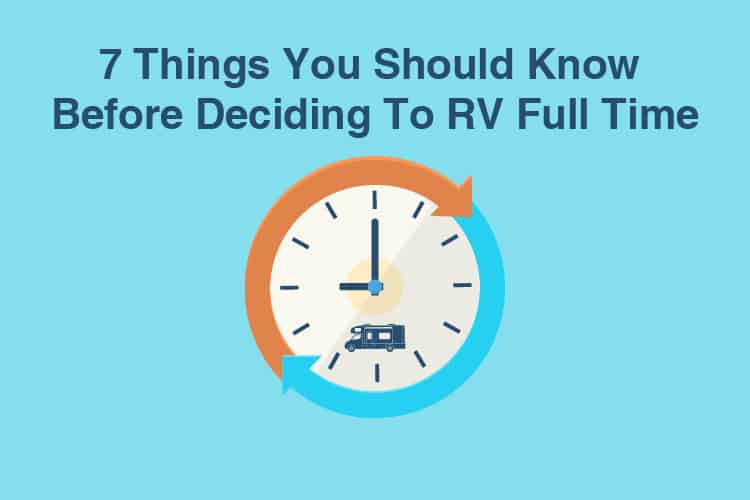
7 Things You Should Know Before Deciding To RV Full Time
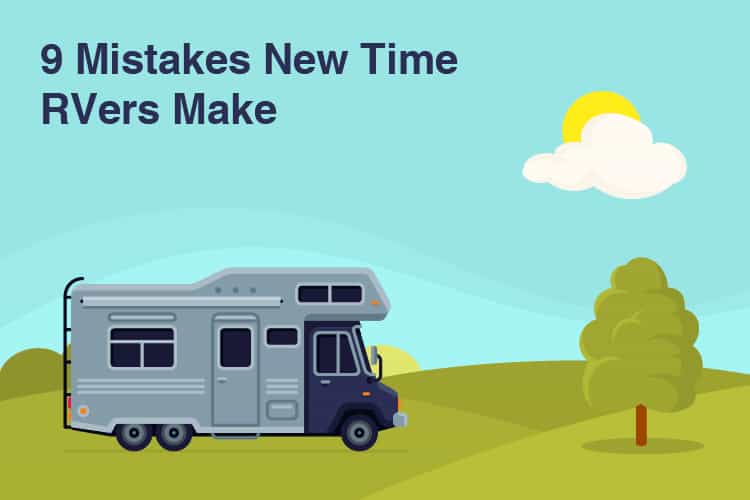
9 Mistakes New Time RVers Make
2 thoughts on “buying guide for a first time rv or travel trailer purchase”.
I’m glad you talked about getting bigger mirrors when you’re towing a larger trailer. My uncle wants to buy a new tandem axle enclosed trailer to carry around some of his snowmobiles. Thanks for the tips and I’ll have to remember to tell him some of these as he continues to shop around for one.
We are considering an RV for us to travel in, however we’re unsure of the type. 5th wheel or Class A. Both have advantages and your article helped in our understanding of what we’re about to get in. You’ve given us information and ideas we hadn’t thought of. Thank You LA Eubanks.
Leave a Comment Cancel Reply
Your email address will not be published. Required fields are marked *


IMAGES
VIDEO
COMMENTS
First Time RV Buying Guide: Advice to Know Before you Buy an RV. January 25, 2022 July 26, 2022 Aubrey. Last Updated on July 26, 2022 by Christina. ... This type includes pop-up campers, teardrop trailers, travel trailers, fifth wheels, and toy haulers. Motorhomes are RVs with a cab and engine.
RV shopping 101: A simple, yet complete guide for first-time RV, camper, and travel trailer buyers Shopping RVs and travel trailers isn't easy.
Dealers can include fun extras. If you're buying a new RV, ask the dealer to throw in a few inexpensive (for them) extras that will make life easier for you and prevent annoying repairs down the line. You can also prevent a secondary pitch from the dealer by requesting these add-ons first. Some things to request:
3. Watch for Extra Fees . Just like any other major purchase, hidden fees can catch you by surprise when buying an RV. Gretchen Holcombe, an RV travel blogger who's purchased three trailers, shares her varied experience: "Some dealers will quote a price that includes most everything (other than maybe taxes and title fees), while others will quote one price to get you interested and then ...
As first time RV owners, the decision tree that led us to choosing what kind of RV or trailer to get was complicated. Today our retirement home is 30' long (26' of living space). We created this Buyers Guide for RV newbies because we thought others might be interested in the questions we had, and how we answered them. Here goes.
Purchase Price. Price may be the one area where many first-time RV buyers can't compromise. You should ensure you know what you can afford and be confident in your ability to make payments. Factor in the ongoing ownership costs, including registration, any taxes or fees, repairs, gas, and more.
First time buyer here!! You article sure did help me out, thanks so much. I have settled upon a travel trailer and actually found the exact layout that suits me best. I am going to be fulltime, excited to live in cooler climates due to a disease that makes living in excessive heat, nearly unbearable. The unit I found is a "4 season" and was ...
Now, for the first time travel trailer tips and tricks: 1. Pack everything in totes. Put food, bedding, and camper parts in separate totes. Once you get to camp you can unpack all that needs to get put away. Then all the totes can go outside and be stored under the travel trailer.
A travel trailer will cause drag on your tow vehicle lowering its normal gas mileage, and also increase wear and tear. You may need to pay $50-$200 monthly for RV storage, around $120 a month for insurance, $50 average a night for campground fees, and $40-100 yearly for handy RV memberships like Good Sam.
We've created first-time RV checklist for you to read and use while packing up your RV for the first time. This list isn't exhaustive, but should provide you with the basic items, and a few extras, for your trip. RV Essentials. You'll need some essential, mechanical gear that will help you stay safe on the road. Depending on the type of ...
A Generator - A generator is an obvious item for this checklist, but you'll want to buy one that's high quality and will last. Check out the Champion Generator. 2 and 5/16″ Trailer Ball - Make sure to have the right size trailer ball installed on your vehicle to tow your trailer. 3/4 Drill Socket and Drill - Drills will allow you to ...
Mistake No. 2: Buying new. As with cars, RVs lose a considerable amount of value the second they're driven off the dealership lot. Letting the first owner take that big depreciation hit can save ...
Welcome back everyone! Today I have a list of 8 or 9 tips for first time RV buyers I've gathered over the years of my career. Hopefully this helps you avoid ...
There are three weights. The first is dry weight, which means how much the trailer weighs without any supplies or water. The second is the GVWR, or its weight once water and supplies are loaded. The third weight is called tongue weight. This refers to how much weight the trailer pushes onto the vehicle's hitch.
To help make your experience owning a travel trailer more enjoyable, here are some tips from RV Pros, Zack and Mary, as well as some of our own tried-and-true tips for new RVers. 1. Utilize Camping World as a Resource for Gaining RV Knowledge. The very first thing Zach and Mary mention as a resource for new RVers is Camping World.
These are the seven most important things you should know before buying your first RV. Know your vehicle. First things first, you should know your vehicle's towing capacity. If you aren't sure where to find this, check the sticker inside the driver's side door frame. After you find your vehicle's towing capacity, you will need to add ...
Basic RV Gear First Time RVers Actually Need. Wheel Chocks; Leveling Blocks; RV Water Hose; RV Sewer Hose; Surge Protector 30 Amp or 50 Amp (Depending on Your RV) 2. Travel Slower: Don't Try and Do it All in One Trip. Probably the biggest mistake most first-time RVers make is trying to cram too many destinations and activities into a single trip.
Travel Trailer "Must-Haves" for Easy Camping, All the Time. Recently I took my new Rockwood 2504s RV out for three days of camping. The taught me that investing in a few essential travel trailer necessities can make an RVing getaway so much better. If you are shopping for a new travel trailer, check out this list of essential RV gear for ...
The sleeping area features a convenient queen-sized bed, edged with two windows to let in cool breezes as you relax, and an above your head storage to keep your possessions. The Jayco Hummingbird is one of the best beginner travel trailers for campers who love hitting dirt roads. 6. Coachmen Apex Nano.
4. Look for Damage Before Buying (Mechanical) It's also important that all operational systems such as electrical, water, sewer, and mechanics are functional before buying your first travel trailer. 5. Choose a Travel Trailer Based on Your Lifestyle. Think about what you plan to use you travel trailer for.
Set up and pack away pop-up campers or tent trailers to check for broken mechanisms or damaged fabric. Take the RV or trailer out for a spin to make sure the brakes (and throttle, if applicable) are in working order. Watch this video for advice on how to check a secondhand RV. 5. Storage.
Buying Your First RV? Make Sure You Don't Waste Your Money With These Tips: https://gtwy.to/first-time-rv-buying-tips This Episode:When we were buying our f...
Before you pick up your trailer 1. Buy tow mirrors. Fun fact: Unless you're driving a massive tow vehicle that's wider than your trailer, it's likely that all of the mirrors on it will be largely useless while you're driving with a 16-foot plus box behind you.Thankfully, there are extendable mirrors that clip on to your tow vehicle's existing mirrors, like these ones, which allow ...